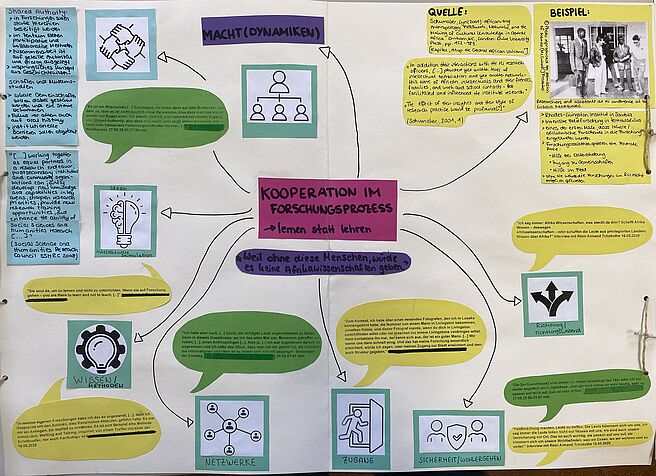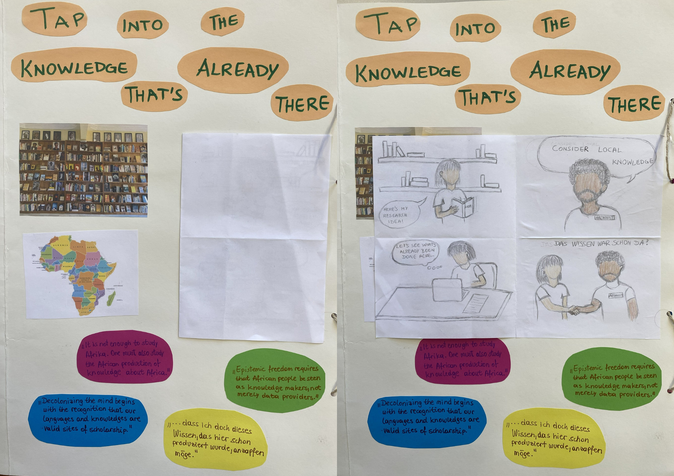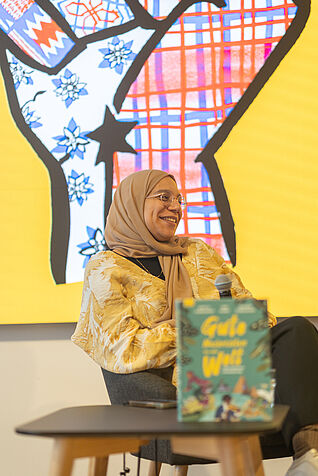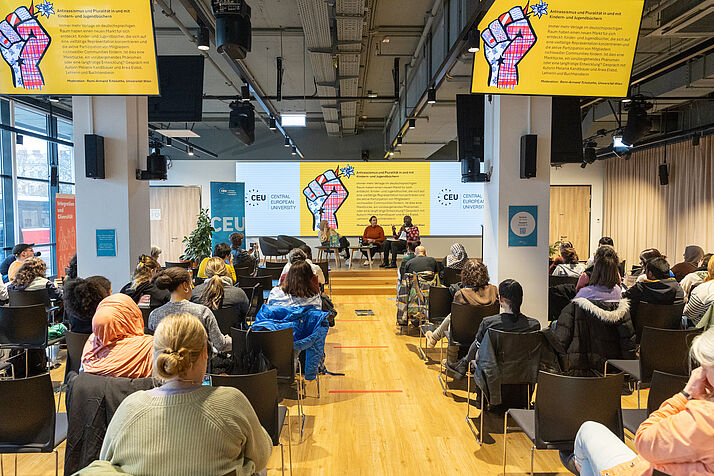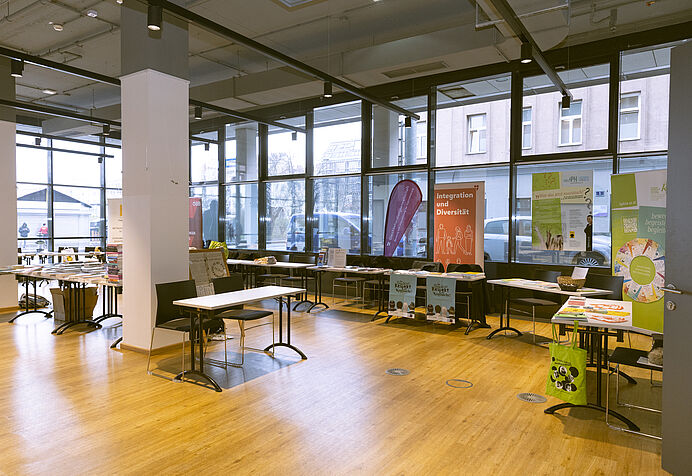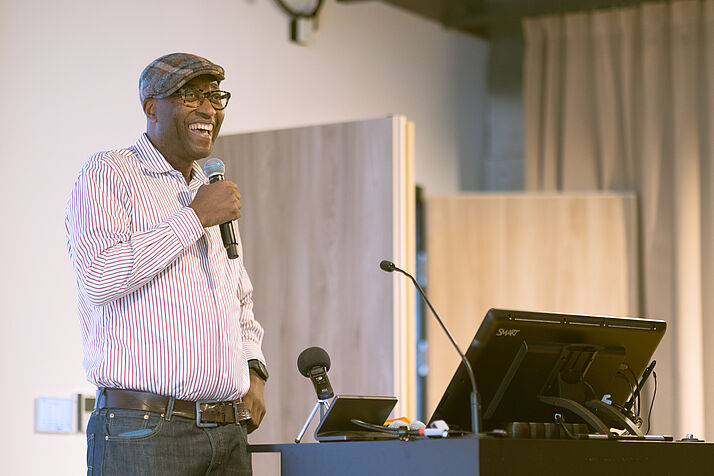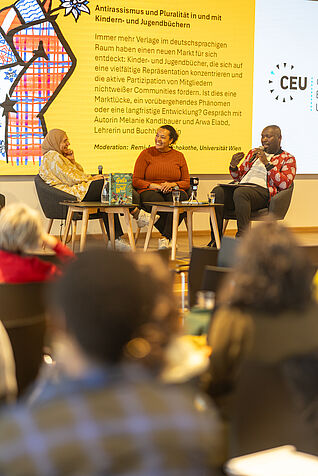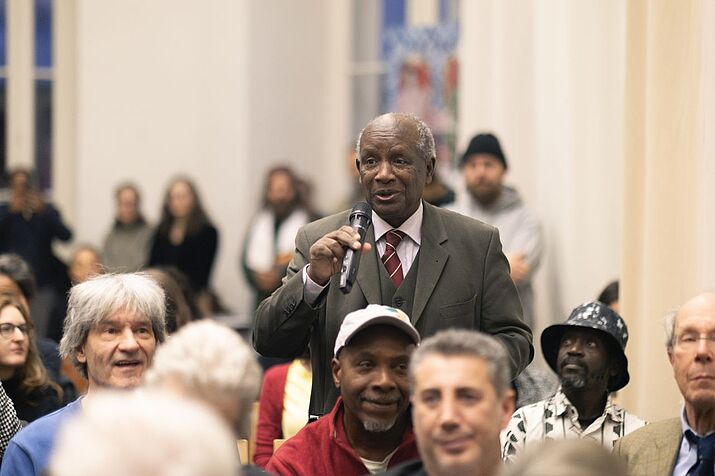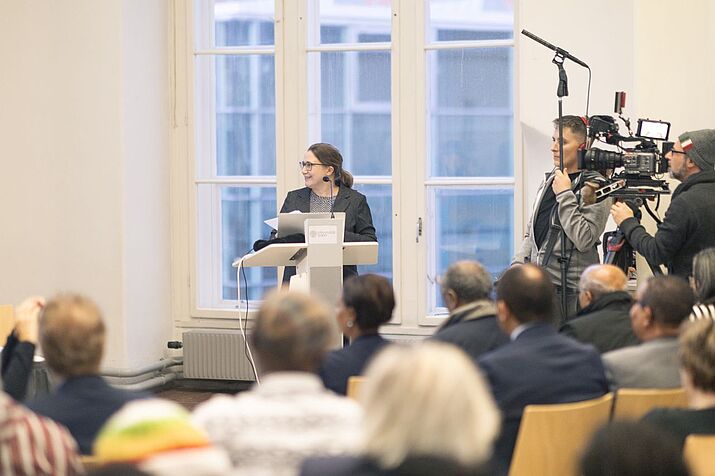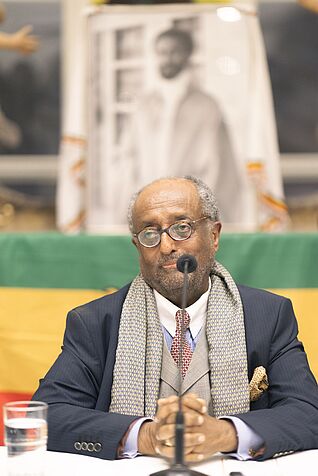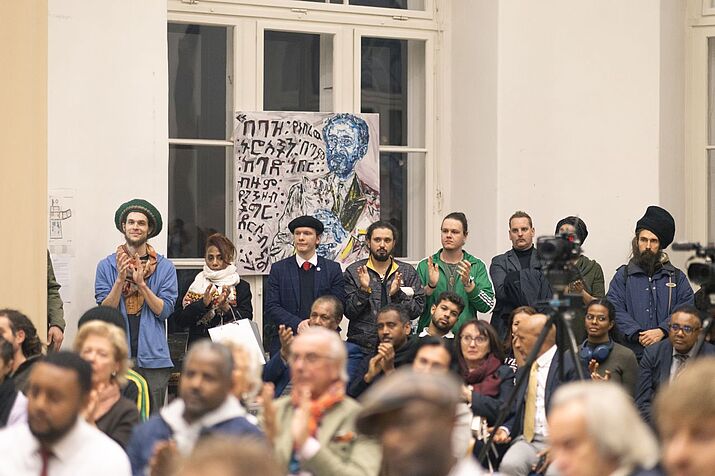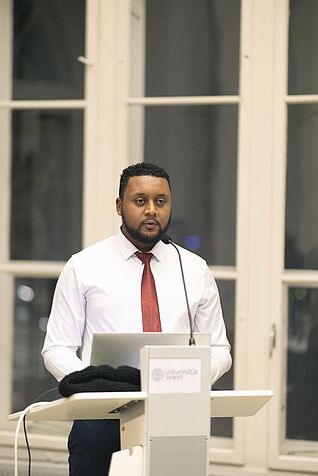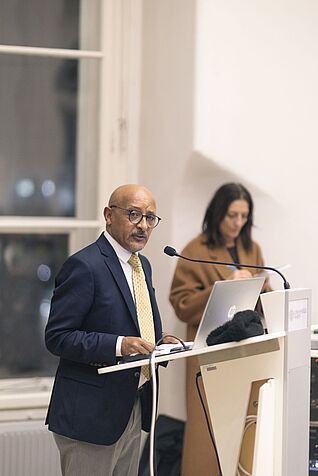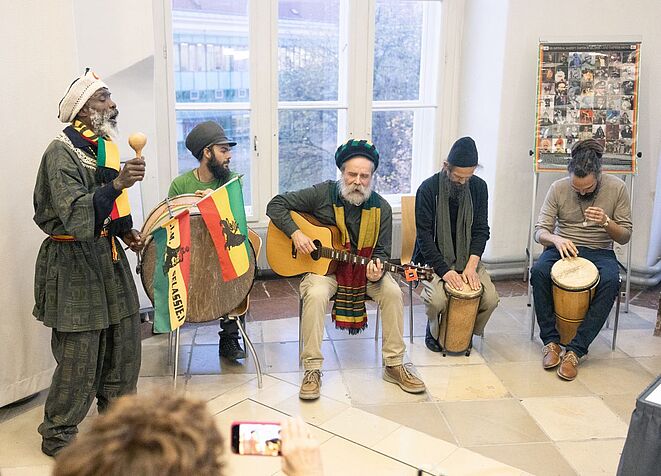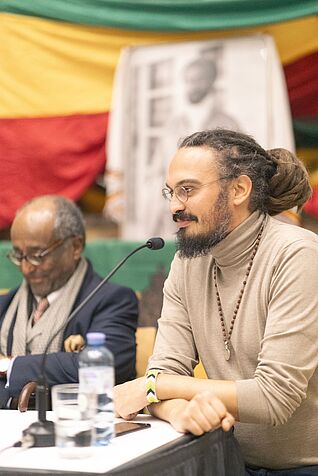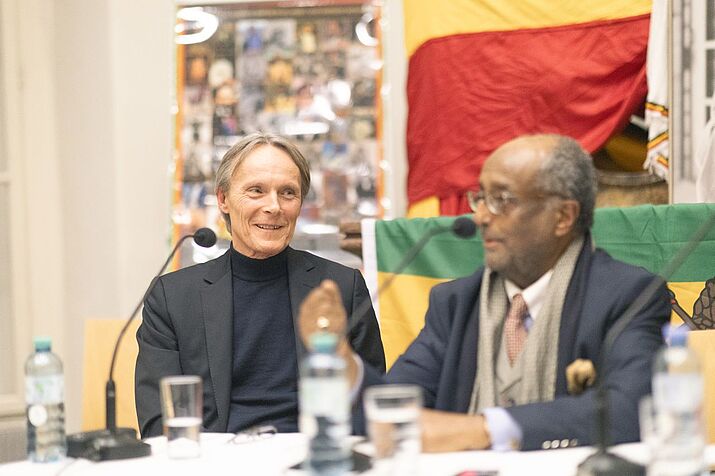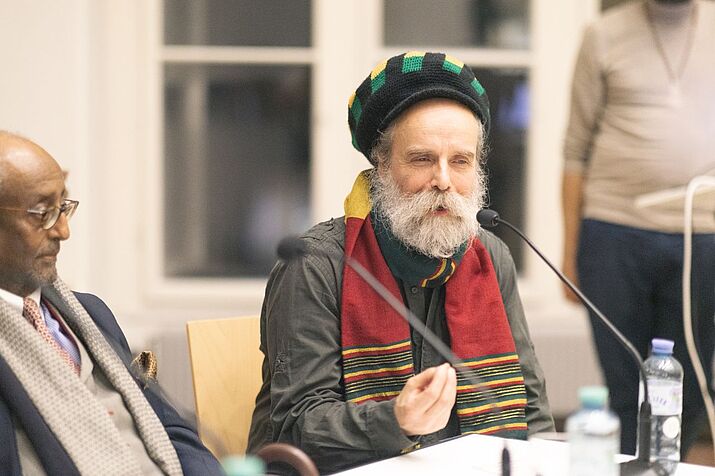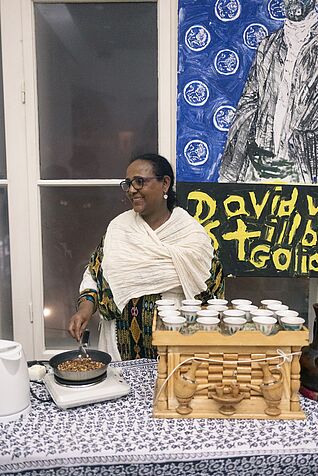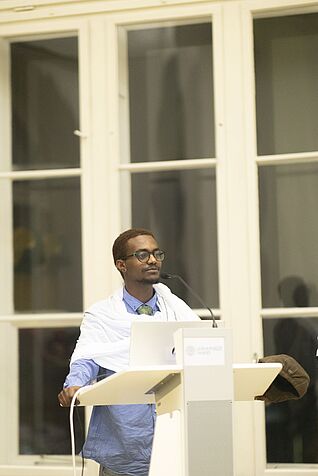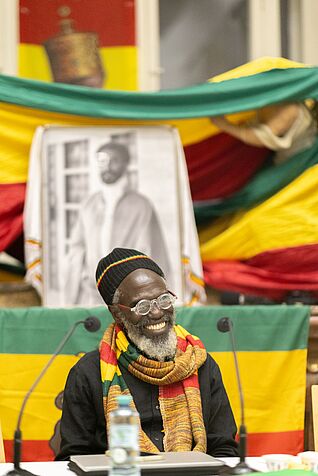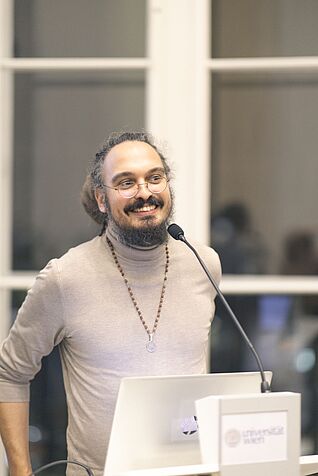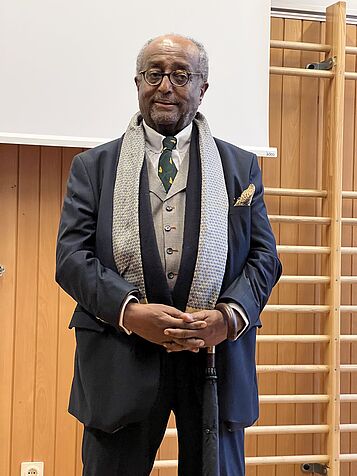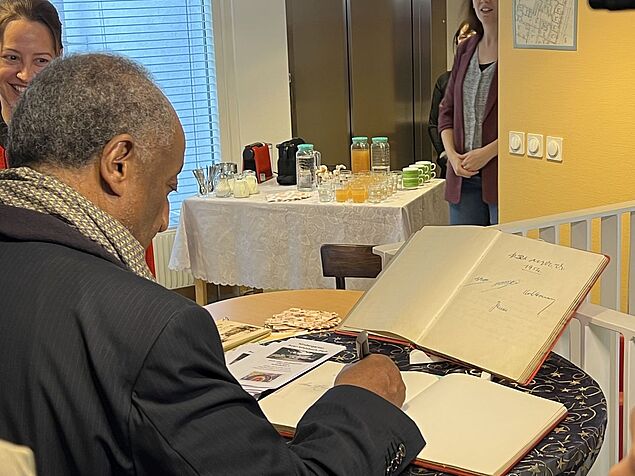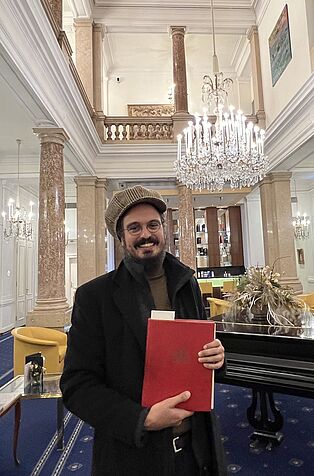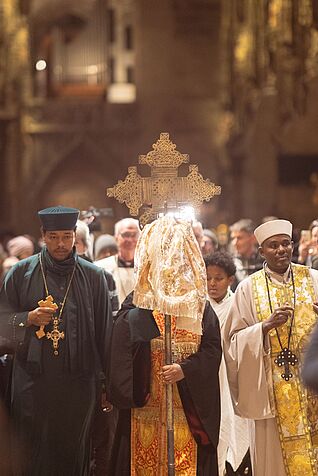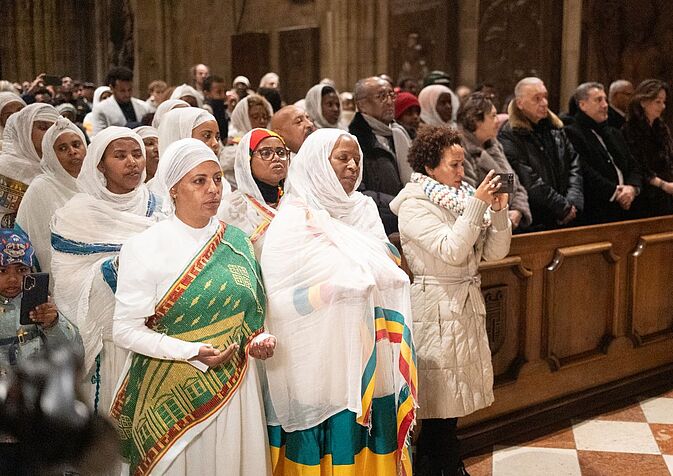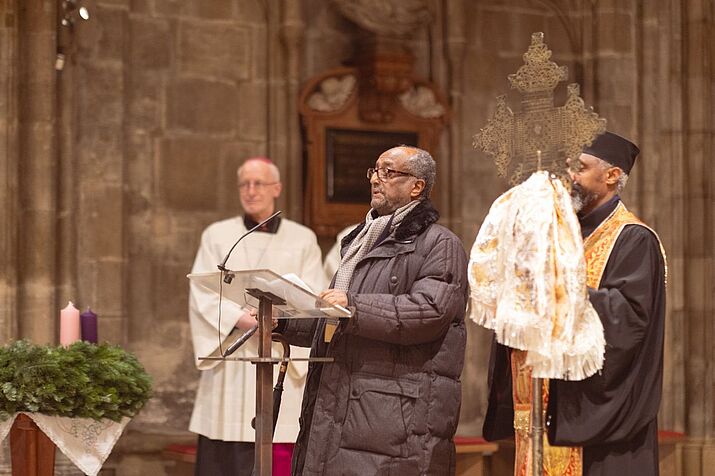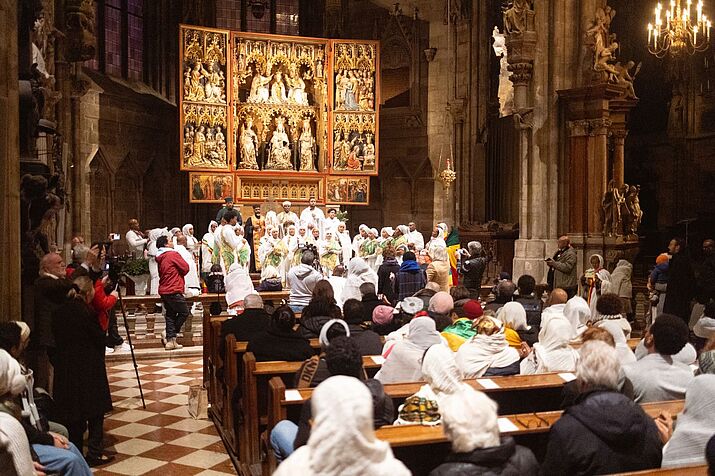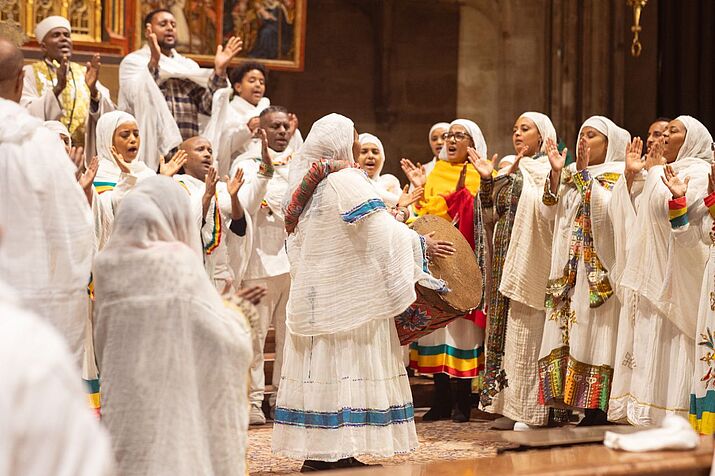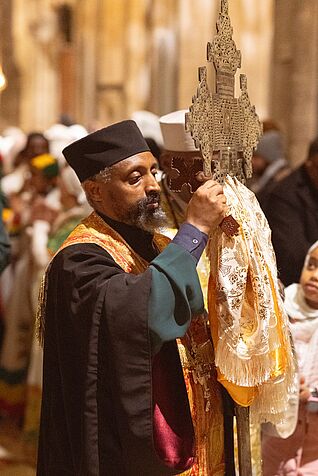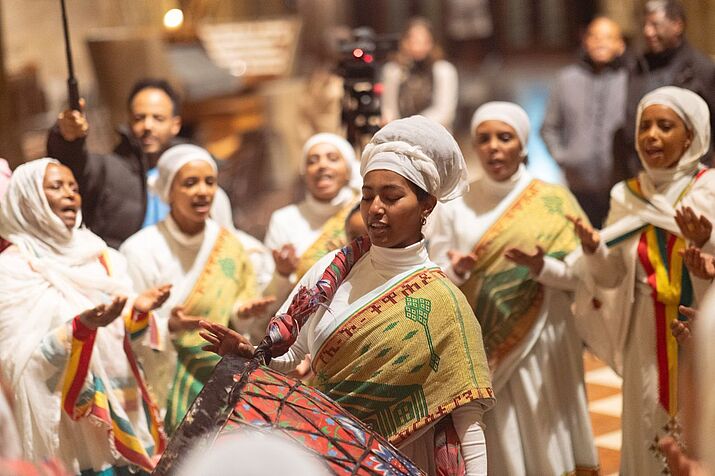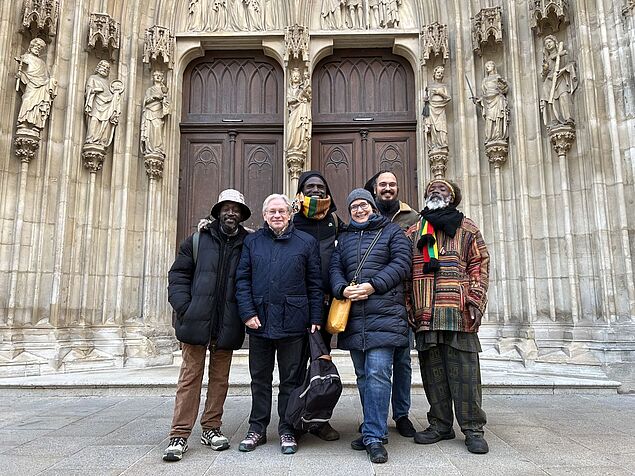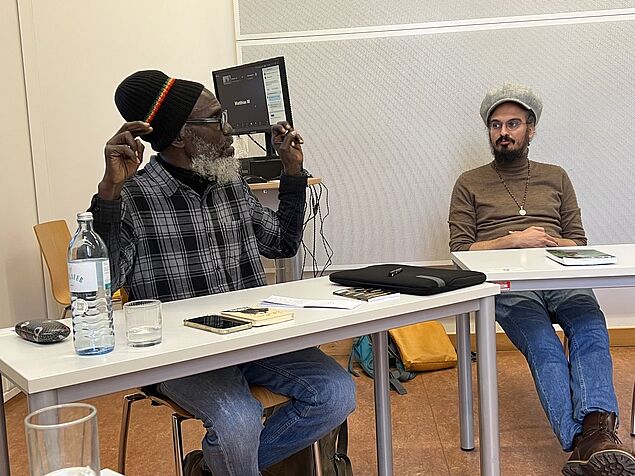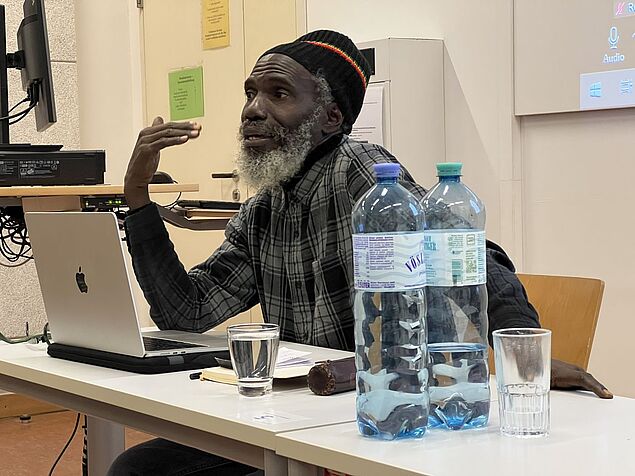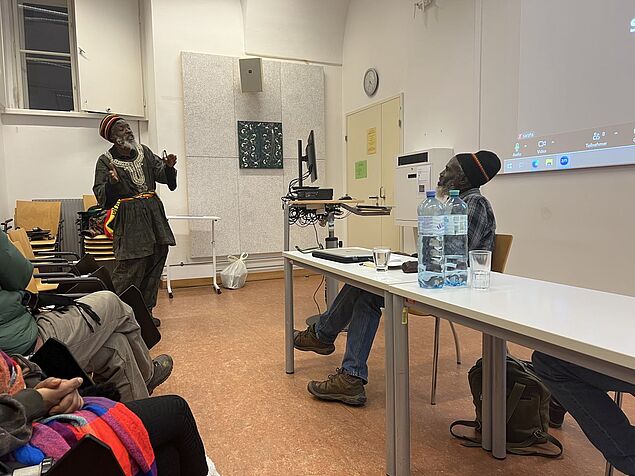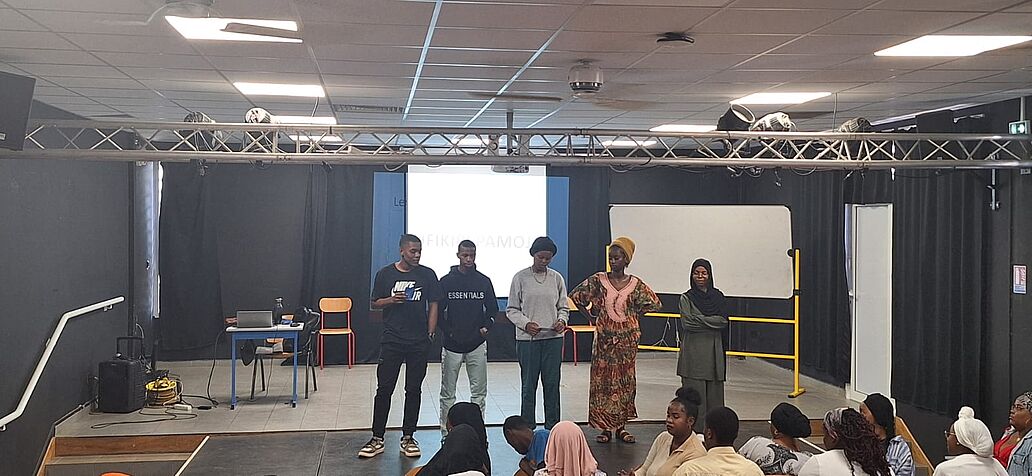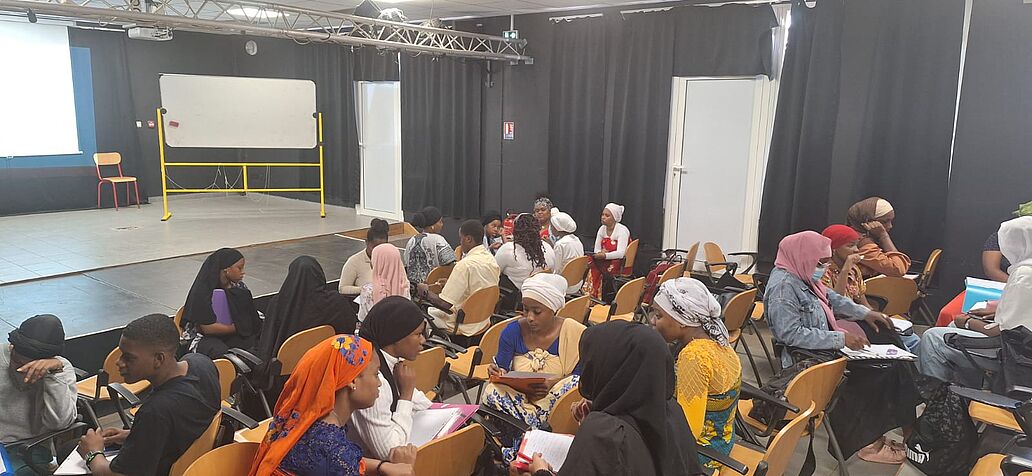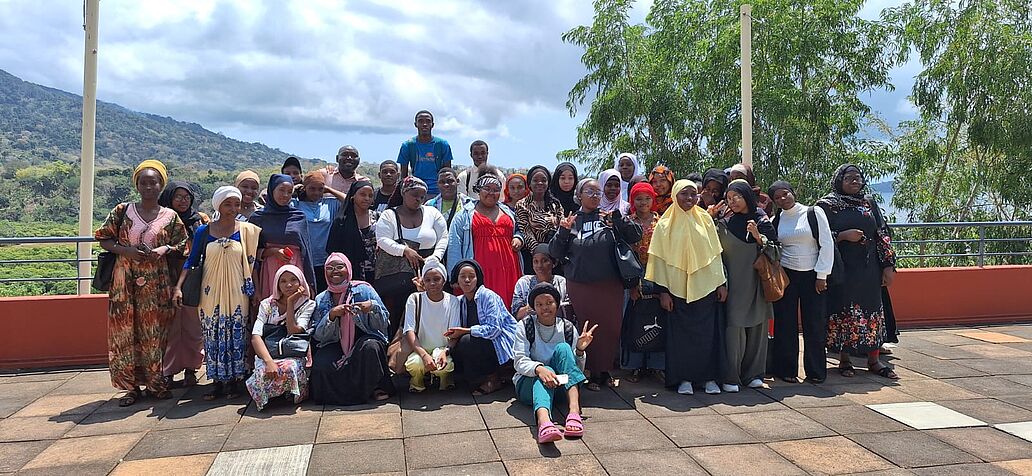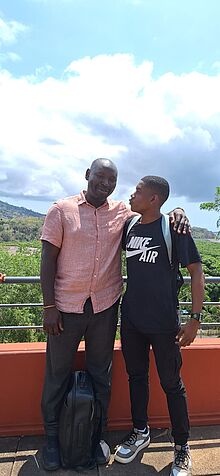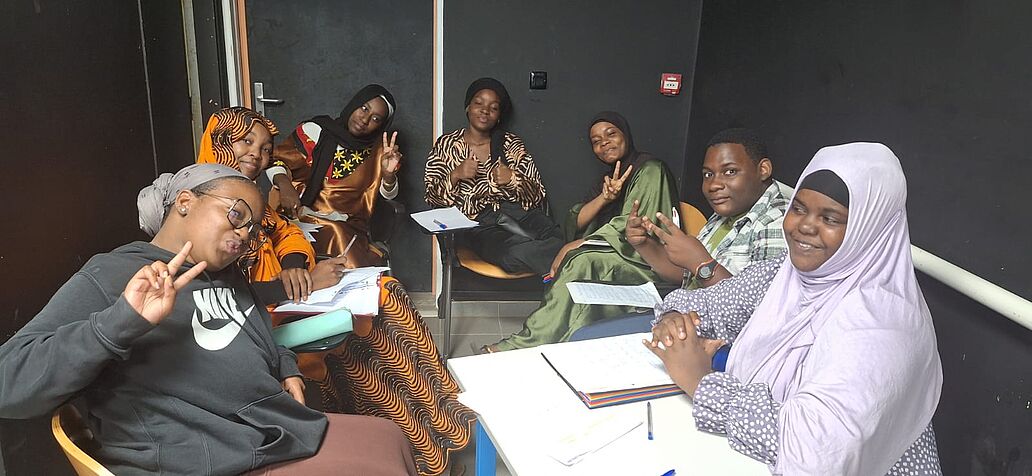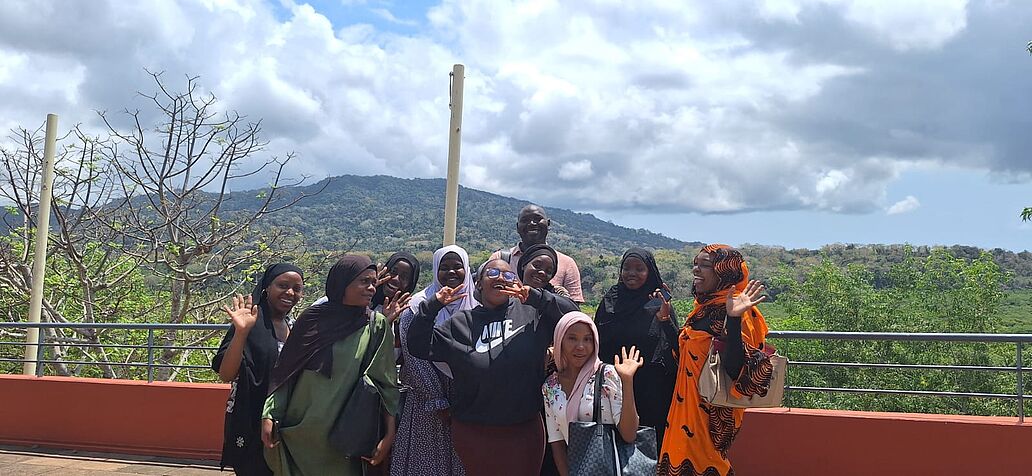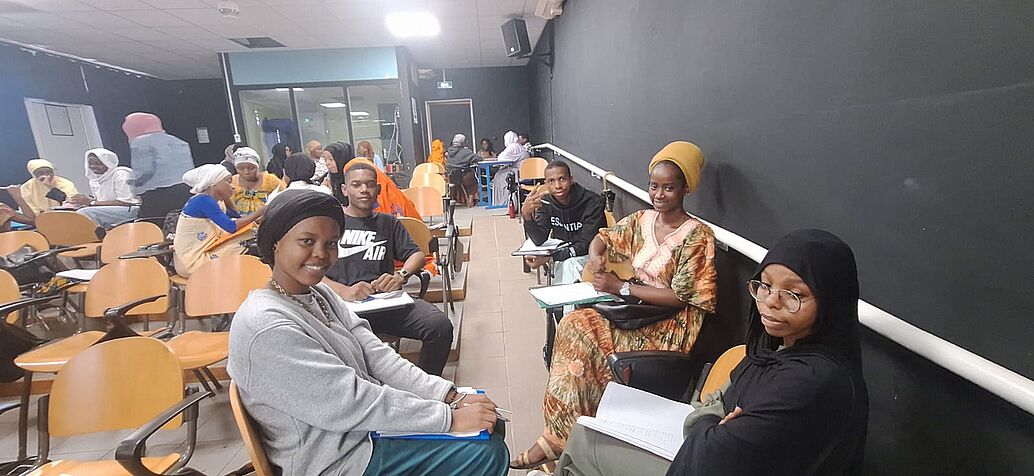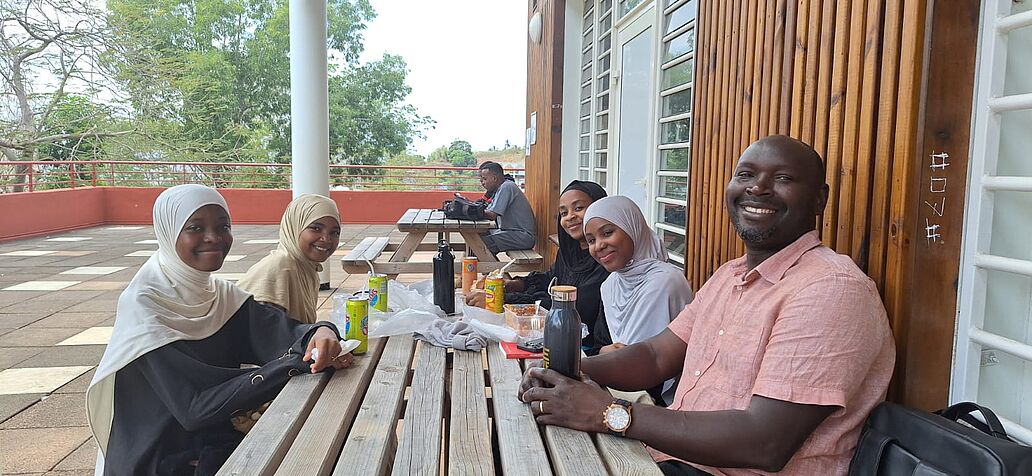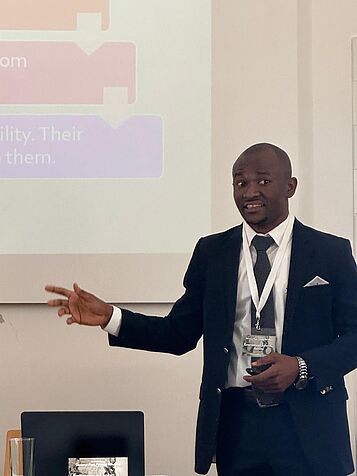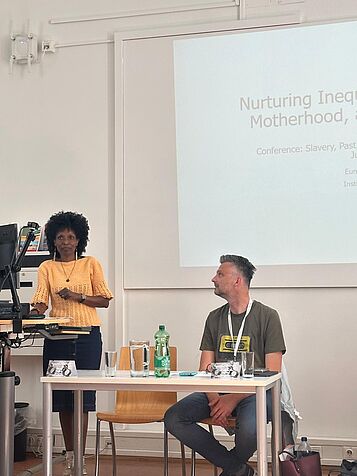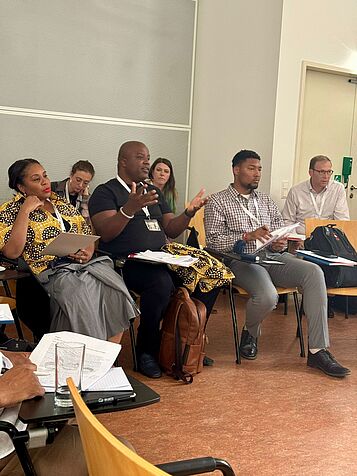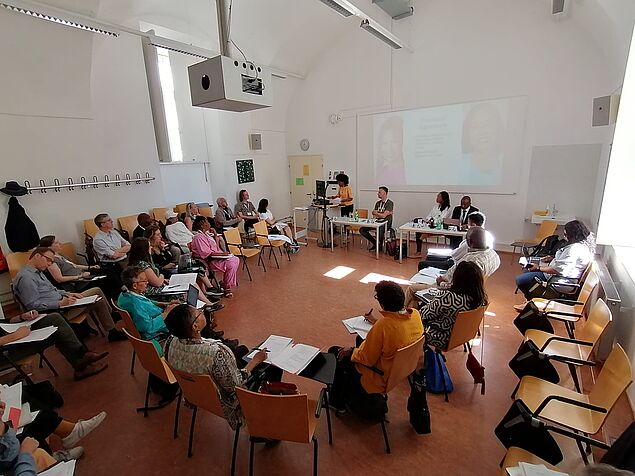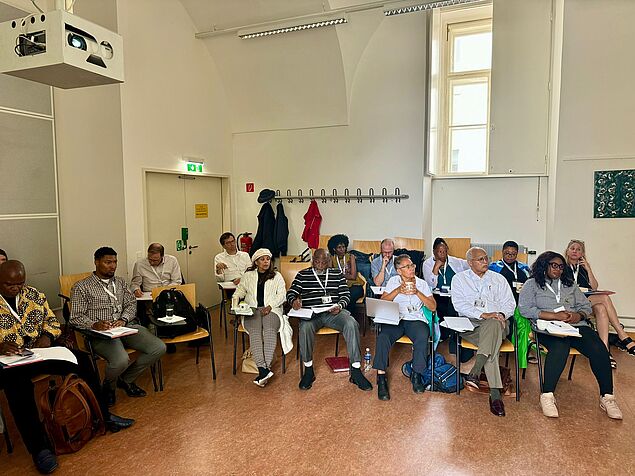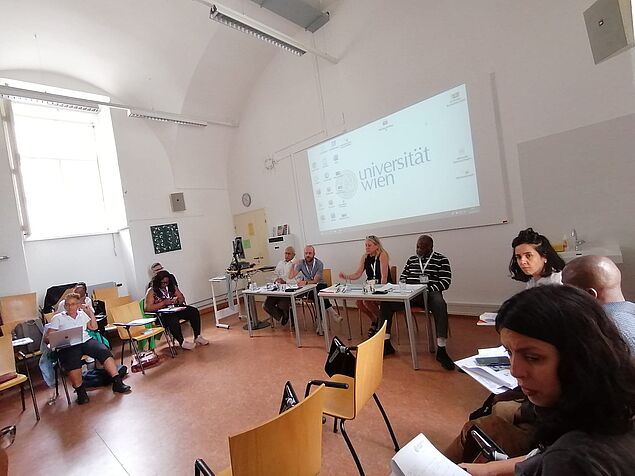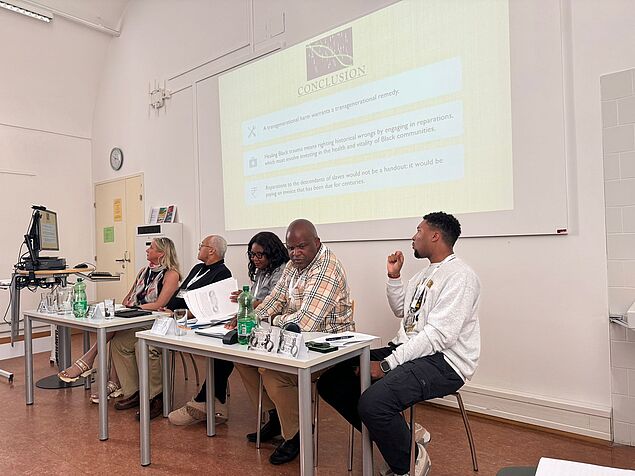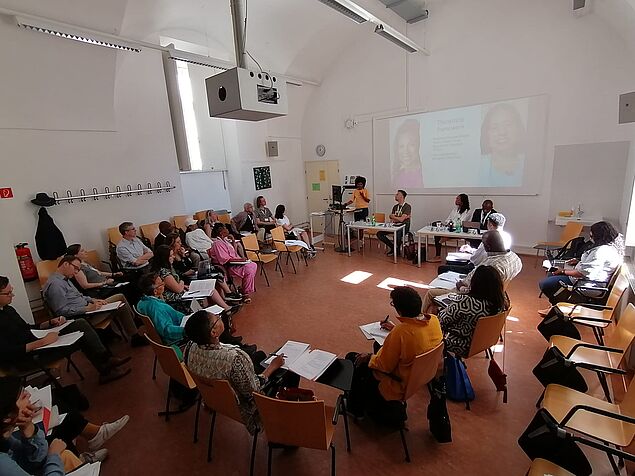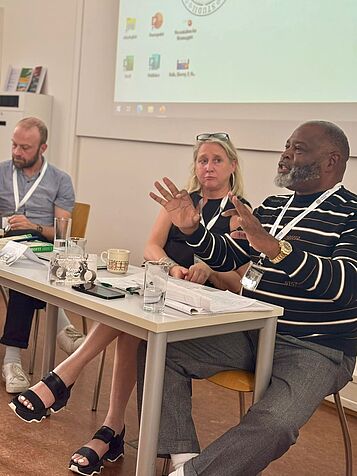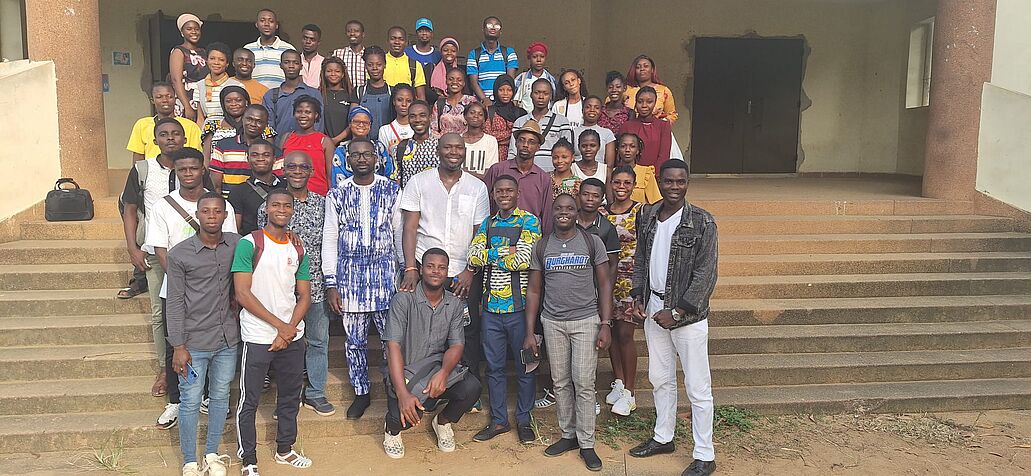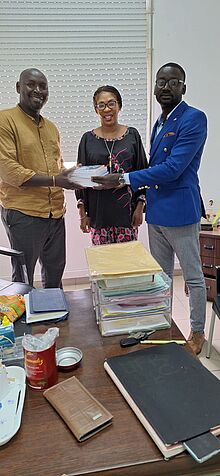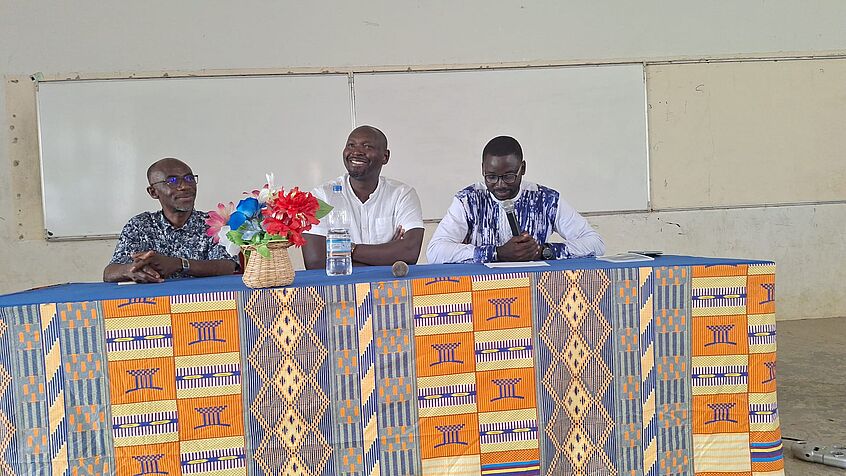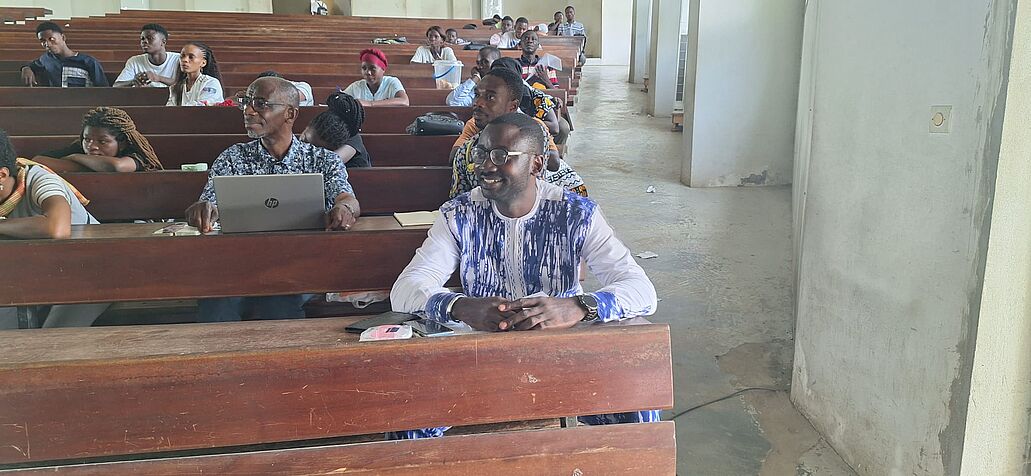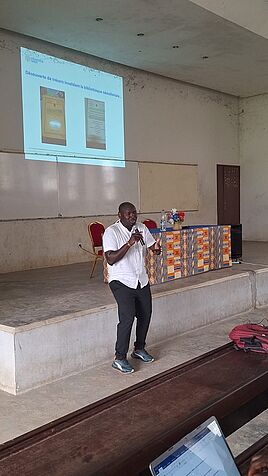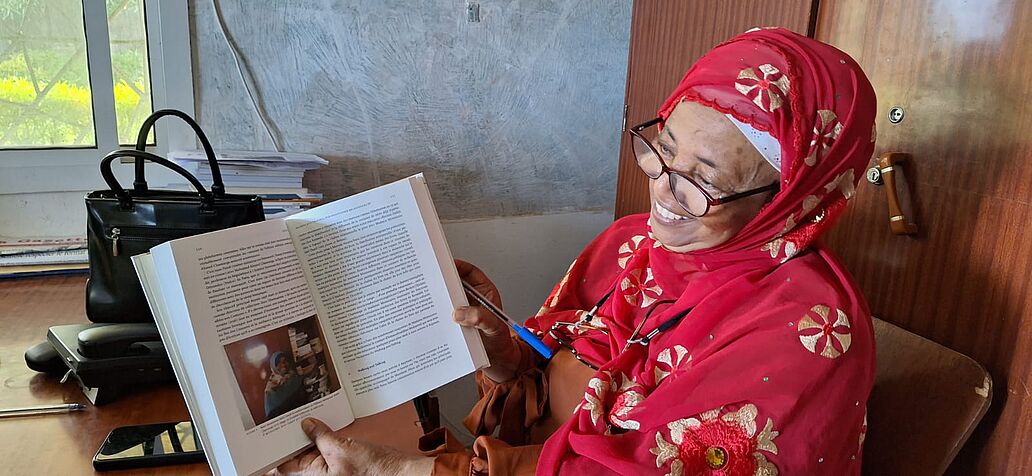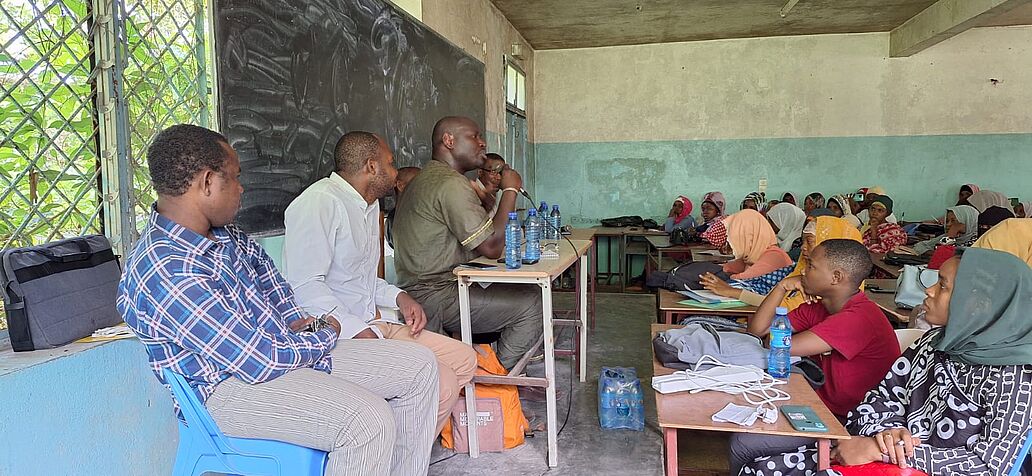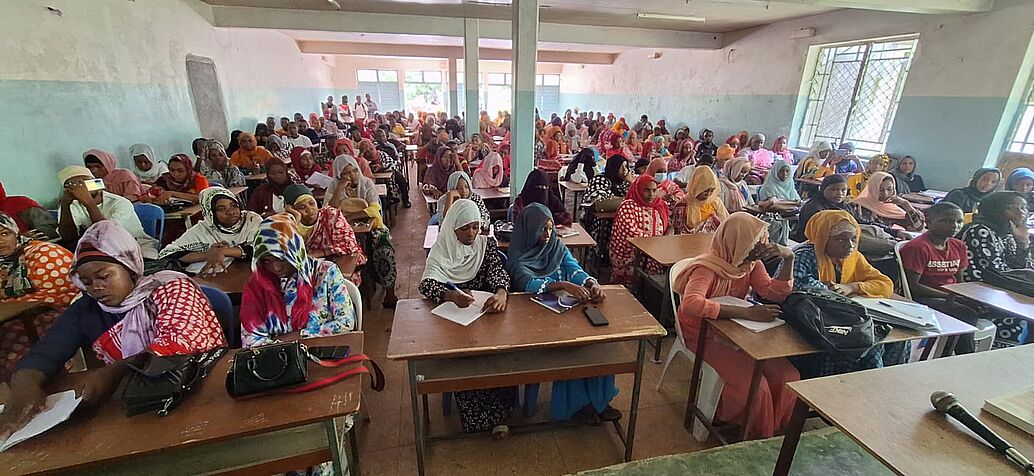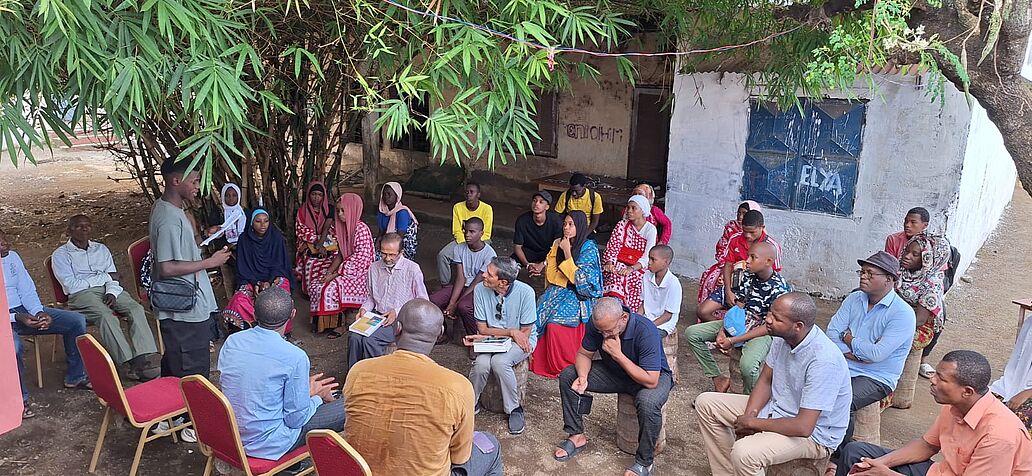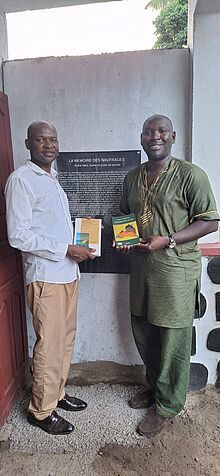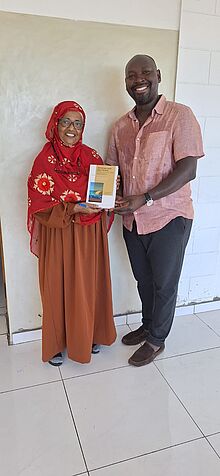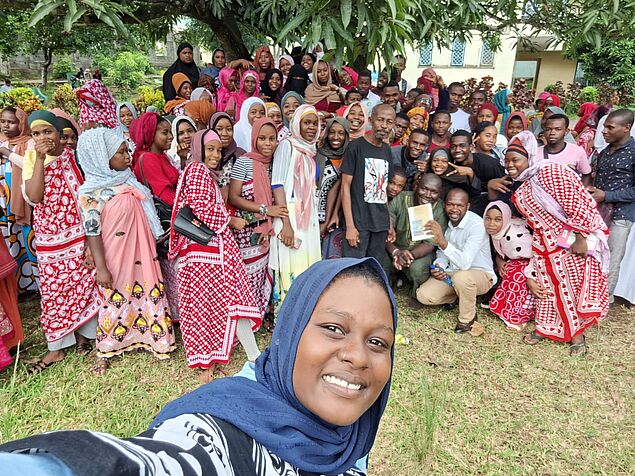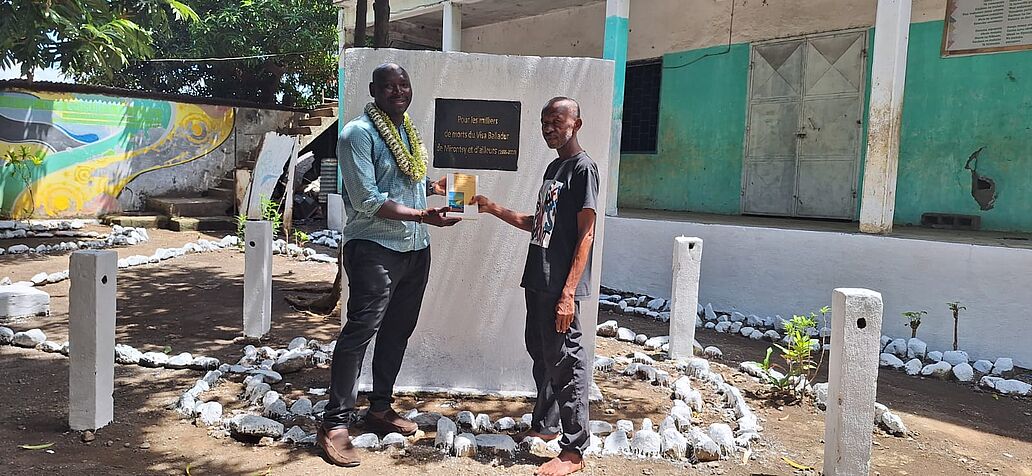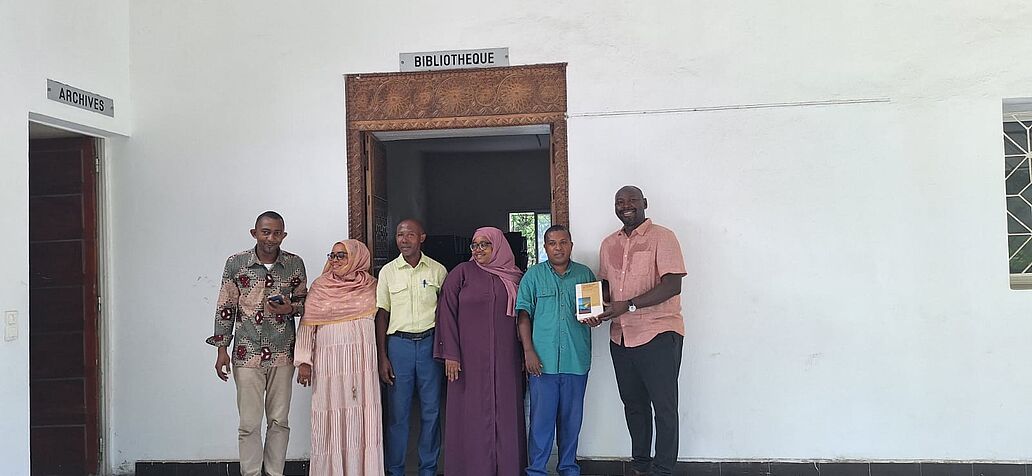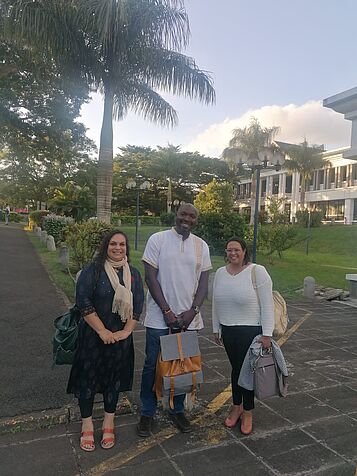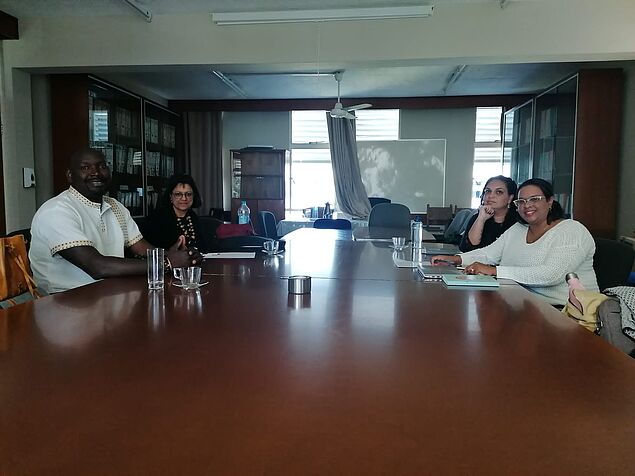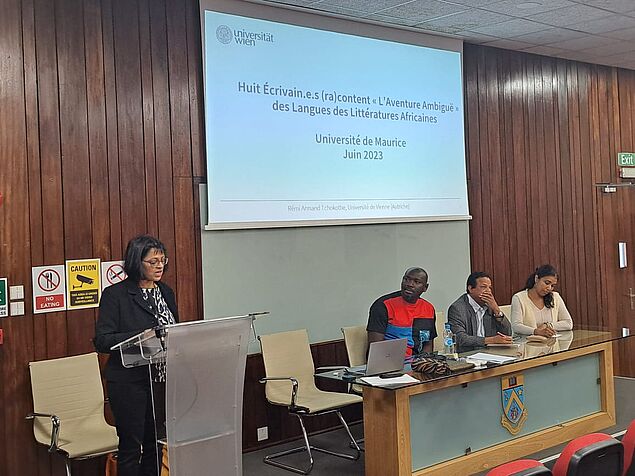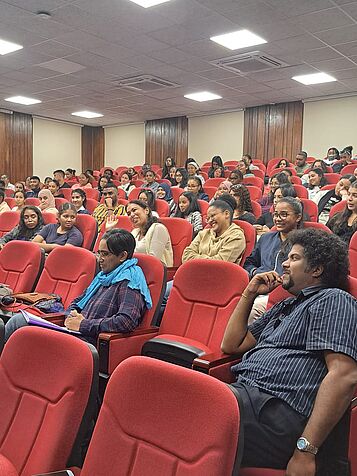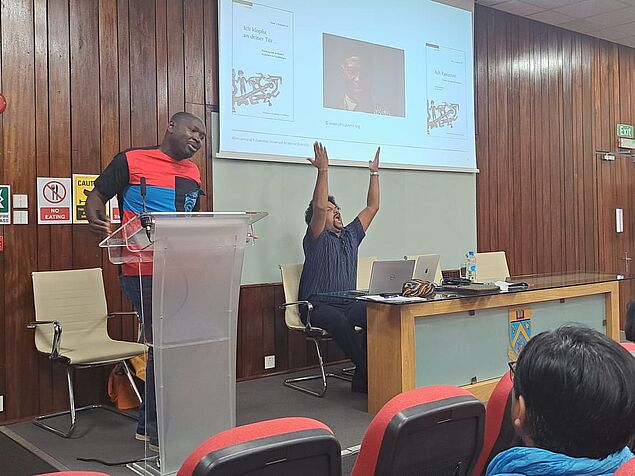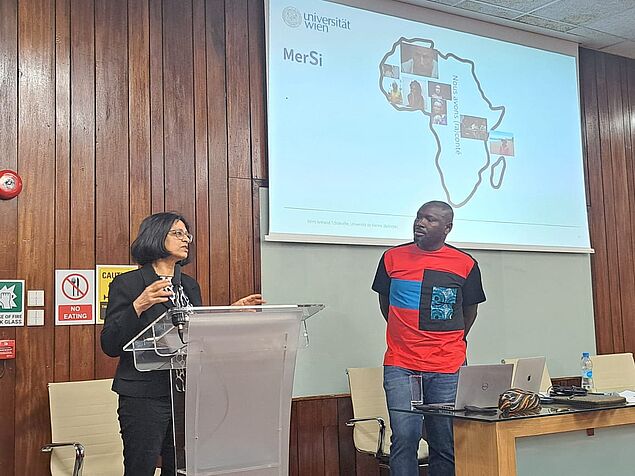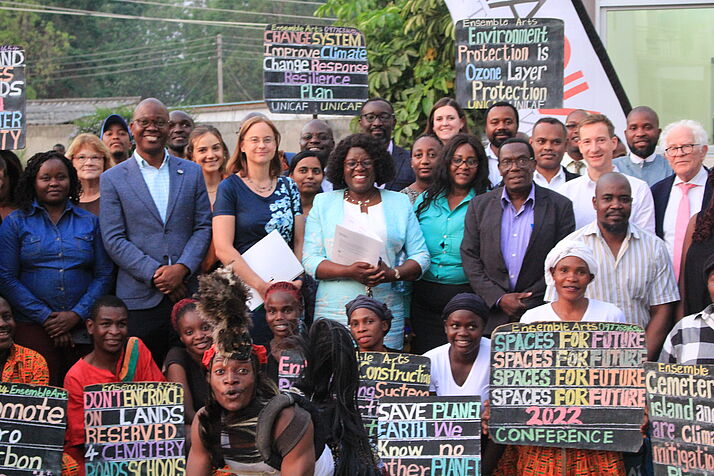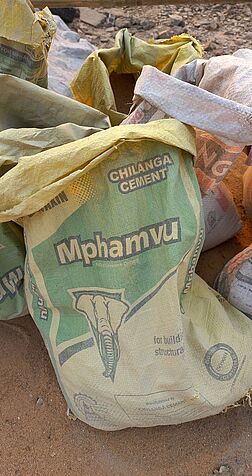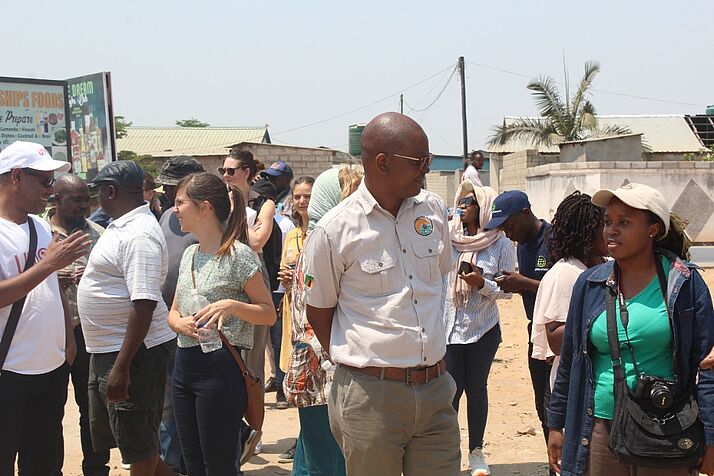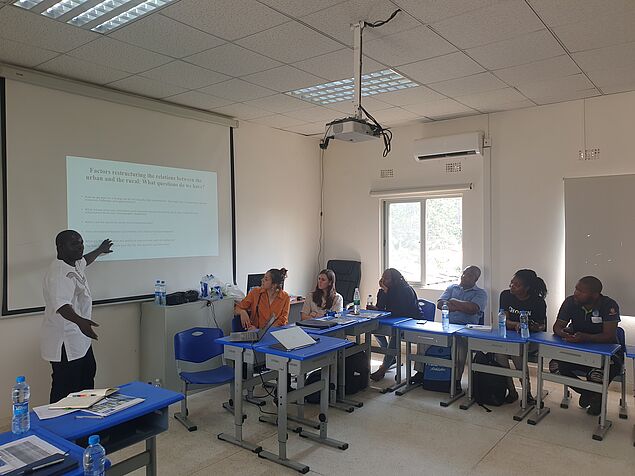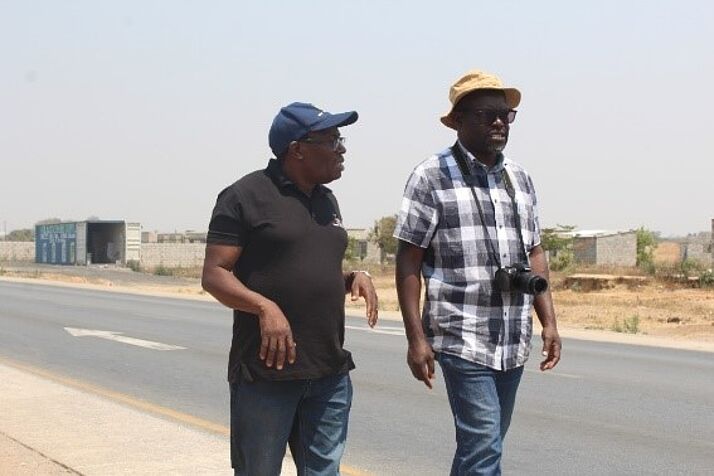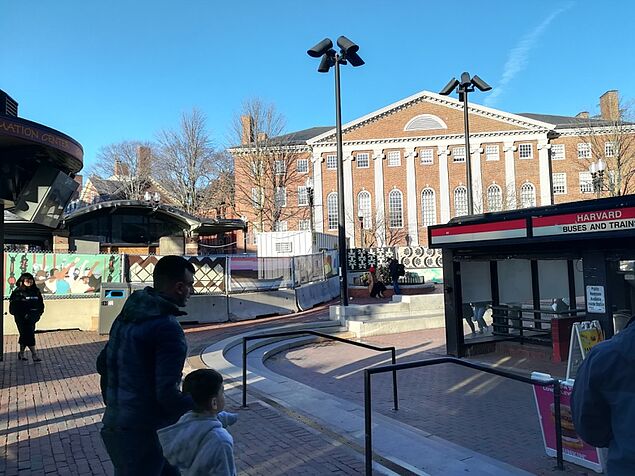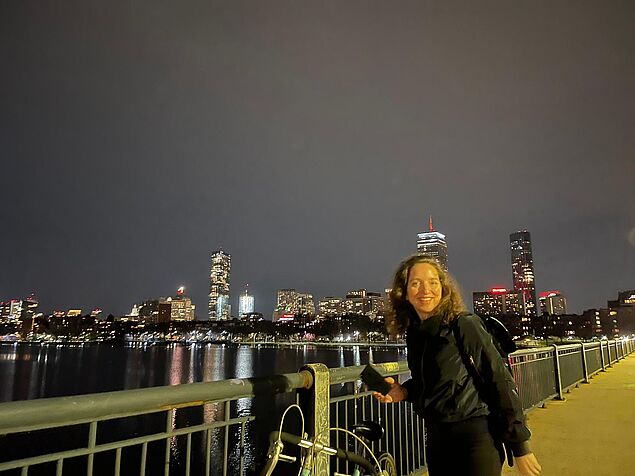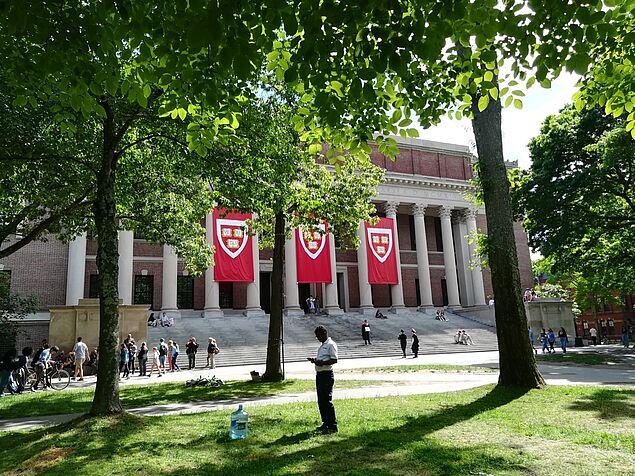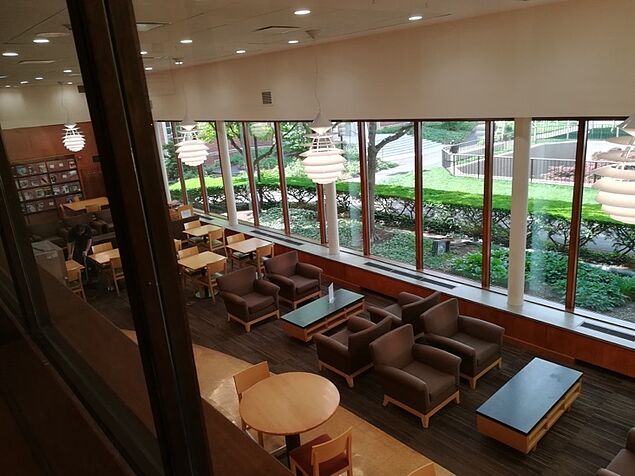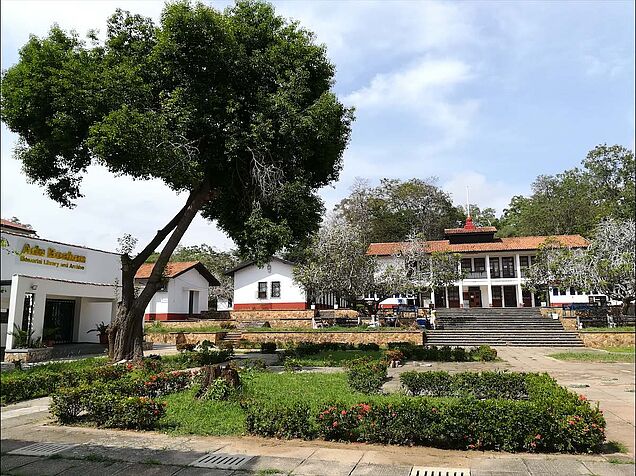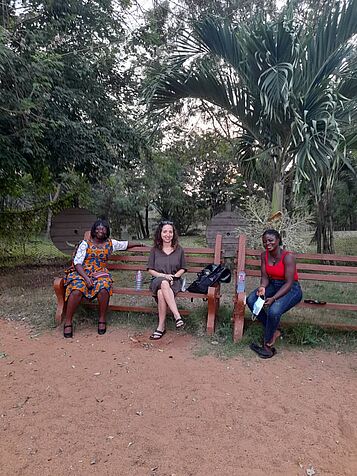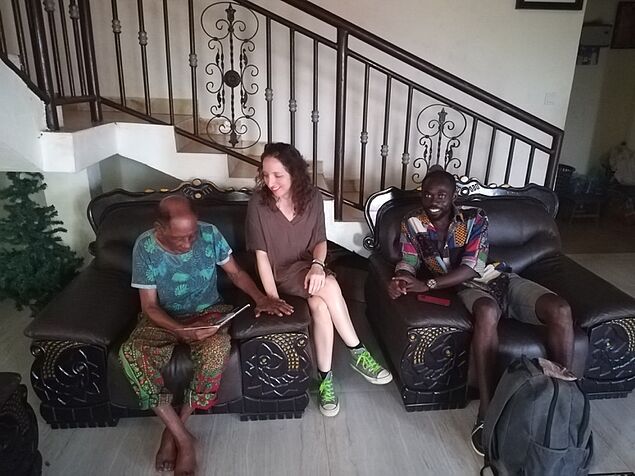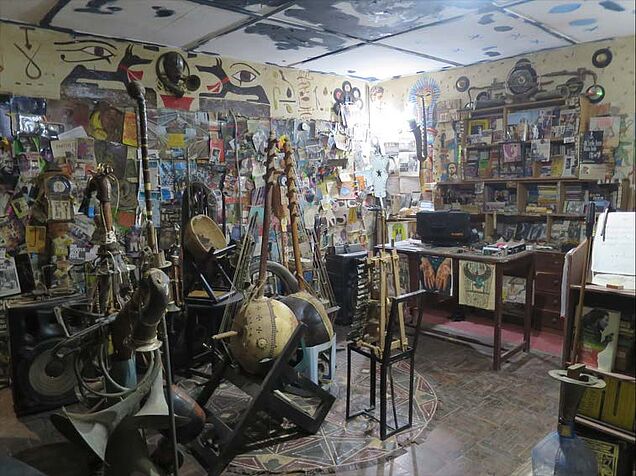RESEARCH NEWSFEED
Re-membering Ngũgĩ wa Thiong’o at the Frankfurt Book Fair 2025

© Wegerhoff/Tchokothe.
On Saturday, October 18, 2025, at the Frankfurt International Stage, Rémi Tchokothe was the guest of the panel: ‘Re-membering Ngũgĩ wa Thiong’o’ at the Frankfurt Book Fair. He was invited by LIPROM Promoting Global Stories to answer questions about the work of the literary and cultural giant who passed away on May 28, 2025. In the exchange with the journalist Cornelia Wegerhoff and an enthusiastic audience composed of students, journalists, actors in the book chain, members of a book club founded by Kenyan women and passersby, we revisited the significance of Ngũgĩ’s contribution to the literary and cultural worlds. Speaking of his contribution to our worlds, an event celebrating both the legacies of the Kenyan writer and essayist Ngũgĩ wa Thiong’o (1938-2025) and the Congolese philosopher and writer Valentin Yves Mudimbe (1941-2025) is scheduled for May 28, 2026, at the University of Vienna. This will be led by students who are currently participating in the course ‘De-centering the Colonial Lie-brary: Mudimbe’s and Ngũgĩ’s Theoretical/Cultural Legacies’. This event will centre on students’ perspectives and creative approaches to the writers and their works. Kindly save the date.
Rémi Armand Tchokothe
Angelika Heiling: Forschungsaufenthalt in Sambia

Angelika Heiling und Anna Zgambo (Schriftstellerin und Doktoratsstudierende)

Als Doktorandin am Institut für Afrikawissenschaften an der Universität Wien, unter der Betreuung von Daniela Waldburger, absolvierte ich im Rahmen meiner Dissertation mit dem Titel "Of Roots and Routes: (Trans)local Voices in Zambian Literatures", von 24.08.-06.09.2025 einen Forschungsaufenthalt in Sambia, der für die empirische Fundierung meines Projekts von zentraler Bedeutung war. Durch den direkten Austausch mit Autor:innen, Herausgeber:innen, Literaturwissenschaftler:innen, sowie Vertreter:innen kultureller Institutionen erhielt ich relevante Informationen aus erster Hand, die für die Beantwortung meiner Forschungsfragen entscheidend sind.
Während meines Aufenthalts führte ich folgende Forschungsaktivitäten durch:
- Interviews mit Autor:innen und Akteur:innen der sambischen Literaturszene, um mehr über ihre sprachlichen Entscheidungen, ihren Umgang mit Mehrsprachigkeit, ihre Erfahrungen in und mit der sambischen, aber auch regionalen und überregionalen, Literaturszene(n), ihre Themenwahl und ihre Positionierung innerhalb der literarischen Öffentlichkeit zu erfahren.
- Sichtung und Beschaffung von Materialien, die digital und aus der Ferne nicht zugänglich sind, darunter vor allem literarische Texte (Primärliteratur) und Sekundärliteratur.
- Vertiefende Gespräche und Vernetzung mit Wissenschaftler:innen und Lehrenden aus den Bereichen Literatur, Linguistik und Cultural Studies (vor allem an der University of Zambia und der Mulungushi University), um aktuelle Diskurse über Sprache, Identität und Repräsentation in sambischen Literaturen besser einordnen zu können.
- Besuche literarischer und kultureller Veranstaltungen, wie dem National Arts Festival (von 28.-31.8. in Lusaka) und Buchläden, um einen Eindruck davon zu erhalten, wie Literatur in Lusaka zirkuliert und wahrgenommen wird.
- Besuch eines Meet & Greet Events mit Dr. Ranka Primorac, Associate Professor of African Literature an der University of Southampton, einer der wenigen Forscher*innen, die sich mit sambischer Literatur befassen: Diskussion und Vernetzung mit relevanten Akteur*innen der sambischen Literaturszene.
Insgesamt führte ich 20 narrative Interviews mit Schriftsteller:innen (unter anderem auch aus vulnerableren Gesellschaftsgruppen wie z. B. aus der Queer Community), Herausgeber:innen, Literaturkritiker:innen, Vertreter:innen relevanter kultureller Institutionen und Wissenschaftler:innen, Lehrenden und Dokoratsstudierenden an der University of Zambia. Geplant war auf Wunsch des Dean of the School of Humanities and Social Sciences auch ein Vortrag an der University of Zambia zu meinem Projekt, der aber aus Zeitmangel nicht zustande kam (aber vermutlich online nachgeholt werden kann).
Die aufgenommenen Interviews wurden ergänzt durch teilnehmende Beobachtung und einem Forschungstagebuch. Das umfangreiche und wertvolle Datenmaterial werde ich in den nächsten Wochen auswerten und analysieren und die gewonnenen Erkenntnisse werden die theoretischen Perspektiven meiner Dissertation empirisch unterfüttern, Textanalysen ergänzen und zur Schärfung meiner Argumentation beitragen. Es ist mir zudem gelungen, weitere neue Texte und Stimmen zu entdecken und so zu einer breiteren und diverseren Repräsentation und kritischen Analyse sambischer Literaturen beizutragen.
Durch die Forschungsreise wurde mir die Aktualität und Relevanz meiner Dissertation noch stärker bewusst. Darüber hinaus konnte ich Zugang zu wertvollen Quellen, Kontextwissen und Kontakten (auf akademischer und nichtakademischer Ebene) erlangen und ausbauen, die entscheidend für das Gelingen meines Doktoratsprojekts sind.
Angelika Heiling
Forschungsaufenthalt in Sambia
Einblicke in die Afrikawissenschaften: Wege, Perspektiven und Inspirationen für den Studienstart

Wer forscht eigentlich am Institut für Afrikawissenschaften? Und wie war der Weg afrikawissenschaftlich Lehrender dorthin? Im Kurs zur „Wissenschaftsgeschichte“, den Bachelor-Studierende relativ früh im Studienverlauf belegen, haben wir uns nicht nur mit so genannten Meilensteinen afrikawissenschaftlicher Forschung befasst, sondern auch Interviews mit ausgewählten Lehrenden am Institut gemacht. Die von den Studierenden angesprochenen Lehrpersonen gewährten mit großer Offenheit Perspektiven in die Philosophie ihres Arbeitens, sprachen über akademische Erfahrungen und Wegmarken, die sie geprägt haben.
Im Kurs zur Wissenschaftsgeschichte sind diese Interviews transkribiert, diskutiert und in gemeinschaftlicher, wissenschaftlich-kreativer Aktion zu einer „Ziehharmonika der Zugänge“ zusammengebastelt worden. So haben sich Studierende mit dem Forschungsalltag anderer auseinander gesetzt und gleichsam eigene Schritte in das Forschen und Darstellen der Ergebnisse getan.
Zum Semesterbeginn 2025/26 wollen wir mit ein paar bildlichen Impressionen aus dieser Arbeit alle Erstsemesterstudierenden und selbstverständlich auch solche, die es einmal gewesen sind, begrüßen und zum Studium motivieren.
Ziehharmonika der Zugänge
Giving Back Trip in Lubumbashi (Demokratische Republik Kongo)

© Luc Mukendi

© Waza

© Waza
Wahrscheinlich gibt es nur wenige solche Momente in meinem öffentlichen akademischen Leben wie zwei Veranstaltungen rund um die Präsentation meiner Forschungsergebnisse in Lubumbashi (DR Kongo) diesen September.
Am 5. September 2025 fand im Centre d'Art Waza die Präsentation meiner Monografie statt, einer Publikation die die Forschung mit den ehemaligen Minenarbeiter:innen zum Inhalt hat. Der Ort: dort, wo wir auch 2019 gemeinsam miteinander gesprochen, diskutiert und gestritten hatten über die Interpretation von Ereignissen, die Bedeutung von Nostalgie, etc. Die Teilnehmer:innen: ein emotionales Wiedersehen mit so vielen die diesem gemeinsamen Forschungsweg geprägt haben. Weggefährt:innen aus der Community und der Universität Lubumbashi waren dabei, als der für Wissenschaft und Kultur Zuständige für Haut-Katanga, Pascal Kafwimbi, gegen Ende der Veranstaltung das Buch mit Rotwein getauft und in die Gesellschaft aufgenommen hat.
Am 10. September 2025 fand bei Picha, einem weiteren Kunst- und Kulturzentrum, eine Roundtable statt, bei welchem ich das Privileg hatte mit einem ehemaligen Forschungspartner, dessen Biografie ausführlich Eingang in die Monografie gefunden hat, auf dem Podium zu sitzen. Der Ort war auch hier symbolträchtig, denn der Eigentümer des Hauses, in welchem dieses Zentrum untergebracht ist, musste im Verlaufe seiner Karriere dieses Haus vermieten, um wirtschaftlich über die Runden zu kommen, während er in die Boyerie (das ehemalige Gebäude für die Hausangestellten) umgezogen ist. Das Publikum aus der künstlerisch – intellektuellen Szene war sich dessen nicht bewusst und es war eine große Bereicherung für mich mit einem kurzen Inputvortrag eine Grundlage für das Gespräch zwischen Publikum und Hausbesitzer zu bieten.
Aksanti na merci ku-partagé !
Artikel von Serge SHIMATU Le Défi congolais und La Rédaction Lebonobo.net: https://lebonobo.net/read-article-73
Summer Conferences 2025

Post-doctoral researcher Elisabeth Knittelfelder participated at the 7th Mashariki Literary and Cultural Studies Conference held at the University of Dar es Salaam in Tanzania between 21-23 August 2025. The theme of the conference was “Ecocritical Textualities and Eastern African Literary and Cultural Practices”. Elisabeth Knittelfelder presented her research in her talk with the title “Between Scarcity and Overabundance: Reading Hydrocrises in African Short Fiction”.
Over the summer, Elisabeth Knittelfelder also participated at the ACLALS Conference at the University of Nairobi, Kenya, and presented a paper with the title “European bruted and kept: Subverting Extraction in Buhle Ngaba’s play Bling!”, as well as at the CDE Conference in Konstanz, Germany, where she presented her paper “Shifting the Conversation: Testifying Perpetrators in the Workshop Play #JustMen”.
The organizers of the Rwanda exhibition at the UN in Geneva
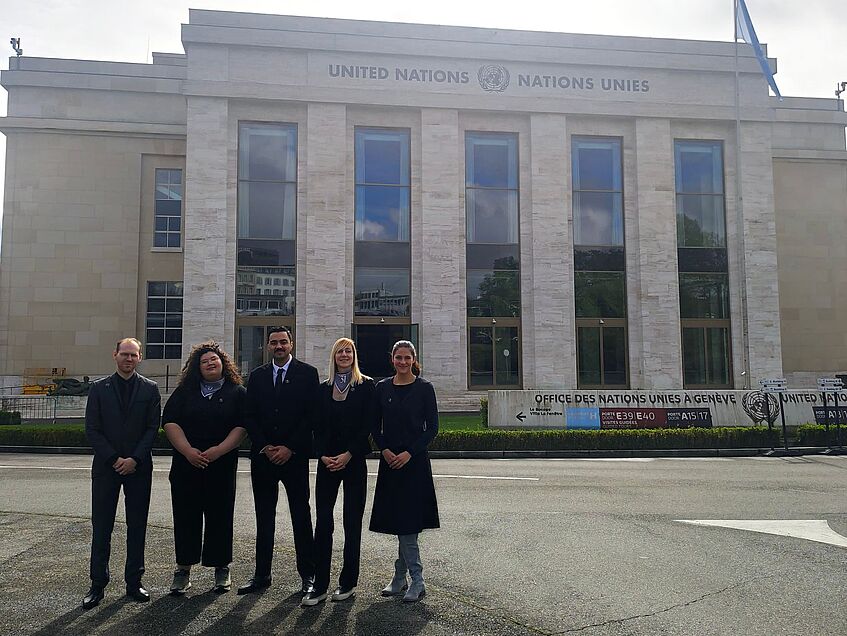
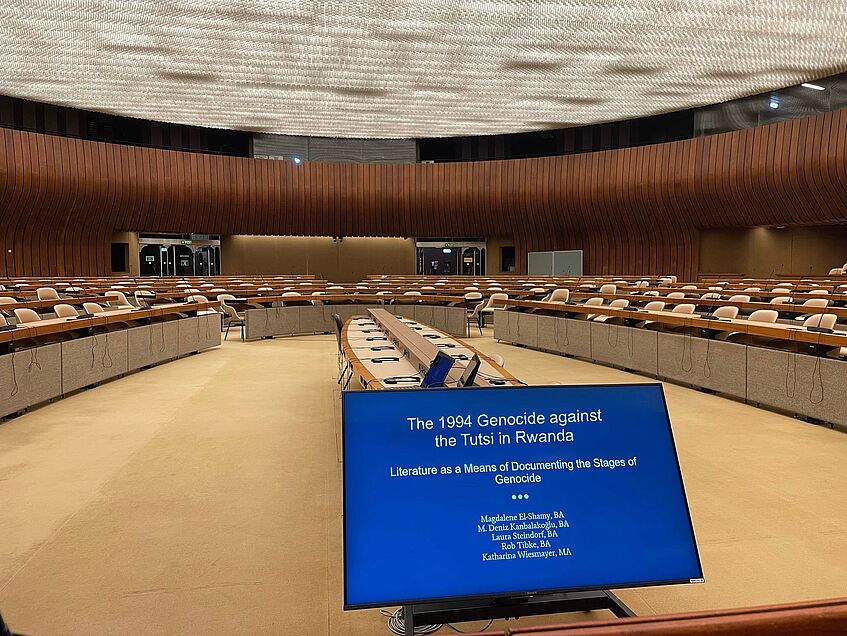
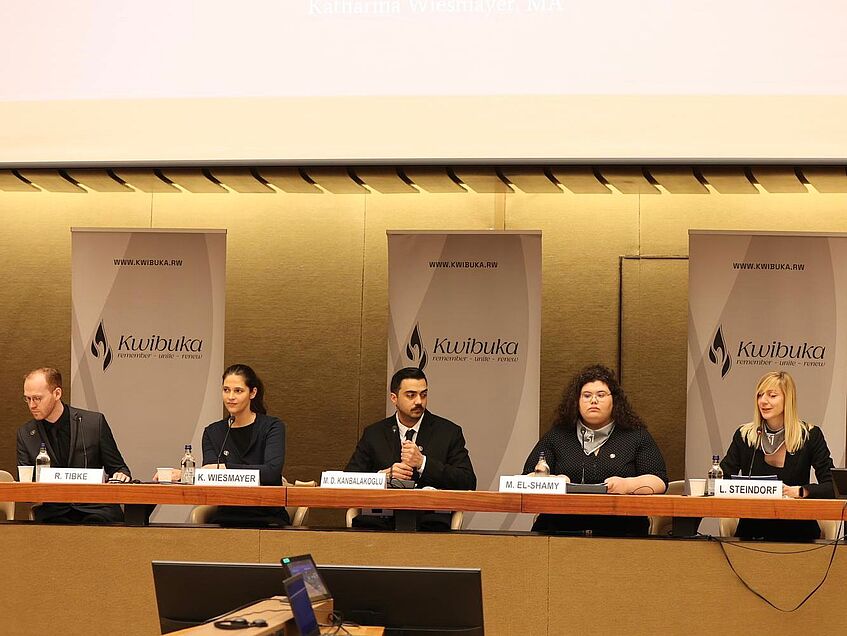
In April 2025, five students from the University of Vienna – Magdalene El-Shamy, Deniz Kanbalakoglu, Laura Steindorf, Rob Tibke and Katharina Wiesmayer – were invited to the United Nations in Geneva, Switzerland, to give a presentation on “The 1994 Genocide against the Tutsi in Rwanda – Literature as a Means of Documenting the Stages of Genocide”. This report is a reflection on their experience.
In autumn of 2023, we, a group of students from Comparative Literature and African Studies from disparate backgrounds and manifold perspectives, joined professor Rémi Tchokothe’s course “Rwanda 1994: Humanity’s collective Memory(cide) 30 years later”. We were faced with a diverse corpus that testified to the survivors’ experiences of the 1994 Genocide against the Tutsi in Rwanda.
Within the click of a mere hundred days, approximately 800 thousand Tutsi were murdered systematically. The corpus illuminated this gruesome history: uncovering the social discord wrought during the Belgian colonial era, the resultant intensification of genocide ideology during the 1950s, and the final apogee of mass extermination in 1994. We also read of the intergenerational traumas and inflictions which remain. But how to take this knowledge outside the seminar walls; to make this history palpable? We decided our best course of action was to prepare an exhibition, located at the Department of African Studies, which delineated the eight stages of genocide, as promulgated by Gregory Stanton in 1996. Each stage would explain and make real the Genocide against the Tutsi.
On the opening night of our exhibition, we shared this history with an audience of students, members of the local public as well as individuals from the Rwandan diaspora community. We felt especially humbled that one of the guests was a representative of the Embassy of Rwanda in Geneva.
A little less than a year later, we received a message from our professor: the embassy would like us to come to Geneva to give a presentation on our research and exhibition. The same representative attending our exhibition had kindly thought of us and suggested that we include our presentation as part of the Kwibuka – the annual commemoration event to remember the 1994 Genocide against the Tutsi in Rwanda. Every genocide leaves a wound in our shared humanity; we were greatly honoured to be asked to continue our endeavour to fight memorycide, a mission our professor had instilled within us.
We returned to our research and began the undertakings for a much larger presentation in quite a different context. Our audience would be composed of survivors, diplomats, academic researchers and curious members of the Swiss public. Every week, we confined ourselves to a stuffy study space, finessing the structure and content, rehearsing all the while supporting each other. In the penultimate week, we booked a seminar room at the university for our final rehearsal, presenting to professor Tchokothe as well as a party of wonderful friends and family who took the time to give us their insightful feedback.
On April 13th, with our exhibition posters reprinted and a surfeit of nervous excitement, we boarded the plane to Switzerland.
We were so grateful: after warmly welcoming us at the airport, the Embassy led us to our hotel. Not only did they pay for our flight and all accommodations, they also ensured we were a part of the team from the outset, and that we wouldn’t have anything to worry about.
Our posters were put on display at the venue’s entrance on the day of our presentation. The setup was made possible through the generous support of the Rwandan Embassy – particularly Betty Dusenge, the Embassy’s Second Counsellor, and Ornella Mihigo, who was always warm and considerate as she assisted us with logistics, and moderated the event. In addition to Ornella’s moderation, Edmond Tubanambazi, the Embassy’s First Counsellor, delivered thoughtful remarks.
After introducing ourselves and the university course, we began our PowerPoint presentation, having hopefully translated the themes of our exhibition into a digital format. We began by sharing our initial artistic approach to the project, presenting artworks that we had made and which enabled us to engage with genocide on a more profound level. By reference to our posters, historical documentation and literary testimonials, each of us explained at least one stage in the history of the Genocide against the Tutsi in Rwanda. Finally, one of our group members, Rob Tibke, shared an original poem, offering his personal artistic contribution to fight against historical erasure – against memorycide.
The discussion during the Q&A session that followed our presentation was truly thought-provoking. Upon the first question, all of us eagerly reached for our pens to note down the complex thoughts being provoked. Our work was resonating with the audience. Unfortunately, despite audience engagement, our time was limited. Nevertheless, even had this been only the beginning of a broader conversation, we felt imbued with yet more inspiration to continue our research into memory studies and African literature.
Our presentation took place before the main act of commemoration. In an august hall inside the United Nations, we witnessed Belko Kenza Naike performing her poem, a pained paean to Rwanda today and consecration of the survivors’ memories. Her mother, Sissi Dimitrie Mukanyiligira, then shared her testimony, her life story as a survivor and her message to remain indefatigable, even in the most dire and unjust realities. Every person rose to give her a standing ovation.
Meeting survivors of the 1994 Genocide against the Tutsi in Rwanda, and being welcomed so warmly by the community in Geneva, made a lasting imprint. Commitment to human dignity should stand behind the font of any monograph. After our presentation we felt, and continue to feel, certain of this. Still, engaging so deeply with such an immense topic was at times overwhelming. Some of us felt nervous many weeks in advance, others only in that instance before stepping onto stage. For the majority of us, English is our second or third language: our task at times winged dauntingly above us. Throughout it all, we supported one another, and worked through personal hurdles as a collective. The project required courage, empathy, and trust – not only in ourselves, but in each other. Together, we have created something memorable and meaningful which we will carry with us for a long time.
We have come to understand that empathy is not just a feeling. Much rather, empathy is a practice, a habit. In this context, empathy becomes the highest form of respect, and our attempt to preserve memory and the dignity of survivors was met with kindness and appreciation. At the final lunch, each of us were gifted a Rwandan name: to Deniz Nkubito, the warrior; to Katharina Kayitesi, the one endowed with gifts; to Laura Uwicyeza, the one who brings light; to Magdalene Mukasonga, the mother; and to Rob Mugabo, the courageous man. This spontaneous ‘baptism’ was not only joyous, but also constituted a moment for reflection. We were reminded of the privileges we carry: the freedom to study, to travel and to speak up. This moment highlighted the bonds we have formed, and the power which lies in respectful conversation.
Through a commitment to empathising with others, our work turned a student presentation into an experience – one that continues far beyond the final slide.
Read the report in turkish language (Translation by Deniz Kanbalakoglu)
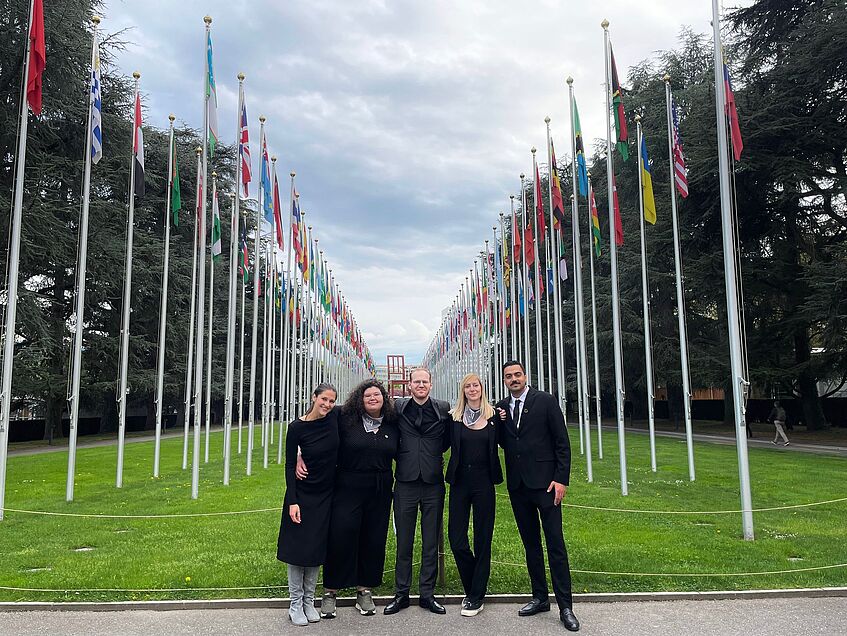
Daniela Waldburger at the University of Dar es Salaam
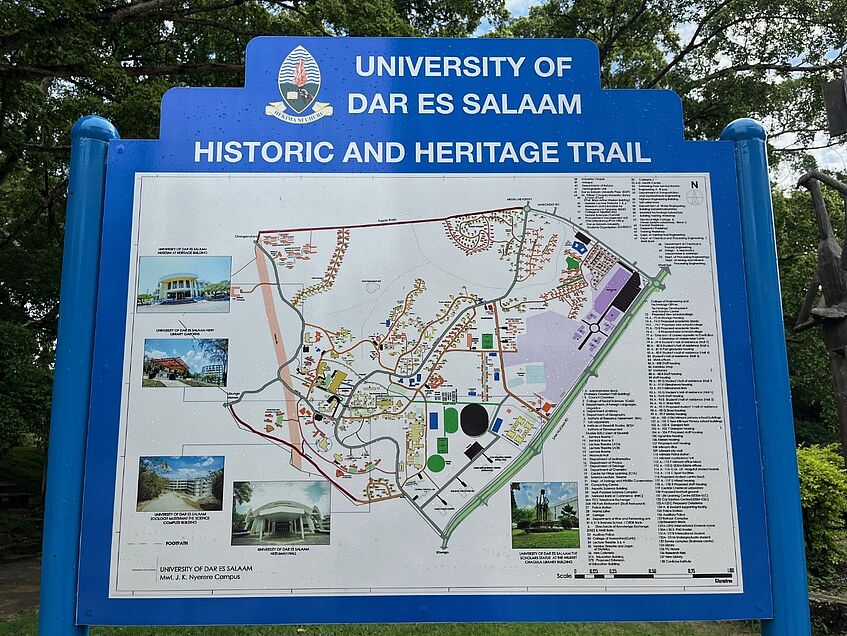
During the second week of the Easter holidays, Daniela Waldburger visited the University of Dar es Salaam (Tanzania), where she discussed the new Memorandum of Understanding (MoU) between the University of Vienna and the University of Dar es Salaam with David Muya, Head of the International Office, and Daniel Mugassa, as well as potential improvements to the student exchange program. The visit also included other departments, such as the Swahili Department, where she discussed research and exchange opportunities with Prof. Aldin Mutembei.
Elisabeth Knittelfelder's "Clay Diaries – Three Vases for Tragedy"
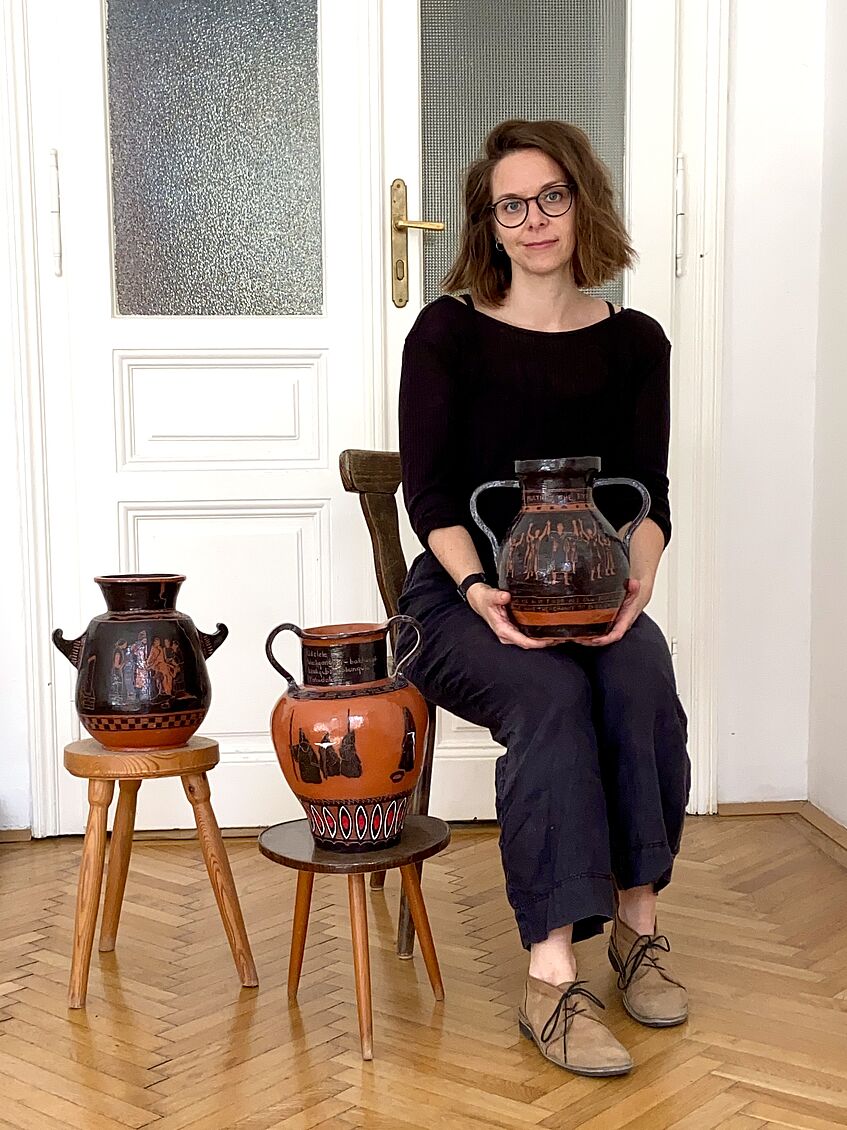
© Elisabeth Knittelfelder
As a Creative Fellow, postdoctoral researcher Elisabeth Knittelfelder was part of the research project Reimagining Tragedy from Africa and the Global South (ReTAGS), led by Prof. Mark Fleishman at the University of Cape Town in South Africa, which is now coming to a close. Her artistic research project "Clay Diaries – Three Vases for Tragedy" links pottery and digital archives as practices of memory. Elisabeth Knittelfelder’s project engages with the digital ReTAGS repository through clay and aims to complement the ephemerality of the physical performances of tragedy by creating physical, tangible offerings in the form of three vases for tragedy which are is also available in digital form in an interactive format. The three vases for tragedy record scenes from all three ReTAGS performances, Antigone [not quite/quiet], Oedipus at Colonus:
#aftersophocles, and iKrele leChiza ...the sermon and offer contemplations on the art of pottery as storytelling and clay as storyteller.
Find out more about Elisabeth Knittelfelder’s project “Clay Diaries” here: https://ibali.uct.ac.za/s/RETAGS/page/clay-diaries
Poetry Slam in April: Liberation, Resistance and Love
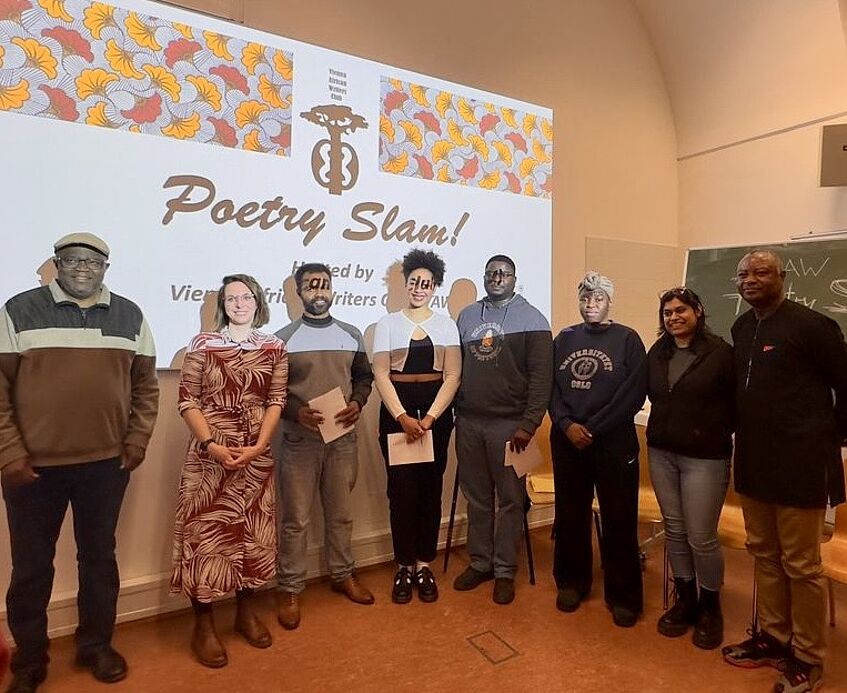
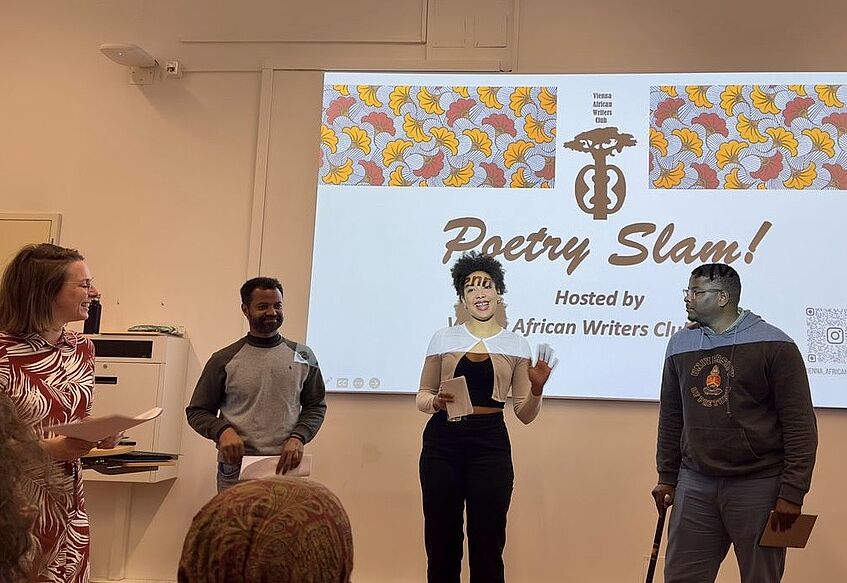
The Vienna African Writers Club (VAW), founded by Prof. Adams Bodomo, hosted another Poetry Slam evening at the Department of African Studies on 10 April, 2025. In three rounds, the three contestants Moges Teshome, Sophie Lenglinger, and Eduardo Kapapelo performed their amazing poems, addressing issues of liberation, resistance, and love through poetry.
Laurène Southe, Shefali Banerji, and Dr. George Akanlig-Pare from the University of Ghana had the honour to function as jury. Congratulations to all the poets! In the second part of the evening, VAW’s special guest Laurène Southe presented her debut poetry collection Child of Congo and shared insights into her creative work and writing process.
The next VAW Poetry Slam and Open Mic evening will be hosted in May 2025.
Report: Elisabeth Knittelfelder
Foto credits: Ying Liang Zhang
Arno Sonderegger eröffnet die Tullner Vorlesungen
„Immer, wenn in Afrika ein Alter stirbt, stirbt eine ganze Bibliothek.“ Die Tullner Vorlesungen, die im Jahr 2024 auf Initiative des Campus Tulln Technopol begründet und in Kooperation mit der Stadtgemeinde Tulln an der Donau ausgerichtet werden, eröffneten ihr Sommersemester mit einem afrikanistischen Vortrag von Arno Sonderegger (Institut für Afrikawissenschaften der Universität Wien). Er stand unter der Überschrift „Ein Blick in eine andere Welt: Geschichten und Weisheiten aus Westafrika im Zeitalter der Künstlichen Intelligenz“. Der Vortrag fand am 27. März 2025 im Minoritensaal des örtlichen Rathauses bei regem Andrang statt. Professor Rudolf Krska, Leiter des Instituts für Bioanalytik und Agro-Metabolomics (BOKU University), moderierte durch den Abend. Der Vortrag selbst stellte verschiedene Facetten im Leben und Werk von Amadou Hampâté Bâ (1900/01-1991) vor und rückte die Weisheitslehren jenes seinerzeit berühmten westafrikanischen Gelehrten ins Zentrum von Überlegungen zu dessen Zeit, zur Geschichte des 20. Jahrhunderts und zu unserer Gegenwart.
Link zu der Tullner Vorlesungsreihe: https://www.tulln.at/bildung-kultur/tullner-vorlesungen
Text und Collage: Arno Sonderegger
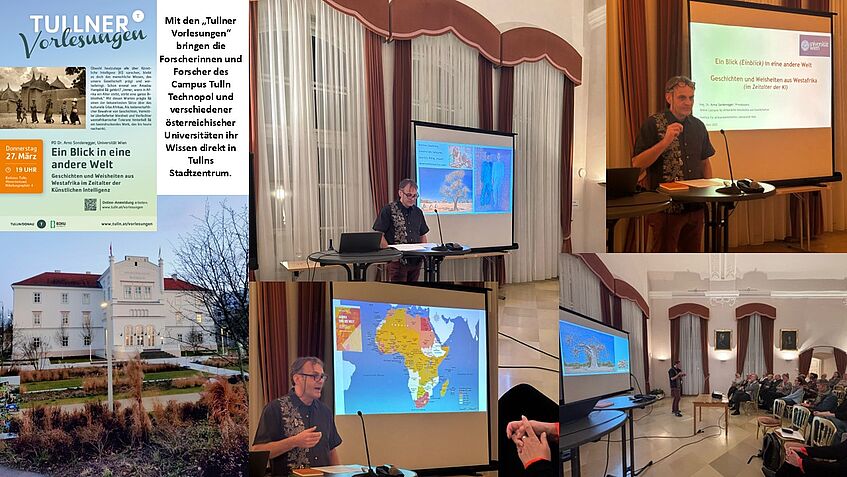
© Arno Sonderegger
Book release in open access: Daniela Waldburger's « C’était bien à l’époque mais l’avenir iko sombre » - Negotiating Nostalgia with and among Ex-Mineworkers in Lubumbashi (DRC).
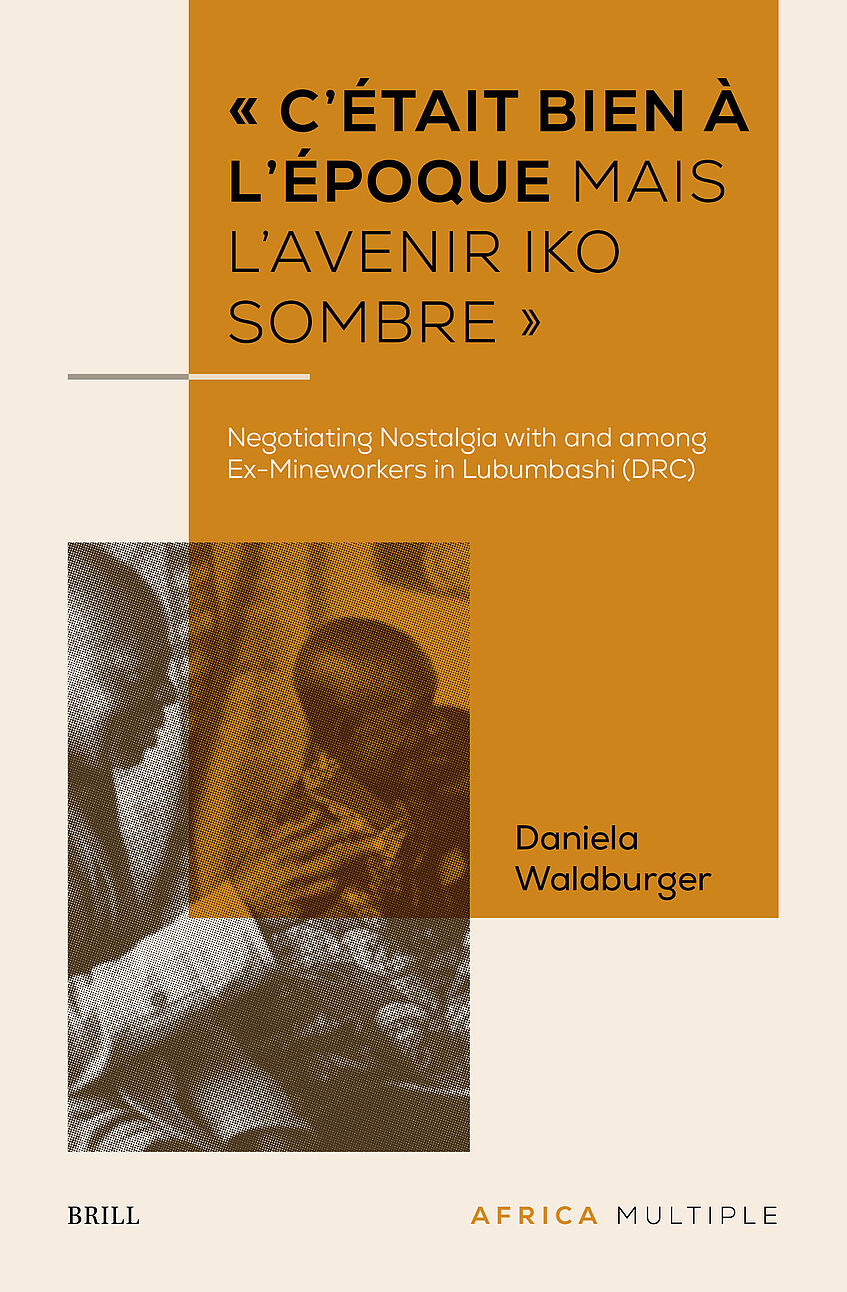
It is now out there: in open access thanks to the funding of the FWF and as a result from the FWF project “Employment-tied housing in (post)colonial Africa” (PI: Prof. Kirsten Rüther)
Why do former mineworkers in Lubumbashi (DRC) remember exploitative working conditions and measures to control their private lives with nostalgia? Building on their 'objects of loss', this book answers this question, foregrounding the voice of so-called 'Départs Volontaires’. The study combines linguistics, anthropology, and archives research to explore what ex-mineworkers regard as material and emotional 'objects of loss'. The book advocates for a participatory research framework called ‘the baraza web’ which merges the researcher’s perspective with the standpoint of the ex-miners to create an alternative archive and to show that power relations within a research setting need constant questioning.
Just download your copy here and feel free to share the link: https://brill.com/display/title/71900
Gute Nachrichten aus aller Welt und Bibliobox bei den zweiten österreichischen Antirassismustagen
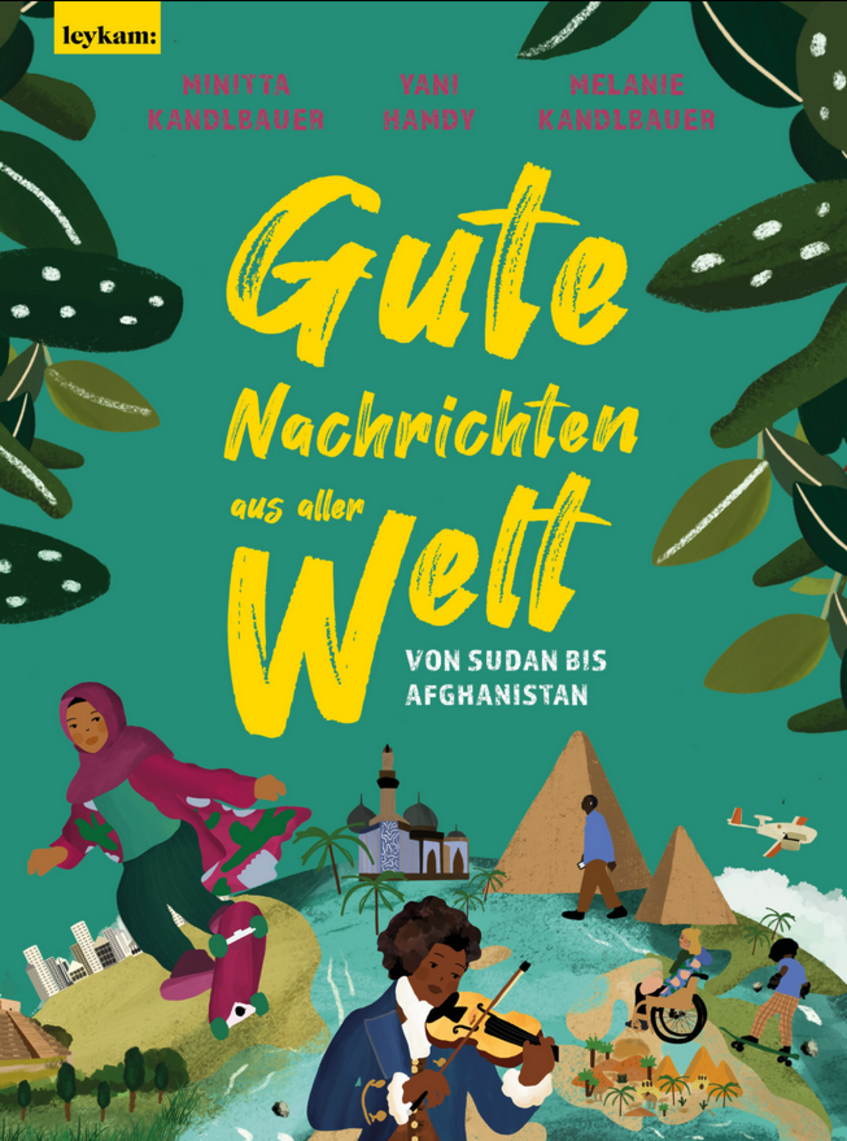
„Wusstest du, dass Fußball in China erfunden wurde? Wusstest du, dass im Jahr 2021 laut BBC 50 der 100 einflussreichsten Frauen der Welt aus Afghanistan kamen? Wusstest du, dass der erste Weltraumbahnhof in Kasachstan steht? Wusstest du, dass die nigerianische Filmindustrie Nollywood jährlich mehr Filme produziert als Hollywood? Wusstest du, dass der Farbfernseher in Mexiko erfunden wurde? Wusstest du, dass Neuseeland das erste Land war, in dem Frauen ab 1893 wählen durften? Wusstest du, dass in Neuseeland Flüsse Rechte haben? Wusstest du, dass die neuseeländische Gebärdensprache eine Amtssprache ist? Wusstest du, dass die älteste Universität der Welt von einer Frau, Fatima Al-Fihri, in Marokko gegründet worden ist?“
Diese sind nur einige Gute Nachrichten aus aller Welt. Von Sudan bis Afghanistan, von den Schwestern Minitta Kandlbauer und Melanie Kandlbauer gesammelt und von Yani Hamdy wunderschön illustriert (Leykam 2024). Im Rahmen der zweiten österreichischen Antirassismustage - vom Medienschaffenden Simon Inou organisiert - hat Rémi Tchokothe am Freitag, den 14. März 2025, ein Gespräch mit den beiden Autor*innen und Arwa Elabd, Lehrerin und Gründerin der Buchhandlung Bibliobox (Literatur in der Box) die sich für Diversität und Menschennähe engagiert, geführt.
Wir haben unter anderem über die Entstehung der Buchidee und die Buchhandlung, über die Recherchearbeit für eine Publikation, die 30 Länder umfasst, sowie ihre bisherige Rezeption gesprochen – auch über die Herausforderungen eine außergewöhnliche Buchhandlung zu führen, und über die Zukunftspläne der drei inspirierenden Frauen.
À propos Inspiration: lassen Sie sich von den Veranstaltungen, die noch bis zum 23. März 2025 in Wien, Graz, Salzburg, Oberwart, Innsbruck, Zwettl, Linz und Bregenz stattfinden inspirieren und vernetzen Sie sich mit anderen Akteur*innen für eine rassismusfreie Gesellschaft (siehe Österreichische Antirassismus.Tage – Jeder Tag ist ein Antirassismus Tag). Eine weitere gute Nachricht zum Schluss: bitte halten Sie sich Freitag, den 13. März 2026, frei: an diesem Tag werden die dritten österreichischen Antirassismustage an der Central European University in Wien eröffnet.
Rémi Armand Tchokothe
Bildergalerie - Antirassismustage 2025
Book Launch: Laurène Southe's "Child of Congo"
The Vienna African Writers Club (VAW) proudly supported the book launch of Laurène Southe’s debut poetry collection with the title Child of Congo. The book launch took place at Galerie Zippenfenig on 27 February
2025 and was sponsored by the Caritas Project Mutfluencer. Elisabeth Knittelfelder, postdoctoral researcher at the Department of African Studies, represented the Vienna African Writers Club and moderated the evening. After a panel discussion with Mireille Ngosso, medical doctor and former politician in Vienna, Dr. Daniel Bitouh from the book store and cultural institution Afrieurotext, and Salomé Grünberger from the organisation Fondation la Grande, Laurène performed two of her poems, “Child of Congo” and “Silent Genocide”, and discussed her poems and literary work in a Q&A with an incredible audience. In addition to a rich book table, amazing Congolese food and drinks were served.
Laurène had previously performed at VAW Poetry Slams and Open Mic evenings. Her poems have also been published in Brittle Paper, the Shallow Tales Review, and The Africa Migration Report: An Anthology of Poems. We congratulate Laurène to her debut poetry collection and the successful book launch!
Elisabeth Knittelfelder
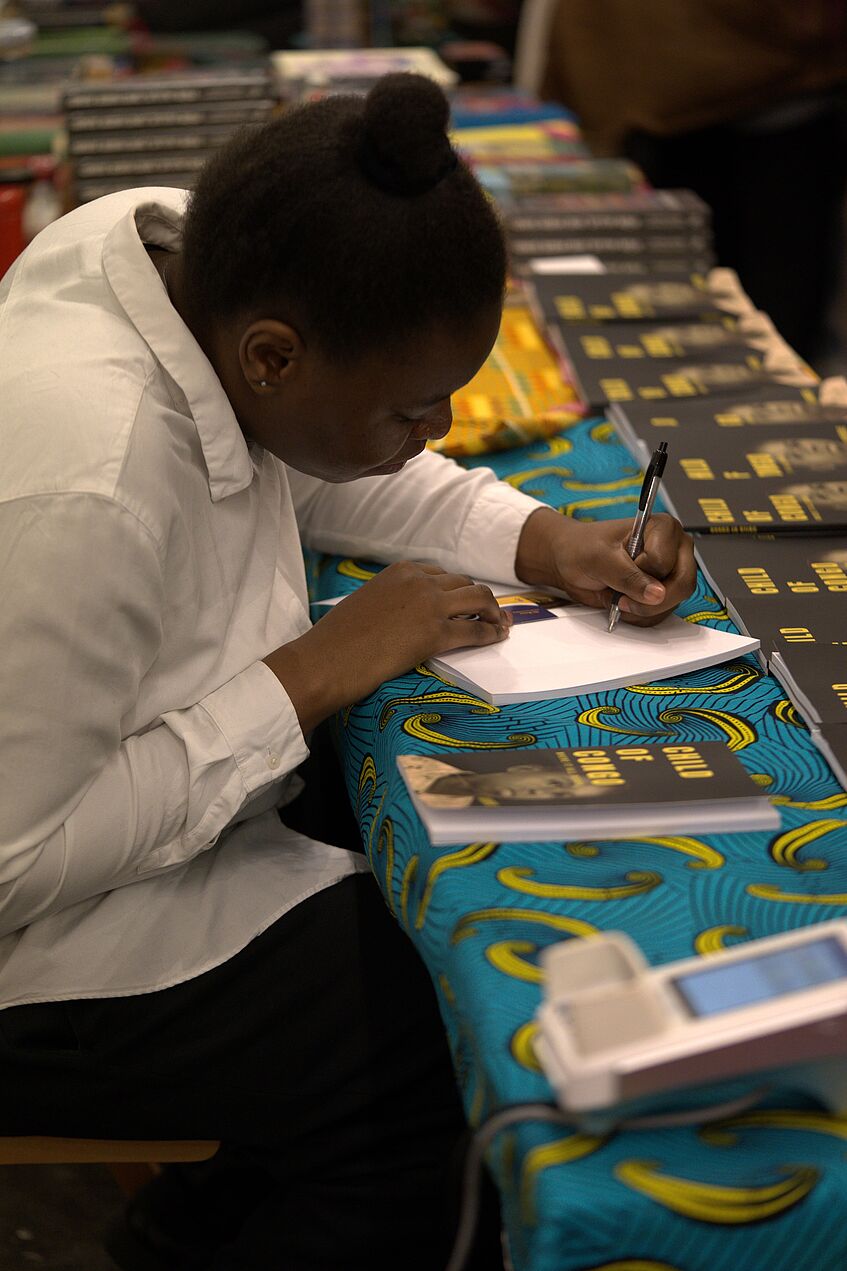
© Julia-Marie Seewald
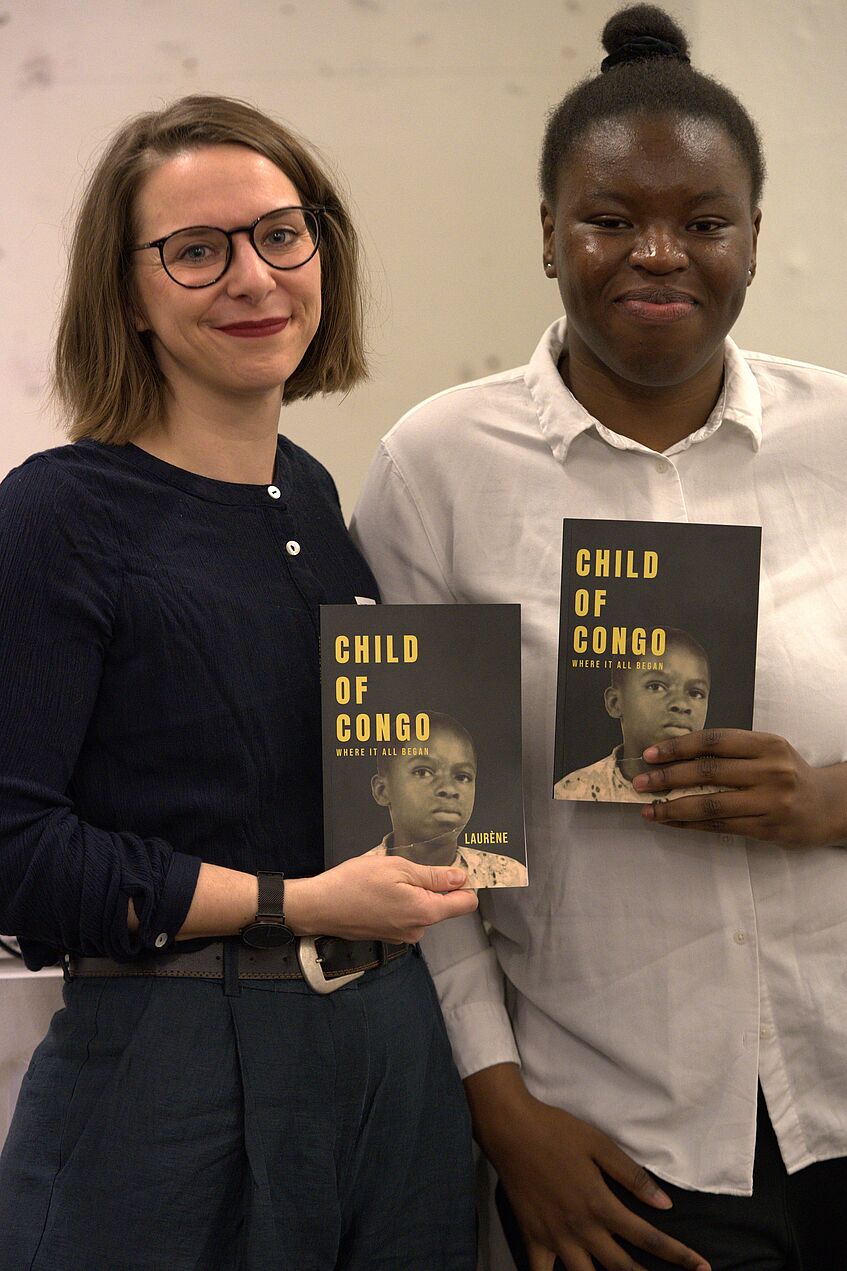
© Julia-Marie Seewald
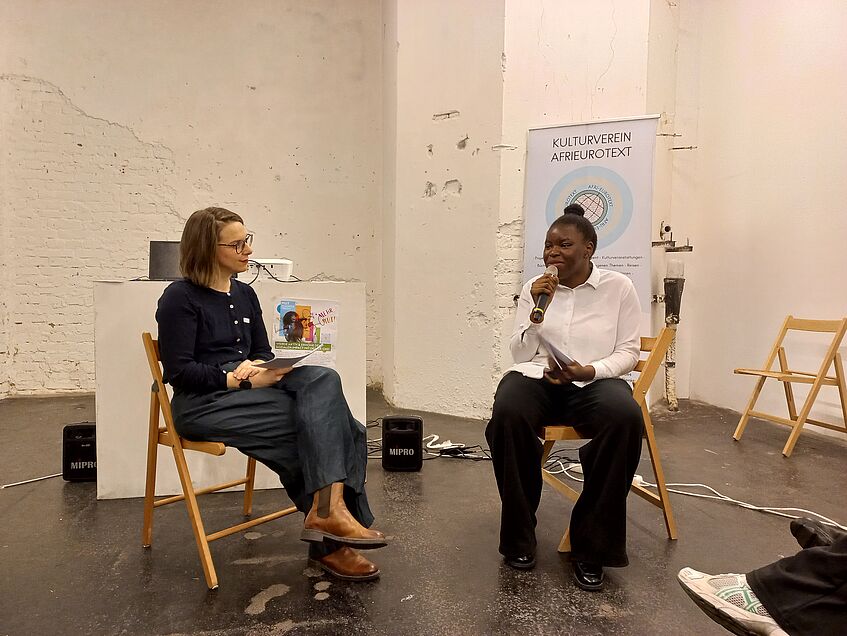
© Julia-Marie Seewald
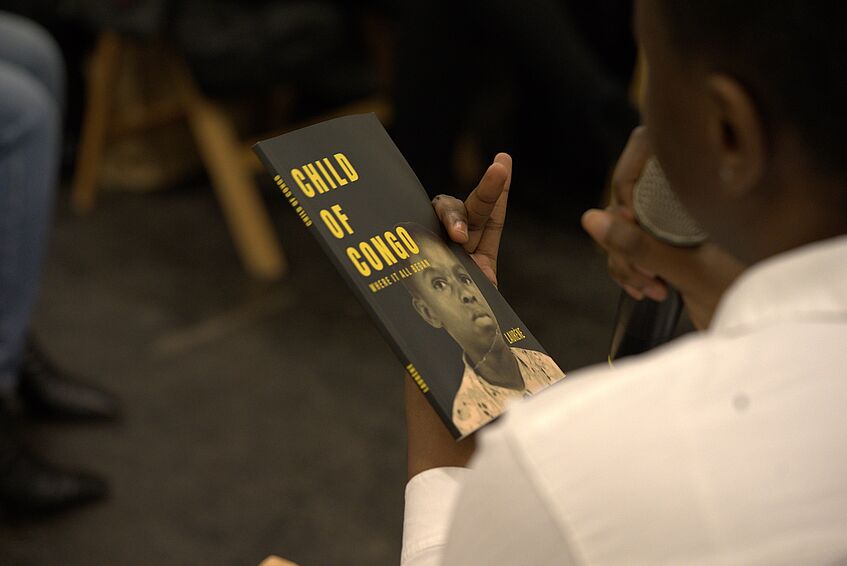
© Julia-Marie Seewald
Retrospektive Ousmane Sembène. Vater des afrikanischen Kinos
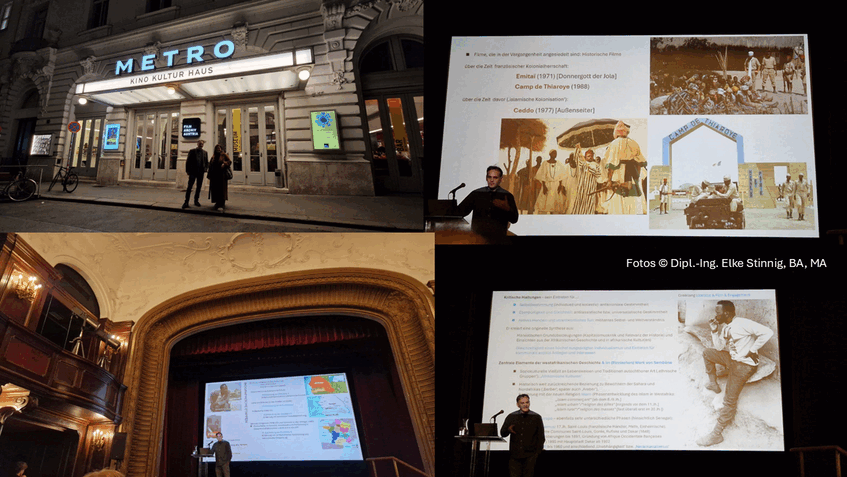
Vor der Abend-Vorführung von „La Noire de…“, jenem zurecht berühmten Klassiker des afrikanischen Kinos, in dem Kolonialismus und Rassismus – auf Schwarz-Weiß-Film gebannt – in unbestechlich differenzierter Weise behandelt werden, hat am Dienstag, den 11. März 2025, Arno Sonderegger (Institut für Afrikawissenschaften) im gut besuchten Saal des Metro Kinokulturhauses einen Vortrag zu „Ousmane Sembène (1923-2007), Kreativer kritischer Geist ‚en action‘“ gehalten.
Im Vortrag ging es darum, dem Publikum die Persönlichkeit, den Erfahrungsreichtum und die kritische Brillanz dieses senegalesischen Schriftstellers und Filmemachers deutlich zu machen; außerdem Lust zu wecken, die Schöpfungen dieses Meisters eines afrikanischen „Autorenkinos“ kennenzulernen oder mit frischen Augen wiederzusehen. Durch manch typologische Überlegung hinsichtlich der Klassifizierung seines filmischen Werks sollten Schneisen gelegt werden, um leichter – und vielleicht auch besseren – Zugang zu ihm zu finden. Bekanntlich drehte Sembène Filme, deren Plots in der damaligen Gegenwart angesiedelt sind, ebenso wie solche, die in der näheren oder ferneren Vergangenheit spielen. Die französische Kolonisierung seines Heimatlands, das bis 1960 Teil von „Französisch-Westafrika“ war, bildet dabei einen zentralen Ankerpunkt, auf den hin sich die Themen seiner Filme in der historischen Zeitachse anordnen lassen. Dieser Ankerpunkt ist allerorts zu erkennen: in Sembènes Inszenierungen eines zeitgenössischen, „neokolonialen“ Afrikas der Unabhängigkeiten (wie z.B. in „Mandabi“ oder „Xala“) ebenso wie in seinen Darstellungen „vorkolonialer“ Traditionen und autochthoner afrikanischer Erfahrungswelten (wie etwa in „Ceddo“ oder „Emitai“), und naturgemäß in jenen seiner Filme, deren Plot in der europäischen Kolonialzeit angesiedelt ist (wie z.B. „Camp de Thiaroye“).
All seinen Filmen war – und ist – Aktualität eingeschrieben. Ihr Schöpfer sah seine Filme als Mittel zum Zweck. In Wort und Bild die eigene Welterfahrung nachzuzeichnen und aufzuzeichnen – das Metier des Schriftstellers – darum ging es ihm seit der Veröffentlichung seines ersten Romans im Jahr 1956. Mit gesprochenen Worten und bewegten Bildern die Welt zu erklären, zur selben Zeit zu unterhalten und zu bilden, und die Zuschauer im wahrsten Sinn des Wortes zu bewegen – das Metier des Filmemachers – das machte er sich, spätberufen, zu eigen und realisierte, seit 1963, unter oft schwierigen Bedingungen eine beeindruckende Zahl cineastischer Meisterwerke. Menschen an ihre Verantwortlichkeit zu gemahnen, sie an ihre Handlungsfähigkeit zu erinnern, sie dazu aufzurufen, sich ihres Verstandes zu bedienen und das Leben selbstbestimmt und würdevoll in die eigenen Hände zu nehmen – das ist das Metier des Pädagogen „in der Schule des Volkes“, als der er sich selbst verstand, eine Rolle, in der er sich, durchaus selbstironisch gebrochen, bereits in seinem Langspieldebut „La Noire de…“ selbst inszeniert: „école populaire“ steht deutlich über jener Tür geschrieben, aus der Ousmane Sembènes Charakter, Pfeife rauchend wie im echten Leben, die Straße und damit die Szene betritt, mitten hinein in das Getümmel einer Menschentraube.
Das Leben gestaltet sich immer und überall – und zu allen Zeiten – als ein Drama, in dem Menschen miteinander interagieren, interagieren müssen und sollen, ganz gleich, welch unterschiedlicher Art, verschiedener Herkunft, Kultur oder religiöser Überzeugung sie auch sein mögen. Sie alle haben unterschiedliche Vorstellungen und Ansichten, bringen verschiedene Interessen und Bedürfnisse ins Spiel – die, unter allen Umständen, ausgeglichen werden müssen. Sehr passend charakterisiert Samba Gadjigo, dessen lesenswerte Sembène-Biographie in französischer und englischer Sprache vorliegt, ihn darum als „einen militanten Künstler“ und als „ein afrikanisches Gewissen“. Dem ist wenig hinzuzufügen. Sembène verstand kritischen Geist, schöpferische Phantasie und couragierte Tatkraft nachhaltig miteinander zu verbinden. In seinem kreativen Schaffen wusste Sembène eine ausgeprägte nonkonformistische Individualität mit Sinn für kommunale Interessenslagen und soziale Anliegen zu verbinden. Ein kritisch engagierter Intellektueller, wie er sonst, so möchte man witzeln, nur im Buche steht, aber in Gestalt von Ousmane Sembène tatsächlich leibhaftig und wirkungsvoll auf der Leinwand in Erscheinung trat. Zwischen 1963 und 2004 realisierte Sembène ein außergewöhnliches filmisches Oeuvre, das derzeit im Rahmen einer Retrospektive vom Filmarchiv Austria zu sehen ist.
Im Metro Kinokulturhaus (Johannesgasse 6 im I. Wiener Bezirk) läuft die Ousmane Sembène-Retrospektive vom 10. März bis 2. April 2025. Lassen Sie sich das nicht entgehen!
Arno Sonderegger
Rémi Tchokothe at the University of Sousse (Arabic: جامعة سوسة), Tunisia
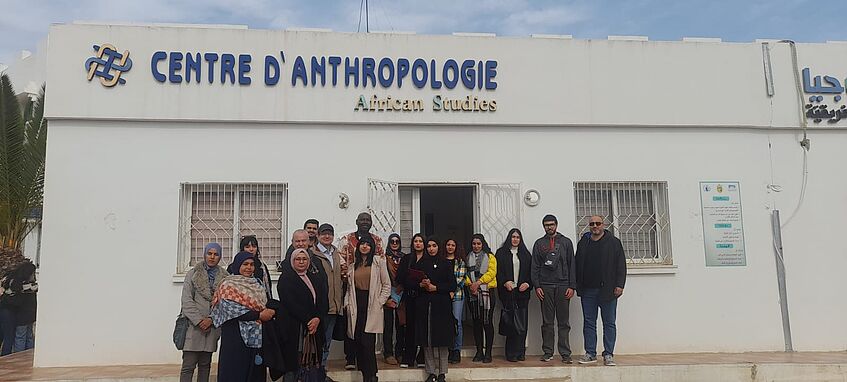
© Ben Amara & Tchokothe
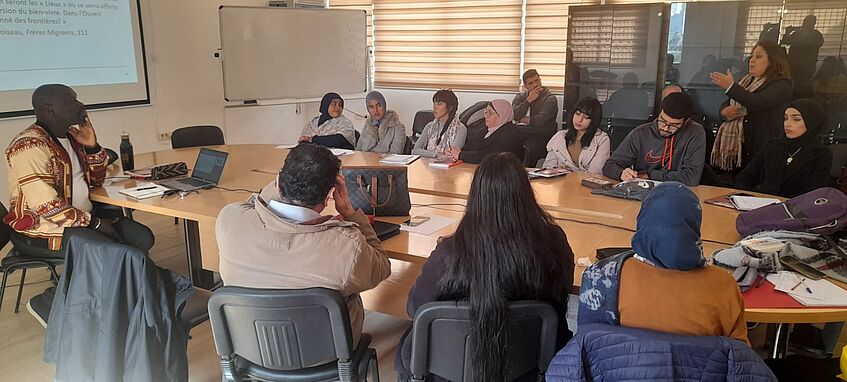
© Ben Amara & Tchokothe
From February 8th to February 17th, Rémi Tchokothe visited the University of Sousse. At the Centre d’Anthropologie/African Studies, he gave a public talk (L’Histoire et l’Actualité à Mayotte au Prisme de la Littérature), counselled Master Students in African Studies, carried out research on Francophone Tunisian Literature, and discussed possible areas of cooperation between the Department of African Studies of the University of Sousse and the Department of African Studies of the University of Vienna with colleagues such as Dr. Khaoula Matri and Dr. Ramzi Ben Amara. Since cooperating with a University in North Africa will be a new chapter for our department - and following the spirit of reciprocity - we hope to welcome a colleague from the University of Sousse in Vienna soon to continue the conversation.
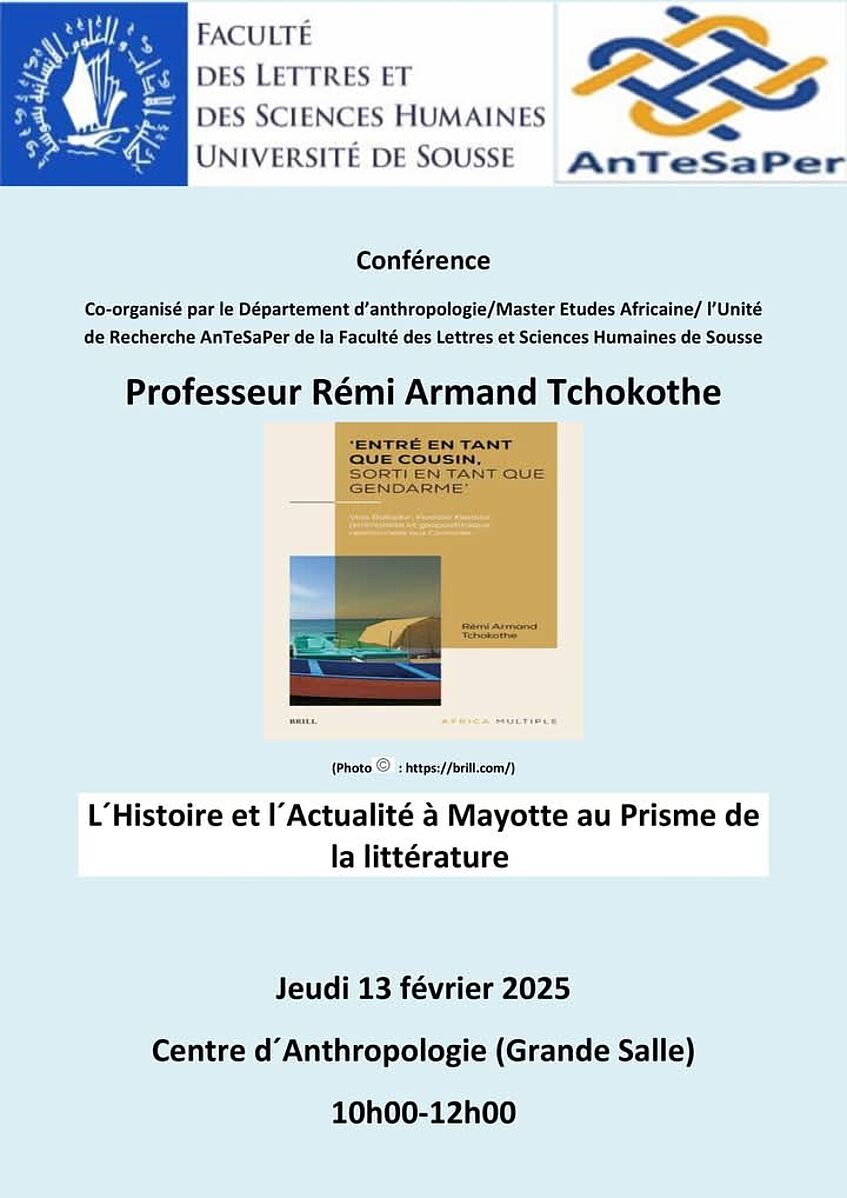
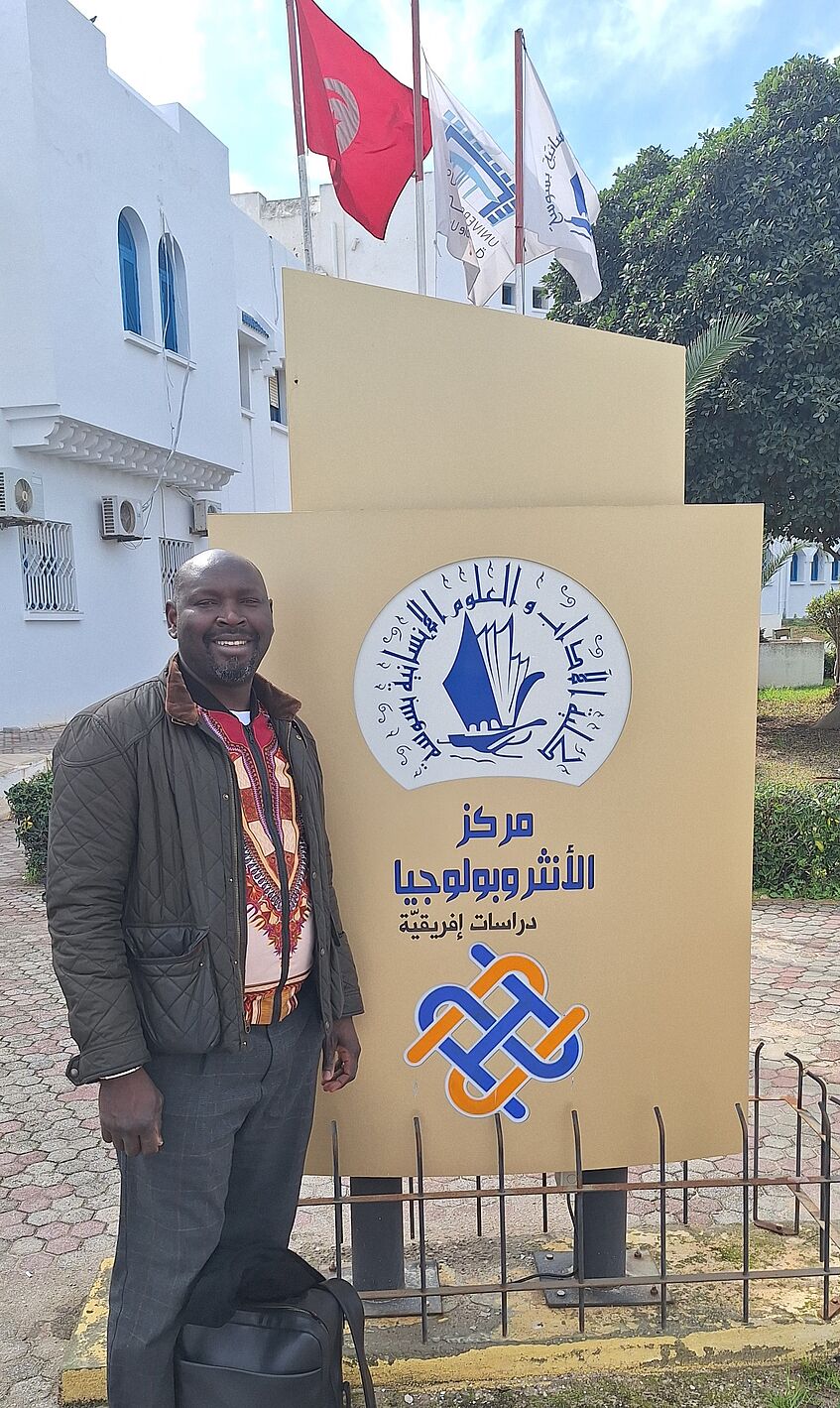
© Ben Amara & Tchokothe
Visit of a kindergarten group at our department
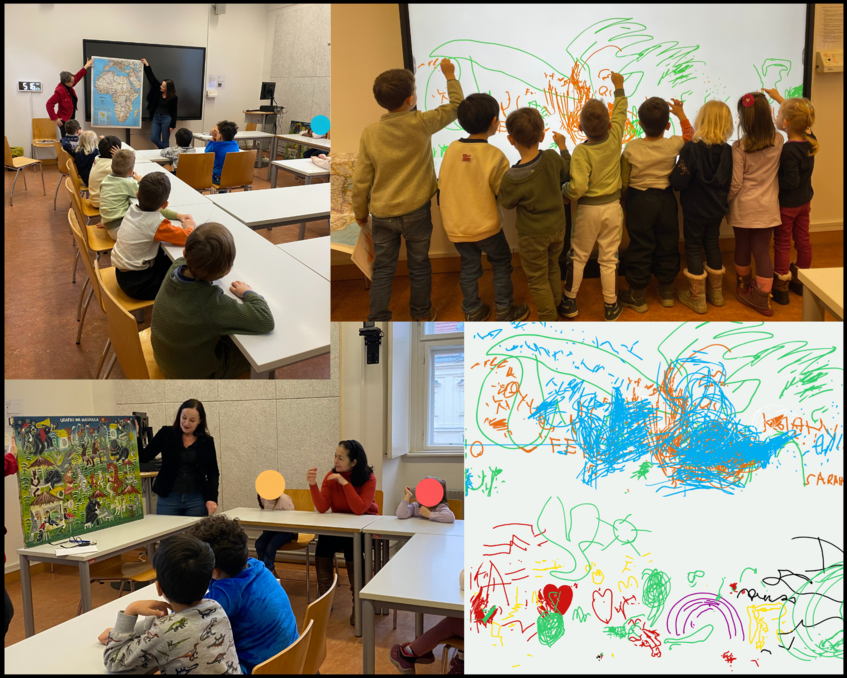
A lot actually happens during the semester break! We were delighted to welcome the integration kindergarten group from Schönbrunner Straße on February 13th! After a short tour where we were able to introduce our department, the children took part in a mini-lecture on Swahili. And left two smartboard artworks as souvenirs. THANK YOU!
Veranstaltungen anlässlich des 70. Jubiläums des Staatsbesuchs von Kaiser Haile Selassie in Österreich im Jahr 1954
Text: Birgit Englert und Dominik Frühwirth
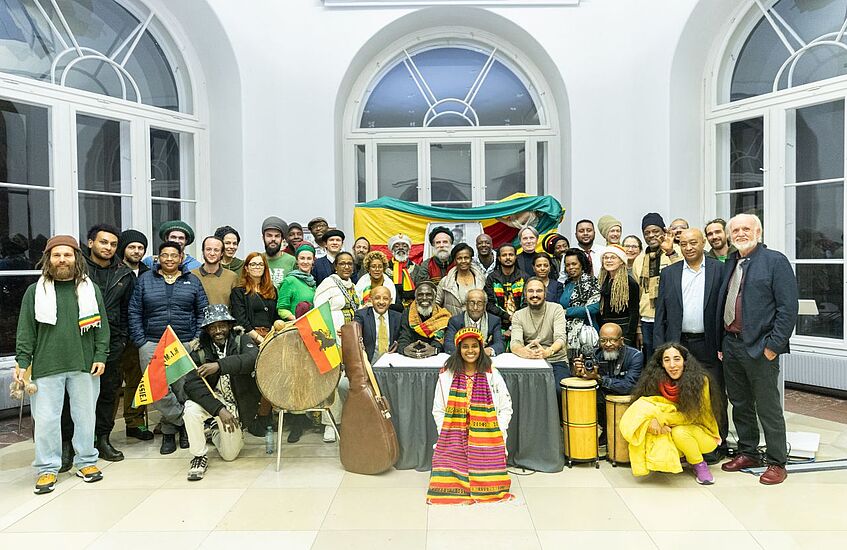
© Minitta Kandlbauer
Wir freuen uns, dass das 3-teilige Event unseres FWF-Projekts „Rastafari reasonings on Africa in historical perspective” (P 35987) zum ersten Staatsbesuch in der Zweiten Republik am 28. und 29. November 2024 sehr erfolgreich über die Bühne gegangen ist.
Am 14.12.2024 wurde in der Reihe „Religionen der Welt“ auf ORF 2 ein Beitrag darüber gesendet, der einen guten Überblick gibt. Der Beitrag „Als Haile Selassie Wien besuchte“ von Gundi Lamprecht kann hier nachgeschaut werden: https://on.orf.at/video/14255275/religionen-der-welt-als-heile-selassie-wien-besuchte
Hier auch nochmal ein kurzer Überblick über den Anlass der Veranstaltungen:
Anlass war der 70. Jahrestag des Staatsbesuchs von Kaiser Haile Selassie I von Äthiopien, der Österreich vom 28.11. bis 01.12.1954 besucht hatte. Dies war der erste Staatsbesuch in der Zweiten Republik, durch den die Souveränität Österreichs noch vor dem Staatsvertrag, der sechs Monate später folgen sollte, anerkannt wurde. Das ist umso bemerkenswerter, da Österreich 1936 als erstes Land vor dem Völkerbund die Invasion Äthiopiens durch die italienische Armee Mussolinis anerkannt hatte, die Äthiopien völkerrechtswidrig um seine eigene Souveränität brachte. Der König der Könige auf dem Thron König Davids und Nachfahre von König Solomon und der Königin von Saba unterstützte durch seinen Besuch nicht nur die österreichische Unabhängigkeit, sondern appellierte auch an das Bewusstsein der österreichischen Bevölkerung, indem er über 100.000 Schilling für die Armen Wiens und eine Einrichtung für Kinder mit Behinderungen spendete, die sein Besuch in den Fokus der österreichischen Medien rückte. Dem Stephansdom schenkte er ein äthiopisches Prozessionskreuz aus dem 13. Jhdt., der Zeit in der die Solomonische Dynastie in Äthiopien wiedereingesetzt worden war. Diese bedeutende Geste des ersten Staatsbesuchs signalisierte Österreichs Rückkehr in die Staatengemeinschaft nach dem Ende des Naziregimes.
Die Feierlichkeiten begannen am Donnerstag, 28.11.2024, mit einem Symposium in der Alten Kapelle am UniCampus der Universität Wien.
Einer Begrüßung durch Projektleiterin Birgit Englert, folgten einführende Worte von Dominik Frühwirth, der die inhaltliche Konzeption und Umsetzung der Veranstaltung geleitet hatte und auch die Moderation übernommen hatte.
Als ersten Sprecher durften wir Dr. Prinz Asfa-Wossen Asserate, Großneffe und Biograph von Kaiser Haile Selassie I, begrüßen, der über „Das Vermächtnis Kaiser Haile Selassies und das heutige Äthiopien“ sprach und eine Reihe von Fragen aus dem Publikum beantwortet.
Danach sprach zunächst Lisanu Tilahun, Diakon der Äthiopisch-Orthodoxen Kirche in Wien Schwechat, zum Thema „Strenghtening Diplomatic Ties and Shared Values“, gefolgt von Dipl. Ing. Hailu Yazachew, Generalsekretär der Äthiopisch-Orthodoxen Kirche in Wien Heiligenstadt, der die „Bedeutung des Staatsbesuchs von Kaiser Haile Selassie I für die Äthiopischen Gemeinden Österreichs“ thematisierte.
Dominik Frühwirth war es gelungen, Susann Schmid-Giovannini, die 1954 im Kindergarten Schweizerspende im Auer-Welsbach-Park mit Kindern mit Hörbeeinträchtigung arbeitete, ausfindig zu machen. Im Zuge der Vorbereitungen führte er mit ihr ein Gespräch über Zoom und stellte für das Symposium einen 10-minütigen Ausschnitt zusammen, in dem auch Material aus dem Wochenschaubeitrag von 1995 zu sehen ist, auf den Frau Schmid-Giovannini referiert. Das Video kann hier nachgeschaut werden: https://www.youtube.com/watch?v=jwZxBXoQ1pI
Bei einem anschließenden „Reasoning” über den historischen Kontext des Staatsbesuchs von Kaiser Haile Selassie I, tauschten unter der Leitung von Dominik Frühwirth, DDr. Werner Zips vom Institut für Kultur- und Sozialanthropologie der Universität Wien und Kooperationspartner unseres Projekts, sowie Dr. Prinz Asfa-Wossen Asserate Gedanken aus. Letzterer war kurzfristig für die erkrankte Regina Zodl eingesprungen, die sich im Rahmen ihres MA-Studiums der Globalgeschichte mit diesem Staatsbesuch beschäftigt und auch viel über ihre Forschungen zu erzählen gehabt hätte.
Weiters kam Uwe Banton Schäfer, Roots Reggae-Musiker aus Deutschland, der mit einer Reihe von Musikern aus der Rasta-Community in Wien das Symposium musikalisch begleitete, zum Reasoning dazu. Er berichtete über die Feierlichkeiten, die er Mitte November gemeinsam mit anderen anlässlich des ebenfalls 70-jährigen Jubiläums des Staatsbesuchs von Kaiser Selassie in Deutschland veranstaltet hatte.
Der äthiopische Maler Michael Hailu, der derzeit an der Universität für Angewandte Kunst in Wien studiert, sprach über seine Werke, die er eigens für das Symposium angefertigt hatte. Die Homepage seiner Galerie bietet einen Einblick in sein künstlerisches Schaffen: https://www.akkaproject.com/artists/michael-hailu/
Nach rund 5 Stunden ging das Symposium mit einem Vortrag von unserem Kooperationspartner Dr. Jahlani Niaah zu Ende, der über “Emperor Haile Selassie I and Modern Ethiopianism from the Caribbean” sprach. Dr. Niaah, Leiter der Rastafari Studies Unit an der University of the West Indies, Mona, Jamaica, war anlässlich des 70-jährigen Jubiläums nach Wien gereist und verbrachte insgesamt mehr als eine Woche an unserem Institut. Über die weiteren Aktivitäten während seines Besuchs berichten wir hier.
Prinz Ermias Sahle Selassie Haile Selassie, Enkel des Kaisers und amtierender Präsident des Äthiopischen Kronrats, musste aufgrund eines familiären Notfalls seine geplante Reise nach Wien leider kurzfristig absagen.
Das Symposium war multilingual: die Beiträge waren teils auf Deutsch, teils auf Englisch und einige Fragen aus dem Publikum wurden auf Amharisch gestellt und beantwortet.
In den Pausen konnten die im Laufe des Abends mehr als 100 Besucher:innen äthiopisches Injera mit vegetarischen Saucen und Kekse genießen sowie Kaffee, der im Rahmen einer äthiopischen Kaffeezeremonie von Tawu Amelework zubereitet wurde.
Die wunderbare Atmosphäre während der gesamten Veranstaltung kommt auch in den Bildern von Minitta Kandlbauer, die das Symposium und den Dankgottesdienst der äthiopisch-orthodoxen Kirchengemeinden im Stephansdom fotografisch begleitete, sehr gut zum Ausdruck. Sie hat eine umfangreiche Fotoauswahl zusammengestellt, die auf ihrer Homepage angeschaut werden kann: https://minittaphotography.pic-time.com/uACbbvYyorWVX
Wir sind auch sehr dankbar, dass Simon Inou von FreshVibes eine komplette Audioaufnahme des Symposiums gemacht hat, die hier zum Nachhören zur Verfügung steht: https://de.cba.media/687086
Neben der oben erwähnten Sendung in „Religionen der Welt“ vom 14.12.2024, wird auf ORF 2 am 29.12.2024 (12:30 Uhr) ein weiterer Beitrag zum Jubiläum in der Sendung „Orientierung“ ausgestrahlt werden. Am 06.01.2025 freuen wir uns auf einen Radiobeitrag auf Ö1 in der Sendung „Lebenskunst“ (7:05). Darüber hinaus werden 2025 auch Sendungen vom Africa Diaspora Cultural Radio and TV (ADC-RT) auf OKTO-TV von den Veranstaltungen rund um das Jubiläum berichten.
Am Freitag, dem 29.11.2024 um 9 Uhr ging das Programm für die Gäste des Projekts weiter. Dr. Prinz Asfa-Wossen Asserate, Dr. Jahlani Niaah, Uwe Banton, Michael Hailu sowie einige weitere Gäste aus Wien, besuchten gemeinsam mit Dominik Frühwirth und Birgit Englert den Kindergarten im Auer-Welsbach-Park, den Kaiser Haile Selassie I 70 Jahre zuvor besucht hatte. Wir wurden sehr herzlich empfangen und nach einem Vortrag über den städtischen Kindergarten damals und heute, besuchten wir eine Kindergartengruppe, die Dr. Prinz Asfa-Wossen Asserate mit selbstgemalten Geschenken willkommen hieß. Dr. Prinz Asfa-Wossen Asserate lernte außerdem Friedrich Frühmann und Leopold Schehswendter kennen, die damals Kindergartenkinder waren, als Kaiser Haile Selassie I den Kindergarten im Auer-Welsbach-Park besucht hatte.
Auch das Gästebuch, in das sich der Kaiser damals eingetragen hatte, konnte besichtigt werden und bei Kaffee und Kuchen kam es zu viel Austausch. Das setzte sich am frühen Nachmittag im Hotel Ambassador fort, das damals den ersten Staatsbesuch beherbergt hatte, und wo wir ebenfalls äußerst freundlich empfangen und bewirtet wurden. Dr. Asfa-Wossen Asserate bekam sogar die Originaldokumente vom Besuch des Kaisers vor 70 Jahren überreicht.
Gestärkt ging es anschließend in den Stephansdom, wo um 16:30 der Dankgottesdienst der Äthiopisch-Orthodoxen Kirchen Wiens mit dem Äthiopischen Prozessionskreuz aus dem 13. Jhdt., das Kaiser Haile Selassie I 1954 dem Stephansdom geschenkt hatte, begann.
Nach den Willkommensworten von Domdekan Univ. Prof. Dr. Rudolf Prokschi, leiteten Abba Gebremariyam Habtemariyam und Abba Woldeyohannes Atnafu gemeinsam die bewegende Feier, die allen Anwesenden unvergesslich bleiben wird. Rund 400 Personen feierten gemeinsam über unterschiedliche Gemeinden und Konfessionen hinweg.
Weihbischof Mag. Dr. Franz Scharl und Dr. Asfa-Wossen Asserate sprachen Dankesworte und ein Ave Maria, komponiert von Robert Werner und gespielt von „Clarivoce“ mit der Sopransängerin Monika Medek, rundete die Feierlichkeiten ab.
Weitere visuelle Eindrücke bietet die Fotogalerie von Minitta Kandlbauer: https://minittaphotography.pic-time.com/uACbbvYyorWVX
Damit war der Tag aber noch lange nicht zu Ende. Denn alle, die noch Kraft hatten, feierten am Abend im Nanang Club im 17. Bezirk bei Livemusik von Uwe Banton unterstützt von lokalen Musikern und Rastafari Drums. Da der Nanang Club der einzige afrikanische Club Wiens ist, war es dem Projekt wichtig, den ersten afrikanischen Staatsbesuch auch dort mit den äthiopischen und anderen afrikanischen Communities Wiens zu feiern. Ein kurzes Video der Feier gibt es bereits hier zu sehen: https://www.youtube.com/watch?v=u6U8DSAUAcA
Mehr Hintergrund über das Rastafari-Reasoning-Projekt, das seit Oktober 2022 am Institut für Afrikawissenschaften läuft, bietet dieser Beitrag der Podcast-Reihe des Instituts mit Dominik Frühwirth: https://afrika.univie.ac.at/forschung/uafrica-lab-the-podcast/
Birgit Englert und Dominik Frühwirth
Besuch von Dr. Jahlani Niaah am Institut für Afrikawissenschaften
Für das "Rastafari reasonings on Africa in historical perspective" Projekt (P 35987), das von 2022-2027 mit Förderung des FWF - Fonds zur Förderung der wissenschaftlichen Forschung läuft, war das Ende des Jahres sehr ereignisreich.
Unser Projektpartner Dr. Jahlani Niaah von der University of the West Indies, Mona, Jamaica, war zu den Veranstaltungen anlässlich des 70-jährigen Jubiläums des Staatsbesuchs von Kaiser Haile Selassie in Österreich im Jahr 1954 nach Wien gereist.
Seinen Besuch an unserem Institut haben wir für eine Reihe von weiteren Aktivitäten genutzt. Zum einen gab es mehrere projektinterne Besprechungen zwischen Dr. Niaah, Dominik Frühwirth (wissenschaftlicher Projektmitarbeiter) und Birgit Englert (Projektleiterin).
Neben seinem Vortrag im Rahmen des Symposiums am 28.11. hat Dr. Niaah am 3.12. zwei weitere Vorträge in Lehrveranstaltungen von Birgit Englert gehalten:
In der „Einführung in das methodische Arbeiten in den Afrikawissenschaften“ sprach er über „Rastafari reasonings as method“ und stieß auf äußerst interessierte und reflektierte Studierende.
Auch sein zweiter Vortrag an diesem Tag zum Thema „Rastafari as resistance“, den er im Rahmen der Vorlesung „Widerstand und Protest im 20. und 21. Jahrhundert- Fallbeispiele aus Afrika und diasporischen Kontexten“ hielt, stieß auf großes Interesse. Nicht nur zahlreiche Studierende waren sowohl in Präsenz als auch online dabei, sondern auch eine Reihe von Personen aus der Rastafari Community in Wien sowie aus der äthiopischen Gemeinde.
Beide Vorlesungen wurden aufgezeichnet und werden in Kürze auf dem YouTube-Kanal des Projekts zugänglich gemacht werden, auf dem bereits jetzt eine Reihe von Veranstaltungen der letzten zwei Jahre zu finden sind: https://www.youtube.com/@dominikfruhwirth1307
Am 2. Dezember hatten wir anlässlich des Besuchs von Dr. Niaah einen Stadtspaziergang „Afrikanisches Wien“ mit Dr. Walter Sauer organisiert, zu dem auch Kolleg:innen und lokale Kooperationspartner:innen des Projekts eingeladen waren. Aufgrund der niedrigen Temperaturen, wurde die Route etwas angepasst und so führte uns der Spaziergang in mehrere Kirchen sowie den Festsaal der Akademie der Wissenschaften. An allen Orten wurde eifrig diskutiert und Wissen ausgetauscht.
Nach einer Woche in Wien nutzte Dr. Niaah die Gelegenheit für einen kurzen Forschungsaufenthalt in Zypern bevor er für 2 Tage nach Wien zurückkehrte und wir die Planung der kommenden gemeinsamen Projekte (vor allem ein Herausgabeprojekt) fortführen konnten.
Wenn alles klappt, wird Dr. Niaah im kommenden Herbst während eines Sabbaticals für mehrere Wochen als Gastforscher an unserem Institut bleiben. Wir freuen uns darauf und sind dankbar für die bereichernde gemeinsame Zeit in den letzten Wochen!
Daniela Waldburger in Kairouan

Vom 26.-29.11.2024 habe ich an der Konferenz "Intersectionality in Discourse, Literatures, and Cultural Studies" an der Universität von Kairouan, Tunesien, teilgenommen. Die Forscher:innen aus Algerien, Türkei, Uruguay, Finnland, Großbritannien und Österreich wurden von einer äußerst hilfsbereiten und interessierten Studierendengruppe bereits am Flughafen Tunis in Empfang genommen und persönlich ins 170 km entfernte Kairouan begleitet. Dort trafen wir auf unsere tunesischen Kolleg:innen, etwa von den Universitäten Kairouan, Sfax, Sousse, Tunis um drei unvergessliche Tage zu teilen.
Selten habe ich an einer Konferenz so viele spannende (und gut vorbereitete!) Vorträge gehört, so viel Neues gelernt und engagierte Diskussionen miterlebt. Der interdisziplinäre Hintergrund der Teilnehmer:innen, die herzliche Gastfreundschaft, das große Interesse der Studierenden und Kolleg:innen an Austausch und Kooperation haben dazu beigetragen, dass Austausch gelebt und nicht nur eine Präsentation des Eigenen im Vordergrund stand. Was für ein Privileg.
شكرًا
Shukran!
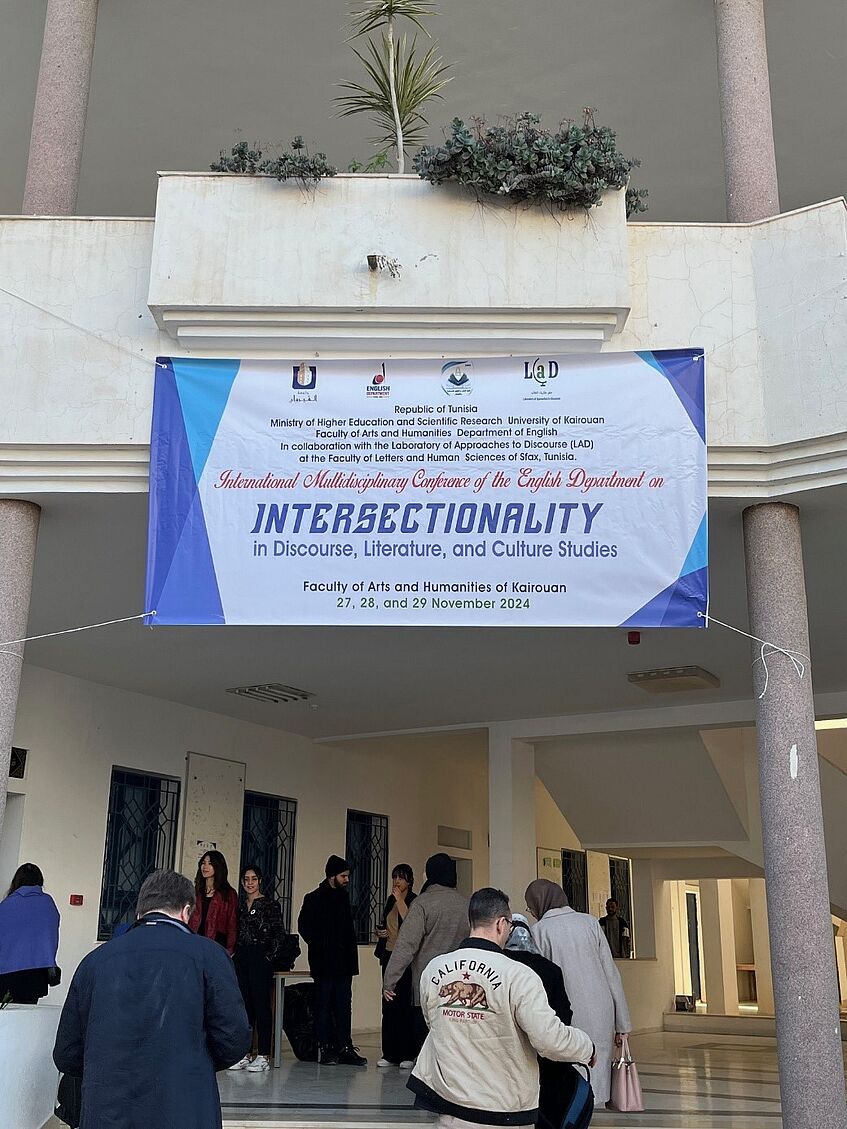
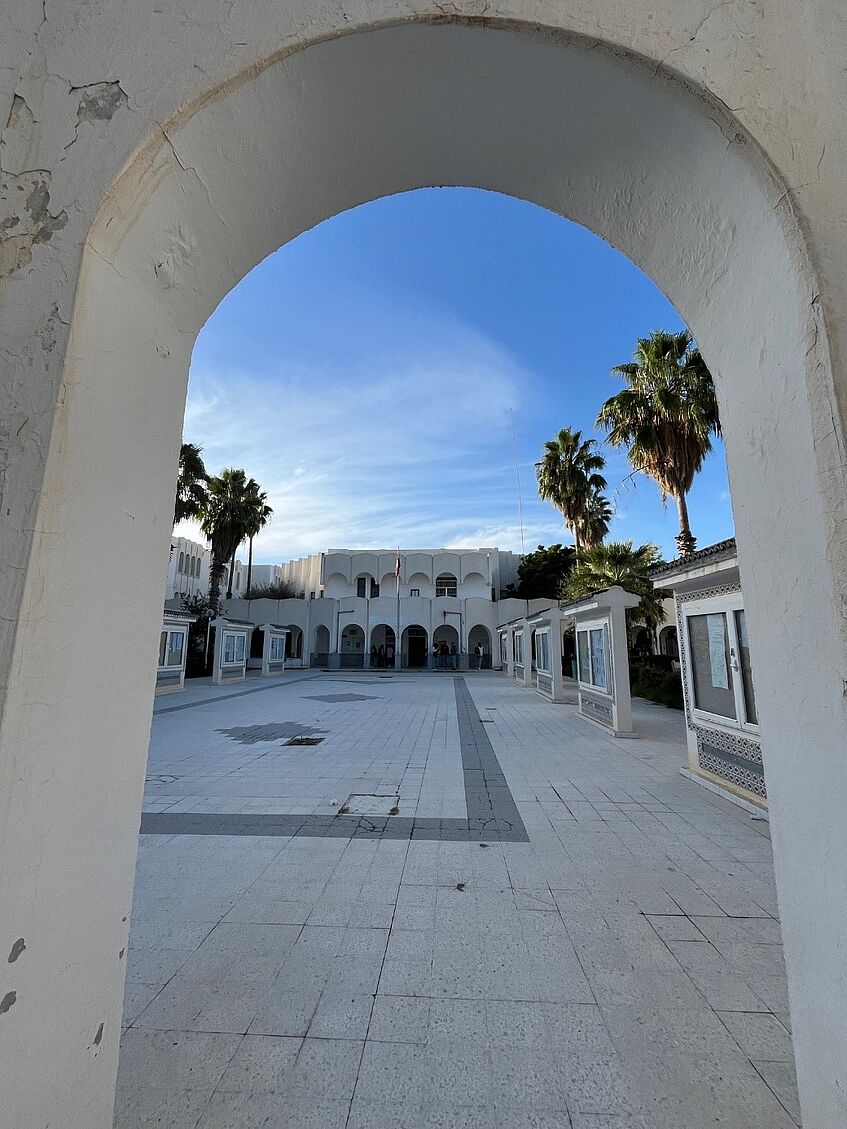
Kirsten Rüther at the University Coimbra
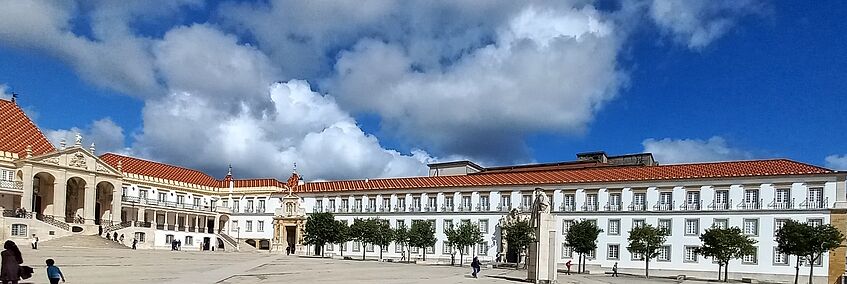
Universität Coimbra. Der Hof befindet sich an der höchsten Stelle der Stadt.
Erasmus macht’s möglich. Im September 2024 hatte Kirsten Rüther Gelegenheit, knappe zwei Wochen an der Universität Coimbra zu verbringen. Dort konnte sie unter anderem mit Studierendengruppen zweier Kollegen, den Kursen von Dr. Hugo Gonçalvez Dores und Prof. Miguel Bandeira Jéronimo, über Ansätze in der Kolonialgeschichte, forschungswürdige Themen und Erfahrungen im Archiv sprechen. Die Studierenden waren spitze. Sie suchten das Gespräch in englischer Sprache, und sobald die Interventionen dazu gedacht waren, nicht allein mit der Dozentin den Austausch zu suchen, ging es auf Portugiesisch untereinander weiter. Das war so lebendig!
Die Universität Coimbra gehört zu den altehrwürdigen in Europa. Gegründet an der Wende vom 13. zum 14. Jahrhundert, verfügt sie über repräsentative Räume, die besonderen Anlässen vorbehalten sind, und über die weltberühmte, barocke Joanina-Bibliothek, in der das Fotografieren allerdings nicht erlaubt ist. Zahlreiche Gebäude und vor allem deren Ausstattungen stammen aus der Zeit des Estado Novo. Die enge Verwobenheit zwischen Universitätsfächern der Faculdade de Letras oder auch der Mathematik mit der Bedeutung kolonialer Geschichte im nationalen und wissenschaftlichen Selbstverständnis sind noch heute von den Wandbildern in den Eingangsbereichen mancher Fakultäten ablesbar.
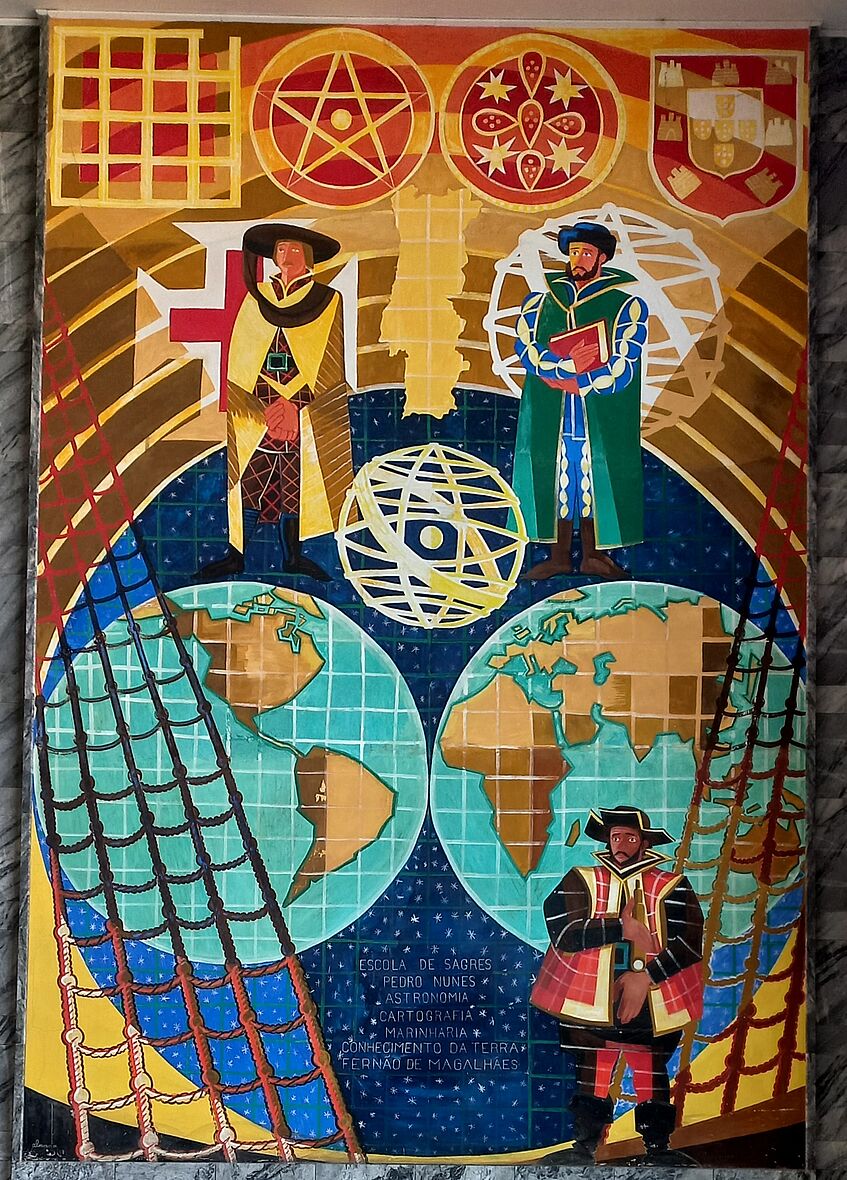
Die Fakultät für Mathematik begrüßt Studierende mit diesen zwei Wandbildern, die die Bedeutung von Wissenschaft und kolonialer Nation eng miteinander verquicken.


In diesem Saal werden bei feierlichen Anlässen Diplome und Zeugnisse überreicht.
Mohamed Mbougar Sarr Visited the Department of African Studies on Sunday
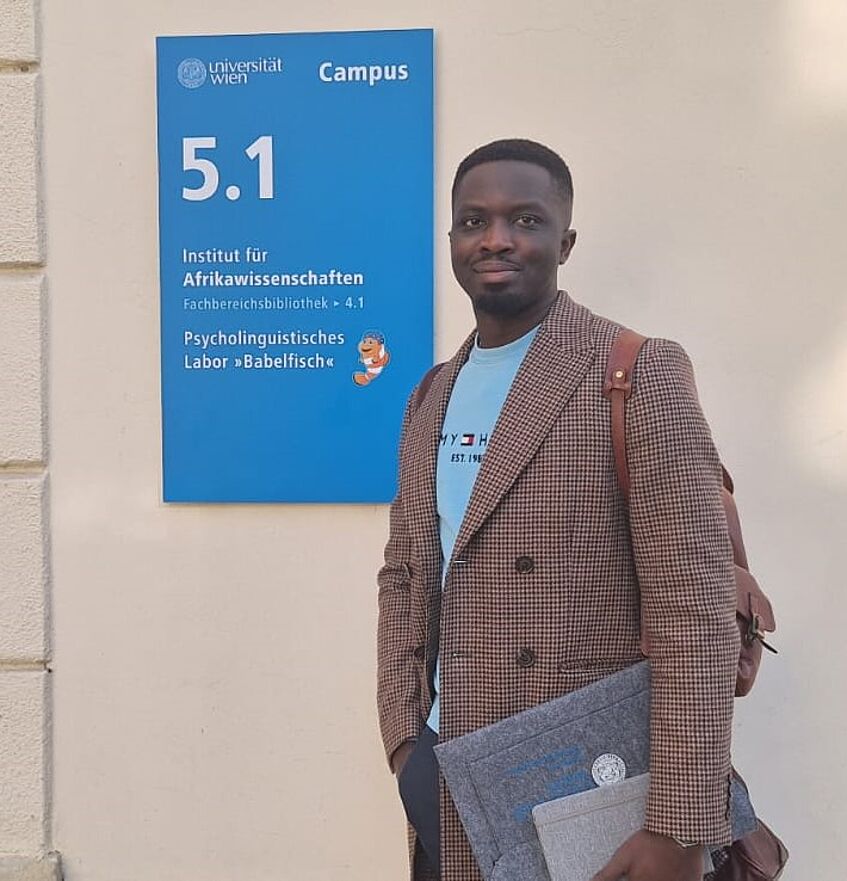
© Rémi Tchokote, Mohamed Mbougar Sarr
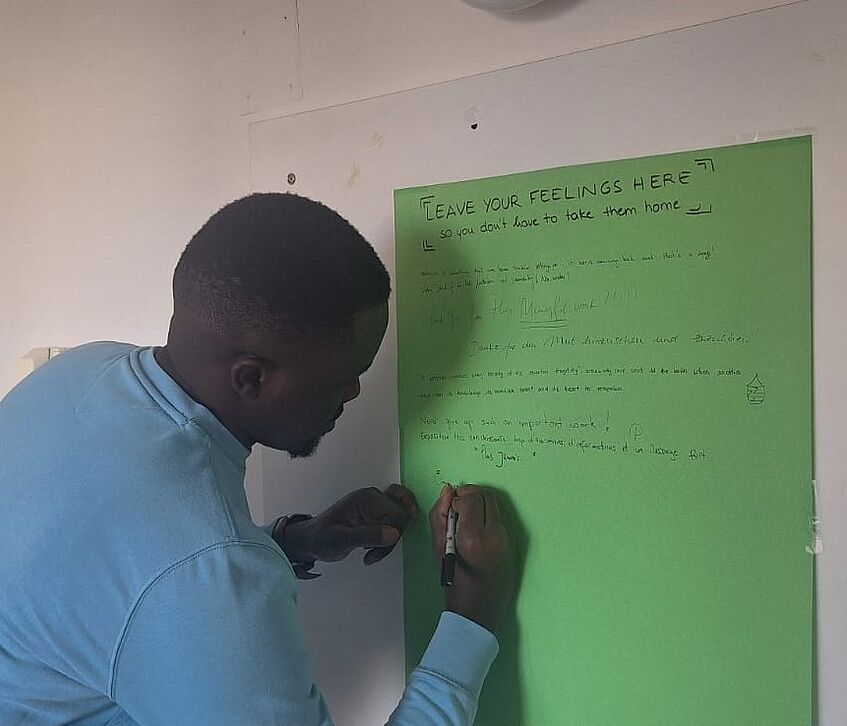
© Rémi Tchokote, Mohamed Mbougar Sarr
After participating in the fourth edition of the transcontinental literary festival Weltwortreisende in Graz (festival Weltwortreisende ; curator: Fiston Mwanza Mujila), Mohamed Mbougar Sarr came to Vienna on October 19th following an invitation by the Institut Français d’Autriche to present his novel ‘La Plus Secrète Mémoire des Hommes’, Prix Goncourt 2021, on the occasion of the publication of the German translation of the book (Die Geheimste Erinnerung der Menschen, translation by Holger Fock & Sabine Müller, Penguin Verlag, 2024).
It is hard not to get attached to Mohamed Mbougar, an endearing and caring person. He has received several prestigious literary prizes but is aware of the price he must pay for getting them. Mbougar Sarr is a generous soul who hates industrial signings and takes the time to chat with readers before signing their books.
‘We should never get too close to the artists we love. We should admire them from a distance, in silence: that is the elegance we should have”, says Musimbwa, one of the many writers-characters, searching for the mysterious writer TC Elimane in The Most Secret Memory of Men (translation by Lara Vergnaud, Other Press, 2023).
Well, never mind! I accept my lack of elegance in having gone to Graz before the exchange I was to have with him in Vienna the next day, and in having made the journey by train from Graz to Vienna with this passionate sharer and man of great curiosity. This brilliant writer found time on a Sunday morning, between his hurried breakfast and his departure for the airport, to drop in at the Department of African Studies to visit the exhibition (exposition) a group of students had put together on literature and the issues of genocide and memorycide against the Tutsis in Rwanda in 1994. The commentary he left is a tribute to the students for this unique work.
Mohamed Mbougar Sarr is the author of a short story, La Cale (2014, Prix de la jeune Écriture Francophone Stéphane Hessel, available at : La Cale | CADRANS ) and four novels: Terre Ceinte (Présence Africaine, 2015, Prix Ahmadou-Kourouma, Grand Prix du Roman Métis), Silence du Chœur (Présence Africaine, 2017, Prix Littérature-Monde - Étonnants Voyageurs), De Purs Hommes (Philippe Rey/Jimsaan, 2018) and La Plus Secrète Mémoire des Hommes, already translated into 32 languages.
Listen to the whole interview of Mohamed Mbougar Sarr by Rémi Tchokothe on Spotify (original French with German translation)
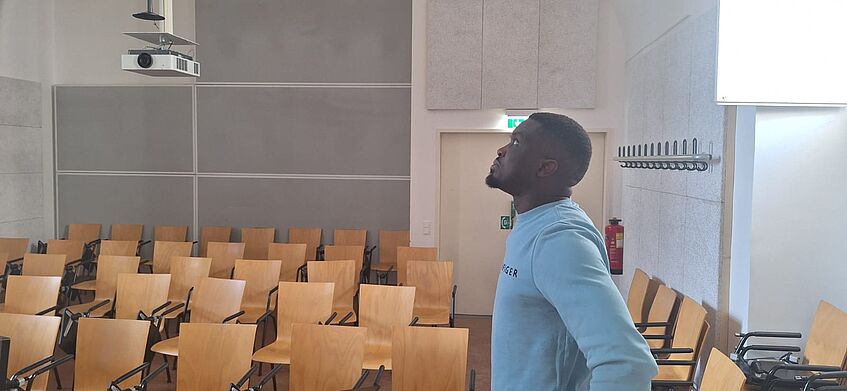
© Rémi Tchokote, Mohamed Mbougar Sarr
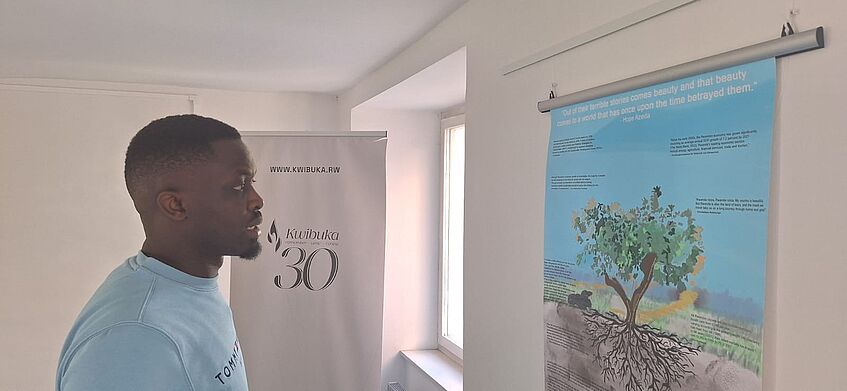
© Rémi Tchokote, Mohamed Mbougar Sarr
Kirsten Rüther in the archives of the Lutheran World Federation (Geneva)
In August 2024, Kirsten Rüther was able to visit the archives of the Lutheran World Federation in Geneva. There are records of an ecumenical radio project whose main broadcasting station was located in Addis Ababa in the 1960s and 70s. Locally produced radio programs with cultural, educational and religious content from Cameroon, South Africa, Tanzania and Ethiopia were sent there on audio reels and broadcast from there “back” to the regions of origin. There was great euphoria about using the modern medium of radio to tap into new mass audiences in Asia and Africa. Financial support was mobilized in European countries such as Norway, Sweden and Germany, but above all from Lutheran congregations in the USA.
The audio reels cannot be found - at least for the time being. However, in addition to the usual written records, there are numerous photos that were taken for public relations purposes and deposited in various archives. They circulated from place to place. In Geneva, for example, there is the archive of the Lutheran World Federation. In Norway, photos of “radio work” can be found in the Mission and Diaconia Archives in Stavanger. It is not yet clear which other archives might have material.
I would be delighted if a project could be developed on the basis of these initial findings - with cooperation partners here and there.
Magdalena Fröhlich from African Studies is currently supporting me actively with the transcription and the creation of an image database.
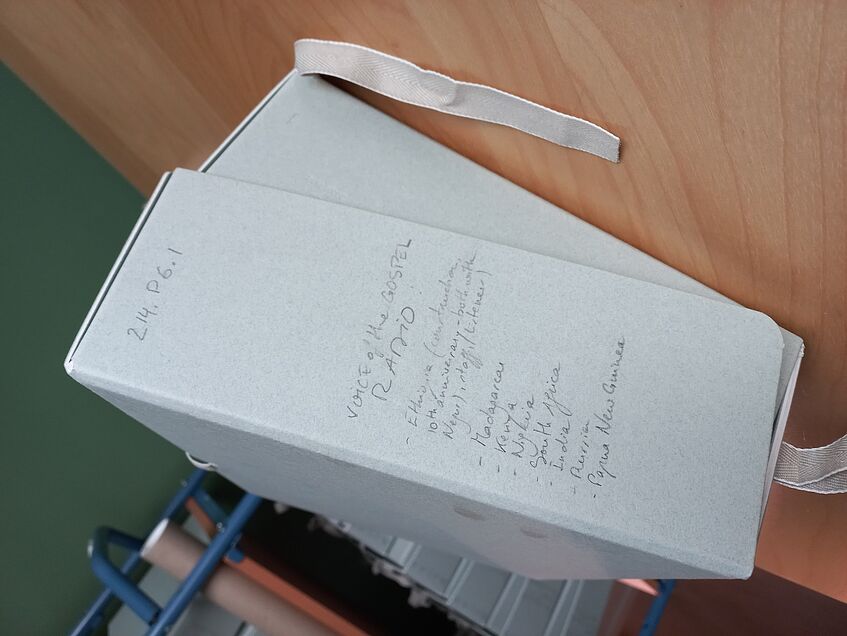
Archivbox mit Fotos zum Radioprojekt im Archiv des Lutherischen Weltbundes in Genf. Fotografin: Kirsten Rüther
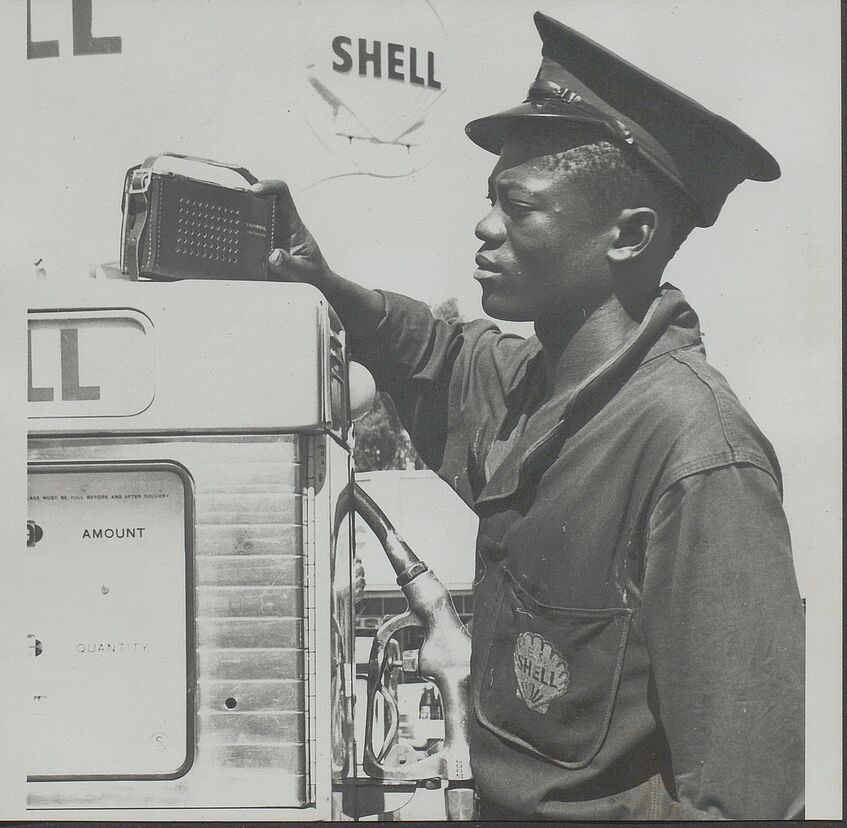
Tankwart an einer südafrikanischen Tankstelle, c. 1962. Fotograf: Jon Egil Ofstad. Abbildung mit freundlicher Genehmung des Misjons- og Diakoniarkivet, Vitenskapelige Hogskole, Stavanger
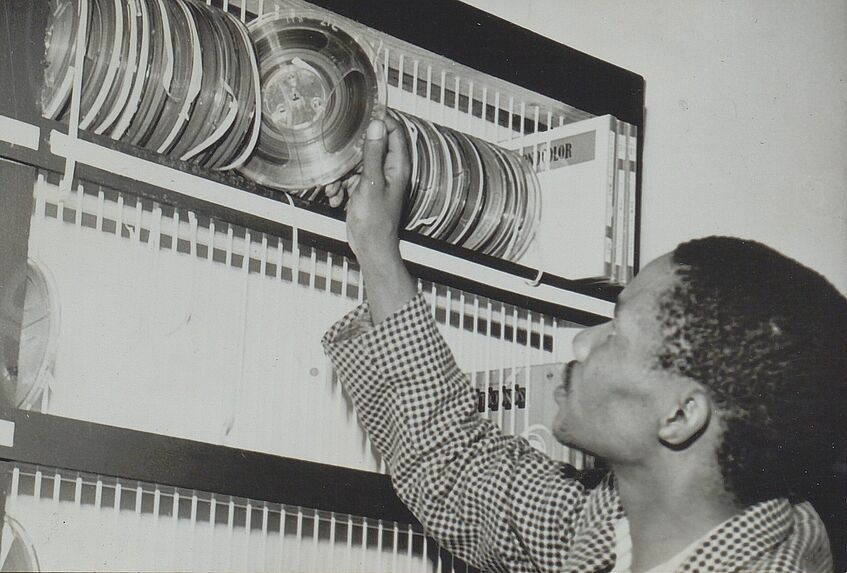
Mitarbeiter aus dem Studio St. Ansgar in Roodepoort, Südafrika. Fotograf: Jon Egil Ofstad. Abbildung mit freundlicher Genehmung des Misjons- og Diakoniarkivet, Vitenskapelige Hogskole, Stavanger.
Visiting Lectureship in Mayotte
Since 2016, Rémi Tchokothe has been invited yearly as a visiting lecturer at the Université de Mayotte, Comoros Archipelago. This year, from September 17 to September 21, he taught the course: Le Swahili: un Médium International. The 45 participants could learn about the history of the development of the Swahili language and literature and reflect in simulated language and literature committees on possible strategies to make their languages of primary socialisation Shimaore (Mayotte), Shindzuani (Anjouan), Shimwali (Mohéli), Shingazidja (Grande Comore), and Shibushi (Madagascar) more relevant to their societies and international.
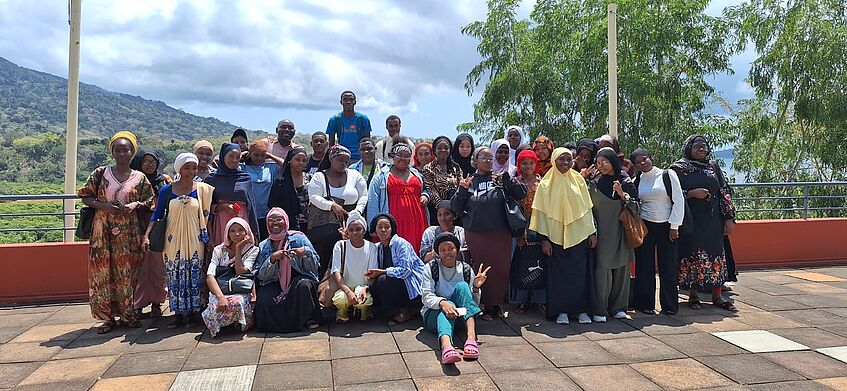
Visiting Lectureship in Mayotte - Gallery
VAD Young Scholars Award 2024 for Immanuel Harisch
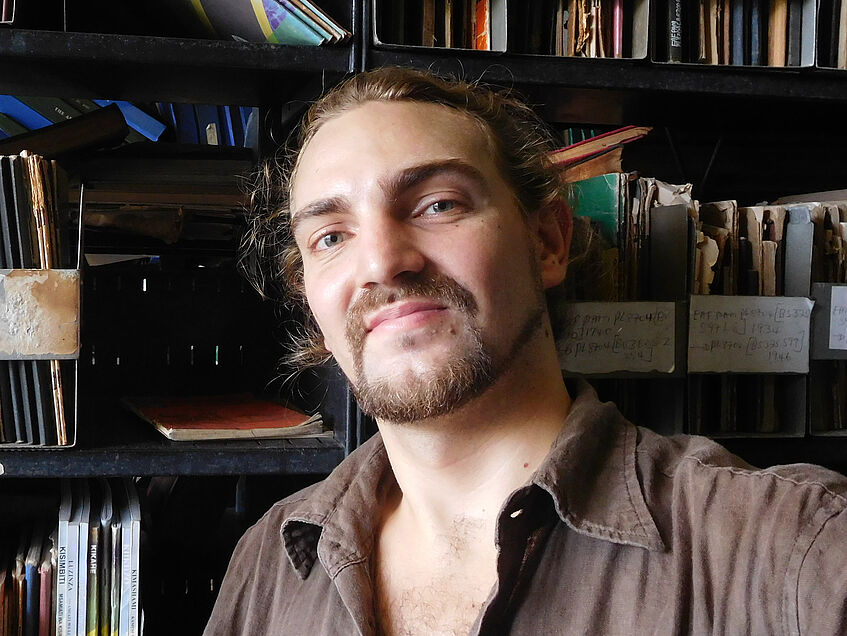
Immanuel Harisch, long-time managing editor of the journal Stichproben at our department, former pre-doc at the research platform “Mobile Cultures and Societies” and currently post-doc in an FWF project on Zambia's relations with Yugoslavia, will be awarded the VAD Young Scholars Award 2024 for his dissertation on the African trade union movement in the global cold war. The prize will be presented at the VAD conference Reconfigurations in Africa - and in African Studies on October 1 in Bayreuth. Our warmest congratulations.
International Cooperation at the Rencontres Des Études Africaines en France
During the 8th Rencontre Des Études Africaines en France (REAF) that took place at the Université Côte D’Azur-Nice, France, from July 1 to July 4, Alison Posey (Duke University, North Carolina) and Rémi Tchokothe (University of Vienna) co-chaired a panel titled: Poets of Panglobal Pluridentities: Afrodiasporic Writers in Austria and Spain.
The REAF is a biennial conference bringing together researchers in political science, geography, sociology, anthropology, film studies, history, linguistics, African Literatures, etc. It is the largest platform for discussing African Studies research in France. In terms of research, Alison Posey has applied for a post-doctoral fellowship to carry out a research project at the University of Vienna under my supervision.
Rémi Tchokothe
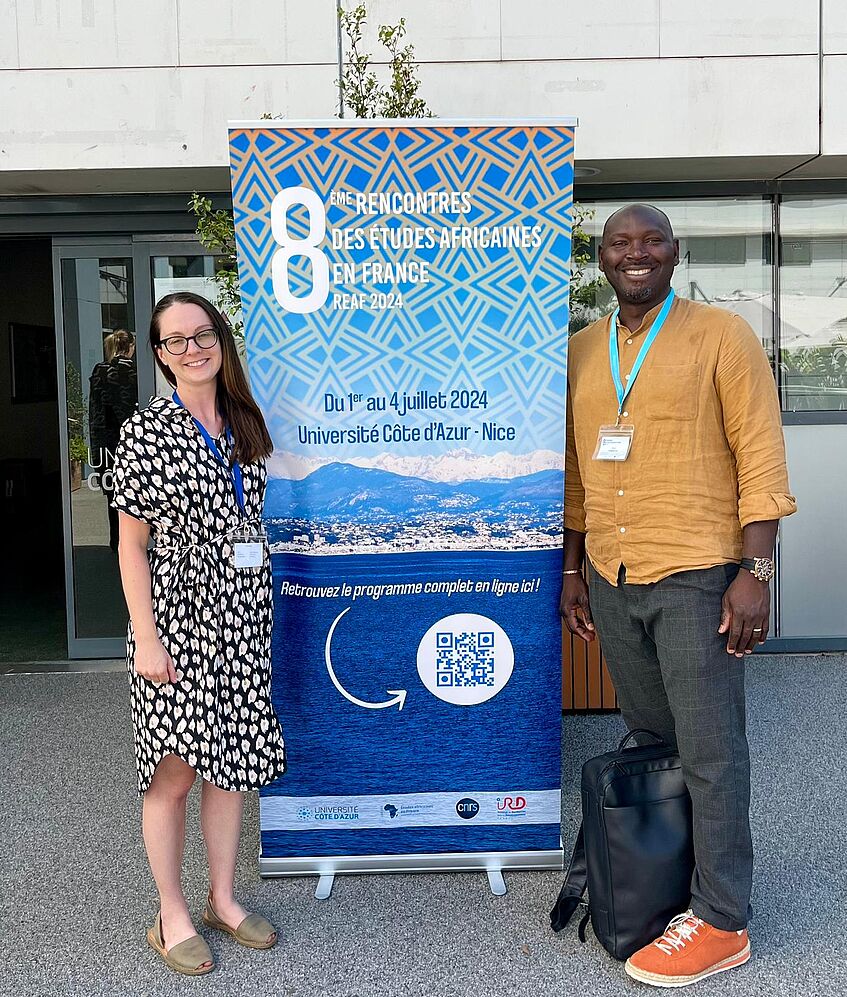
© Alison Posey & Rémi Tchokothe
Poetry Slam by the Vienna African Writers Club
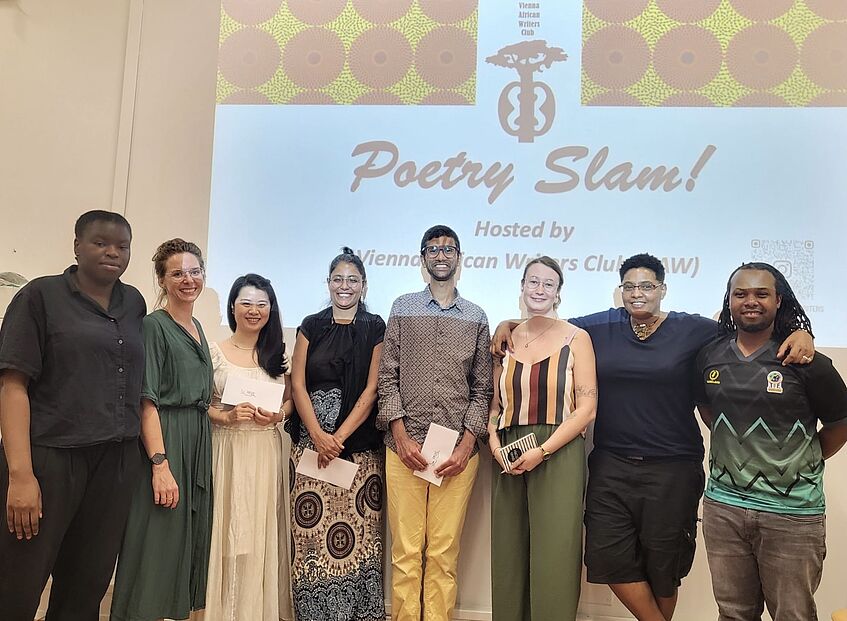
On 25 June, 2024, the Vienna African Writers Club (VAW), which was founded by Prof. Adams Bodomo, hosted a Poetry Slam and Open Mic evening at the Department of African Studies at the University of Vienna. In three rounds, four poets performed their mesmerising, thought-provoking, and also humorous poetry and shared their ideas about the world, language, love, injustice, and all aspects of the human condition. The established poets Laurène Southe, Mihret Kebede, and Mfilinge Nyalusi formed the jury, attentively listened to all performances, and chose the winning poets. Congratulations to Yingliang Zhang, Manu Sharma, Rastagar Munir, and Anna-Katharina Garger on your amazing poems. At the Open Mic part of the evening, every member of the audience was invited to come on stage and perform their own poetry or share another particular meaningful piece of literature. This Open Mic had a special focus on Poetry as Solidarity and Poetry as Resistance.
The next VAW Poetry Slam and Open Mic evening will be hosted in the winter term 2024.
Report: Elisabeth Knittelfelder
Foto credits: Mary Bodomo
SLAVERY PAST, PRESENT & FUTURE: 8th Global Meeting

From Thursday to Saturday, June 13 to 15 2024, the African Studies Department hosted the 8th Meeting of the Global Slavery Network dedicated to the topic “Slavery Past, Present & Future”. An illustrious number of participants from all over the world with backgrounds in various disciplines – from legal and business studies to studies in history, literature and arts, from African studies to studies in politics and the corporate business sector – all eager to meaningfully engage in inter- and transdisciplinary dialogue met for an intense three days of communication and discussion. The event kicked off with a guided City Tour, where Walter Sauer of SADOCC led the group of almost 30 participants through Vienna’s first district showing and explaining traces of Africa’s presence in Austria’s history along the way. A wine reception for all participants followed on Thursday evening. The next two days a tight conference schedule provided about 23 different paper presentations, always followed by lively discussions, on a broad range of topics. They were concerned with different forms of “slavery” in various places at various times (in particular the US, Gold Coast, Iran, Scotland and Portugal got specific attention); others were questioning and looking at the interface between “slavery” and human trafficking as well as sexual exploitation and victimization; still another set of papers engaged with manifold kinds of legacies and memorization of “racial slavery” in various settings (for instance, in literary texts, arts and museum, business corporations, but also in particular localities and families even).
The joint dinner at the old Heurigen 10er Marie on Friday evening, only strengthened the bond between the participants, who interacted with each other throughout the conference in an exemplary spirit of mutual respect. For the guests from abroad it also was a welcome opportunity to taste local Austrian foods. Ulrike Auer, the department’s secretary, and Alexander Rummel, a student at our African Studies department, did a splendid job in providing everything necessary to bring the participants through the days (from coffee, tea and water to snacks, sweets and food for lunch). The two of them were supported by this meeting’s joint organisers Ulrich Pallua (University of Innsbruck) and Arno Sonderegger as best as they could, but without Ulli and Alex the conference would not have gone nearly as smoothly as it did: High shall they live, high! Most participants in this year’s expanded meeting of the Global Slavery Network travelled from the US, the institutions with which they are affiliated include Johns Hopkins University, Indiana University, Boston University, Louisana State University, Howard University, University of South Carolina, Augusta University and University of Nebraska-Lincoln. Others came from various European countries: Italy (University of Padua), Portugal (University Colbra), Britain (University of Hull), the Netherlands (Vrije Universiteit), Germany (University Paderborn) and Austria (Universities Innsbruck and Vienna) as well as from Brazil (University of Coimbra). It was both an honour and a pleasure to host this interdisciplinary event at University of Vienna’s Department of African Studies, which brought open-minded people from many different walks of life into conversation and exchange. Thanks to the Department and the Faculty for their support. The conversation continues.
Arno Sonderegger
SLAVERY PAST, PRESENT AND FUTURE - Gallery
South Africa @ 30 – Looking back and forth

Cartoonist Wilson Mgobhozi, published in City Press, 11 Feb 2024, www.citypress.co.za – a recommendable read anyway to know what’s up in South Africa.
Wilson Mgobhozi on what he wanted to comment upon (28 May 2024):
When the president of the Republic of South Africa, Cyril Ramaphosa, took over from former president Jacob Zuma he reassured the citizens that they could have faith in him by saying “THUMA MINA”, in isiZulu language meaning “SEND ME.” He will be remembered to many South African people for making a mockery of himself on television during one of his “family meetings” on Covid-19 updates, where he struggled to demonstrate the correct way to wear the mask – covering his eyes instead. The majority of the people have lost confidence in him and the ANC for having failed to live up to their promises of three decades. The more things change, the more they stay the same… That’s SONA (State of the Nation Adress) for you!
May 2024 – this is an important moment in South Africa's past and present. It looks more than likely that this moment will matter for the country's future. Not only has it been 30 years since the democracy's first free elections. On 29 May South Africans will determine who will govern for the next few years. A lot has changed since 1994 and there are great anxieties, frustrations and a certain amount of weariness that feed into this year's elections.
Against this backdrop, a number of classes from our Department are dealing with South African issues in this semester. On 6 May, three of these classes came together to exchange work in progress and knowledge gathered through the first few months of the semester. Some had read the Jonny Steinberg’s portrait of Winnie and Nelson Mandela, while others were enmeshed in the process of finding out how over the past 30 years historiographical themes and approaches to long-standing themes had changed. A third group had engaged in how the history of African Studies was implicated with research and activism in the South African academic landscape. We made a fine team!
It was a special pleasure to have Prof. Lize Kriel from the University of Pretoria with us for the whole day. Participating in an Erasmus Staff Mobility Exchange Programme that connects her and our universities, she spent a few days at our Department, and she explained in much detail what the social, academic and political situation looks like in South Africa at the moment. She also took great interest in all the students’ ongoing projects and assignments. Thanks for all the commitment!
The day was full of activities. After learning from Karlheinz Mörth and Nkosinathi Dlamini greetings in isiZulu, we had many discussions about our work. We also talked about physical items the group members had brought from home. How fascinating it was to learn that a story went with each item, and it was enlightening to see how many of the group linked in to South Africa through others, friends and family for instance, even if they themselves had never been there themselves.
As we had a full programme and as conversations were going on and on, we did not really talk in detail about a variety of cartoons which over the past few months had appeared in South African media. Cartoonist Wilson Mgobhozi, whose work is reproduced about and who also provided us with an explanatory comment, kindly allowed us to reproduce at least one of his interventions in ongoing South African debates. This teacher just loves his work. We need strong visual voices!

Students immersed in deep thinking
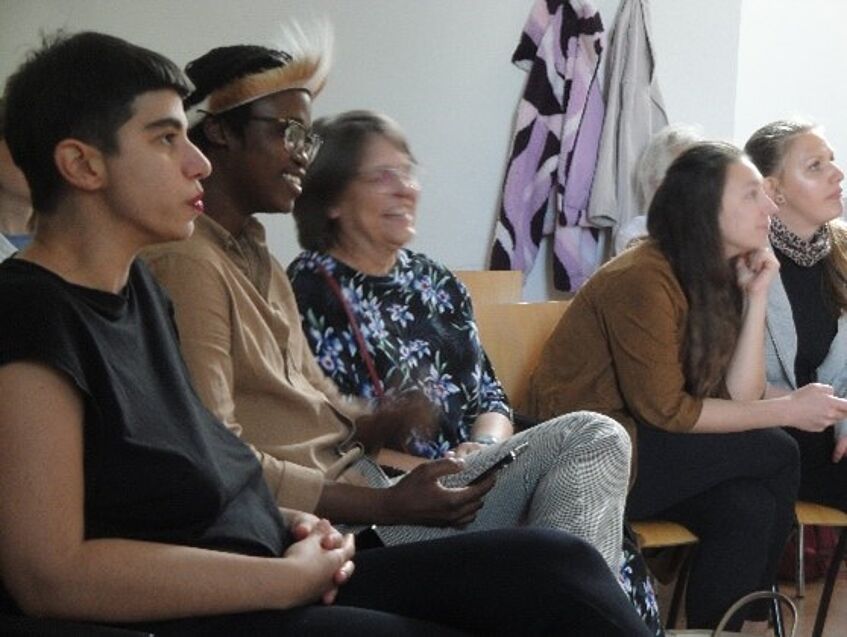
Difficult to capture Prof. Kriel – she was very much in motion. Thanks for joining us!

Getting feedback on topics to be pursued in final essays
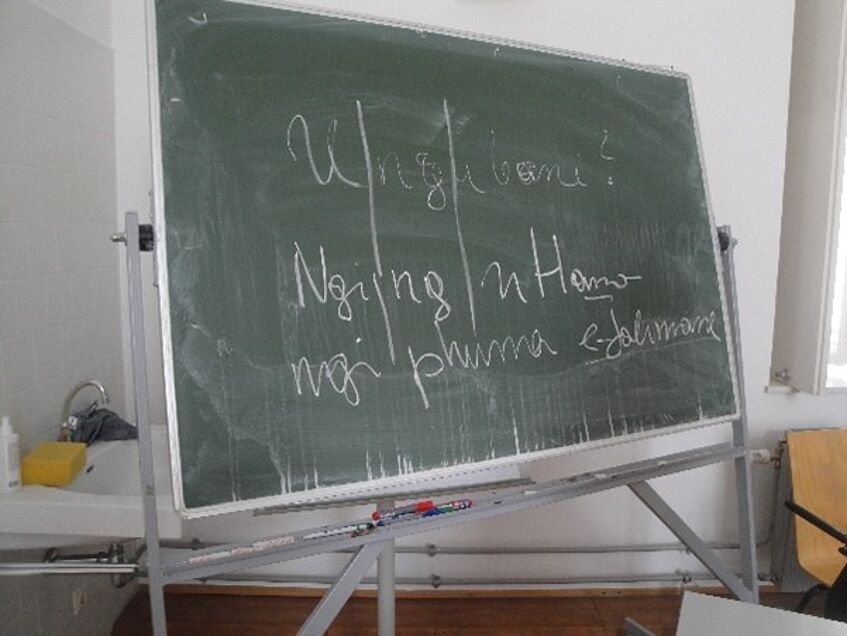
First steps in isiZulu: Greetings
Meet Alexander Angsongna, post-doc researcher in linguistics at our department

My name is Alexander Angsongna /alɪɡzandə ǎŋsʊ̀ŋná/ (Alex for short). I am from Sombo in the Nadowli-Kaleo district of Upper West Region, Ghana. I have been a postdoctoral research fellow at the Department of African Studies (Linguistics & Literatures) since September 2023.
I hold a bachelor’s in Linguistics and English from the University of Ghana, a masters in Linguistics from the University of Western Ontario, London, Canada and PhD in Linguistics from the University of British Columbia, Vancouver, Canada. My master’s research explored complex sentences such serial verbs, multi-aspects and coordination in Dagaare (Mabia language; Ghana/Burkina Faso) and my PhD dissertation examined some aspects of morphology and phonology in Dagaare (e.g., vowel harmony, tone, inflectional morphology).
My current teaching focuses on two main areas: (i) language diversity involving phonological patterns, morphological and grammatical structures, language in context, study of meaning and many more (ii) Language and politics in Africa which encompasses the language of politics (e.g., political discourse, language of political campaigns, language of persuasion, language of insults etc.) and the politics of language (e.g., language policy, language development, promotion etc.).
My current research is a continuation of my PhD research but goes beyond Dagaare – investigating phonological morphological and syntactic patterns in Mabia languages (spoken majorly in northern Ghana). My research also extends to language documentation through folktales and proverbs, language and politics with much focus on Africa. For more information about my research, please visit https://sites.google.com/view/alexanderangsongna/home
When I am away from linguistics, I like to watch or play football!
Visit the Student’s Exhibition in Commemoration of the Genocide Against the Tutsi in Rwanda (1994)
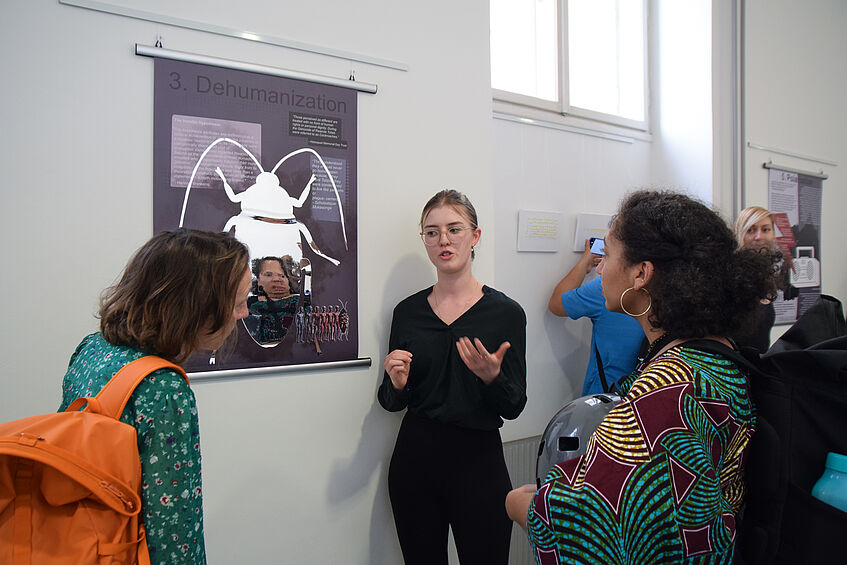
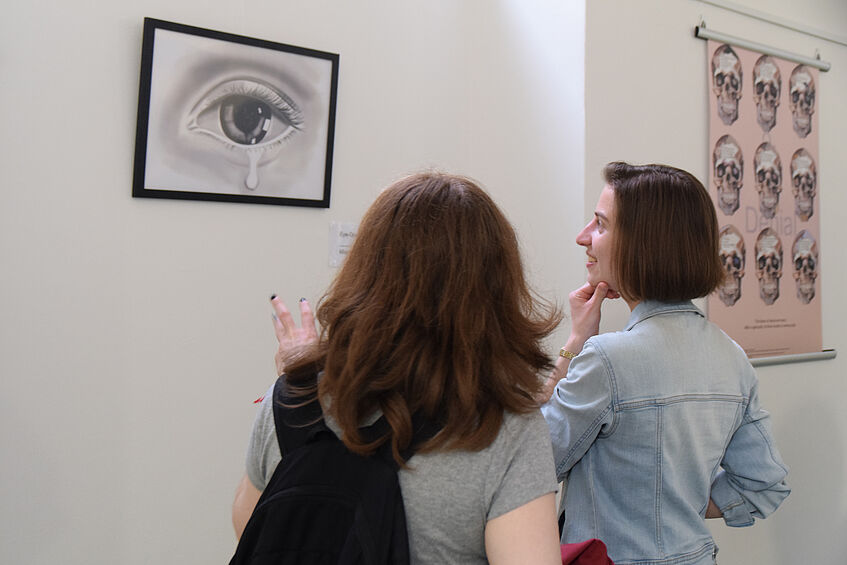
To commemorate the 1 million people who fell victim to the Genocide against the Tutsi in Rwanda in 1994, Antonia Beck-Mannagetta, Magdalene El-Shamy, M. Deniz Kanbalakoglu, Josephine Löschner, Laura Steindorf, Isabella Tatschl, Rob Tibke, and Katharina Wiesmayer, all students from the course Rwanda 1994: Humanity’s Collective Memory(cide) 30 Years Later, taught at the Department of Comparative Literature, created an exhibition that was opened at the Department of African Studies on Tuesday, April 9, 2024. The opening featured a moment of silence, poetry reading, music, a guided tour through the exposition, words of gratitude by Ms. Betty Dusenge, second counsellor to the Rwandan Ambassador in Switzerland, who came to Vienna for this important commemoration, and conversations on our shared history.
I wish to express my heartfelt thanks to everyone who contributed to this commemoration and everyone who came to the opening. I invite people who could not come to visit the exhibition, at best together with another student’s project (Debatten um Dekolonisierung und Rassismen, Schnittpunkt Afrika 2022) during our regular office hours: Institut für Afrikawissenschaften (univie.ac.at).
If you wish to visit as a group and be guided through the exhibition, kindly let us know two months before the planned visit so that we can arrange a guided tour.
Here are some impressions of the opening for which I sincerely thank Anna Hell (photos), Nathi Nkosinathi Dlamini (sound engineer), and Topoke Kolo Mboka (video).
It has been a privilege and an unforgettable experience to co-teach these students, learn from them, and especially to see how much talent there is in students, just waiting to be given creative spaces in courses.
Rémi Armand Tchokothe
Opening of the Exhibition "Rwanda 1994: Humanity’s Collective Memory(cide) 30 Years Later"
A video by Topoke Kolo Mboka
Rastafari Reasonings on Africa in Historical Perspective - Webinars
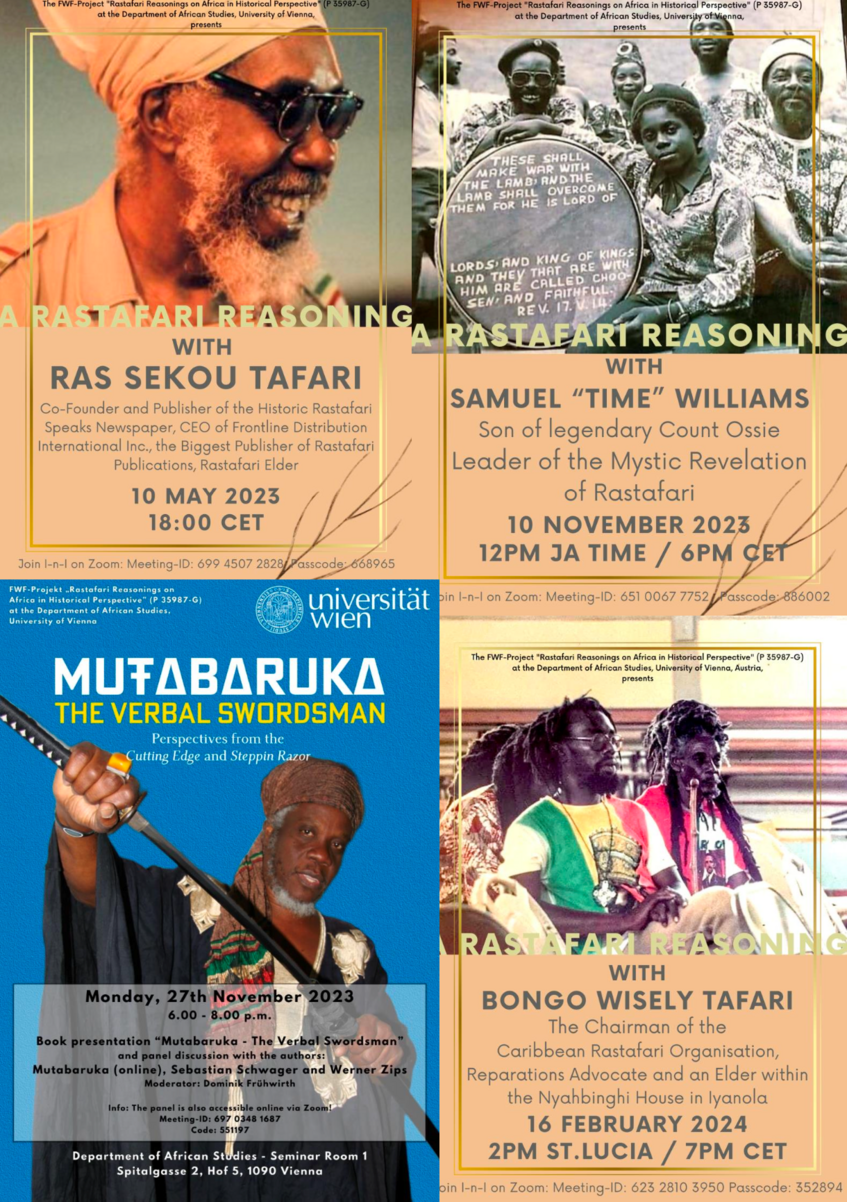
The FWF-Projekt "Rastafari Reasonings on Africa in Historical Perspective" (P 35987-G) at the Department of African Studies, University of Vienna, Austria, has been hosting a series of online and hybrid “Rastafari Reasonings” in order to give the interested public direct first-hand access to Rastafari Reasonings on Africa and engage with some leading Rastafari voices on the subject.
On 10 May 2023, the project was hosting an online-reasoning with Ras Sekou Tafari, the biggest publisher of Rastafari publications world-wide and founder of the Rastafari Speaks Newspaper. The reasoning was mainly about Ras Sekou’s long-time involvement with Rastafari educational endeavours, the importance of grass-roots scholarship and his views on decolonizing academia (see: www.youtube.com/watch?v=e7CCtXwD6FA).
On 10 November 2023, the project was hosting an online-reasoning with Ras Samuel “Time” Williams, the son of legendary Count Ossie who was instrumental in developing Rastafari traditional music and modern Reggae, and who is now the leader of his father’s "Mystic Revelation of Rastafari" band. The reasoning was mainly about Count Ossie’s legacy as an influential Rastafari Elder, Rastafari Reasonings on Africa expressed in Rastafari music, and his own experiences with Africa in the Caribbean and on the continent (see: www.youtube.com/watch?v=qRkHsgld5AM).
On 27 November 2023, the project was hosting the hybrid book-presentation “Mutabaruka - The Verbal Swordsman” at the Department of African Studies, University of Vienna, with its authors, the legendary Mutabaruka himself, Sebastian Schwager and Werner Zips, who is a partner of the project. The reasoning was mainly about the impact of Rastafari Reasonings on Africa in Mutabaruka’s life-journey as a world-renowned poet, influential radio personality and Rastafari Elder (see: www.youtube.com/watch?v=rbjTVCIkcxE).
On 16 February 2024, the project was hosting together with project-advisor and Rastafari Elder from St. Lucia (Iyanola) Ras Kella Wala an online-reasoning with Bongo Wisely Tafari, the Chairman of the Caribbean Rastafari Organisation (CRO), a repatriation and reparations advocate, and Rastafari Elder in St. Lucia (Iyanola). The reasoning was mainly about the history of Rastafari in St. Lucia (Iyanola) and the Caribbean, and Rastafari activism for repatriation and reparations (see: www.youtube.com/watch?v=UZU4TaxGY2k).
Text and picture: Dominik Frühwirth
Daniela Waldburger meets our exchange students in Dar es Salaam
I was in Dar es Salaam from 8 to 19 February 2024 and during my visit to the university I was not only able to meet the whole new team of the International Office, but I was also particularly pleased to meet our current exchange students. I met Kathrin and Klara on campus and we talked (with a somewhat intrusive monkey as a guest) about their semester. I chatted with Eva and her husband and David S. Muya, the head of the International Office, over a wonderful meal.
I wish them all good luck for their upcoming exams before we have them back in Vienna.
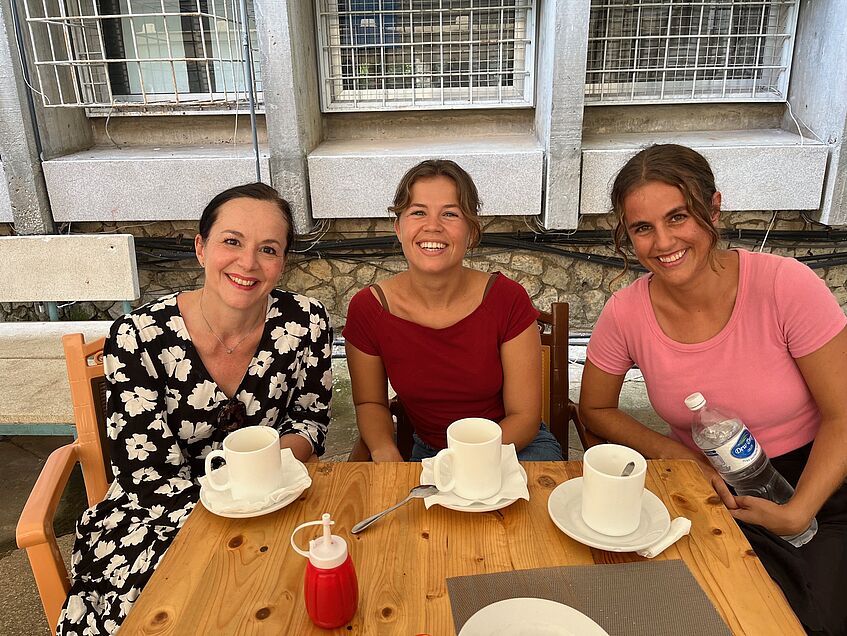
Daniela Waldburger with Kathrin and Klara
© Daniela Waldburger
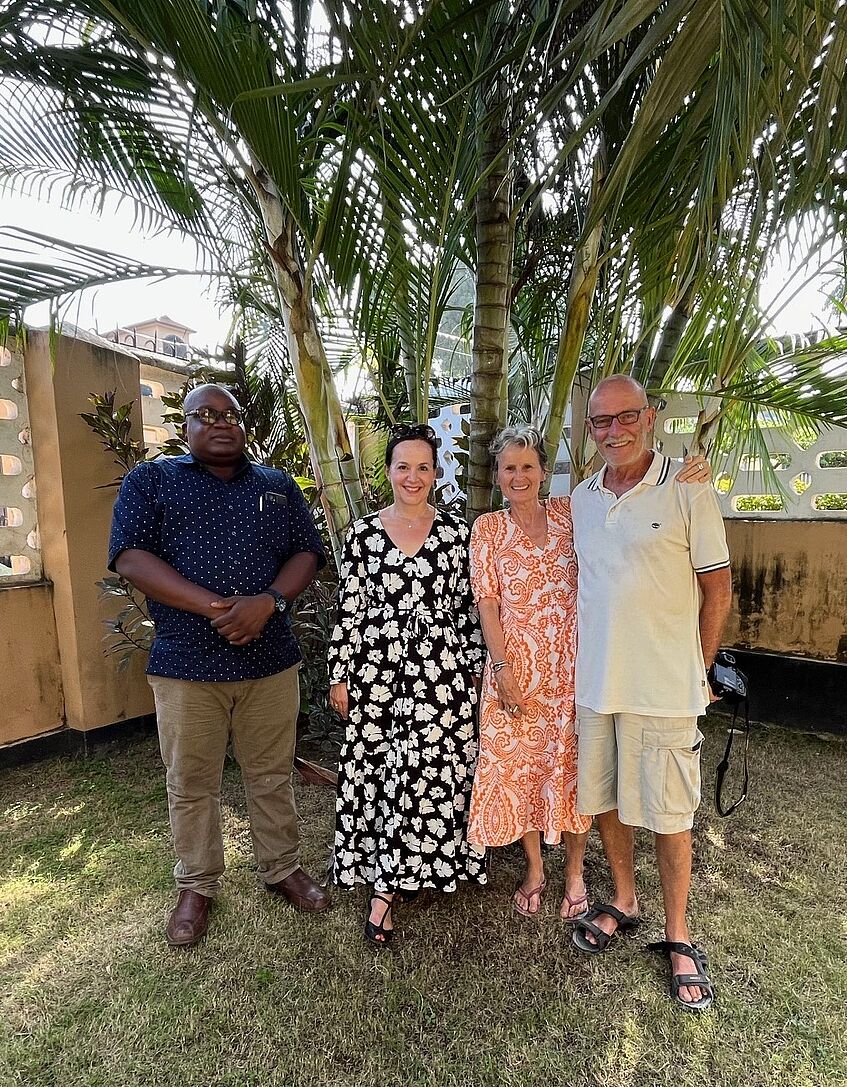
David S. Muya, Daniela Waldburger, Eva and her husband
© Daniela Waldburger
International Exchange: Tchokothe’s Visit at the Université Félix-Houphouët-Boigny d’Abidjan, Côte d’Ivoire
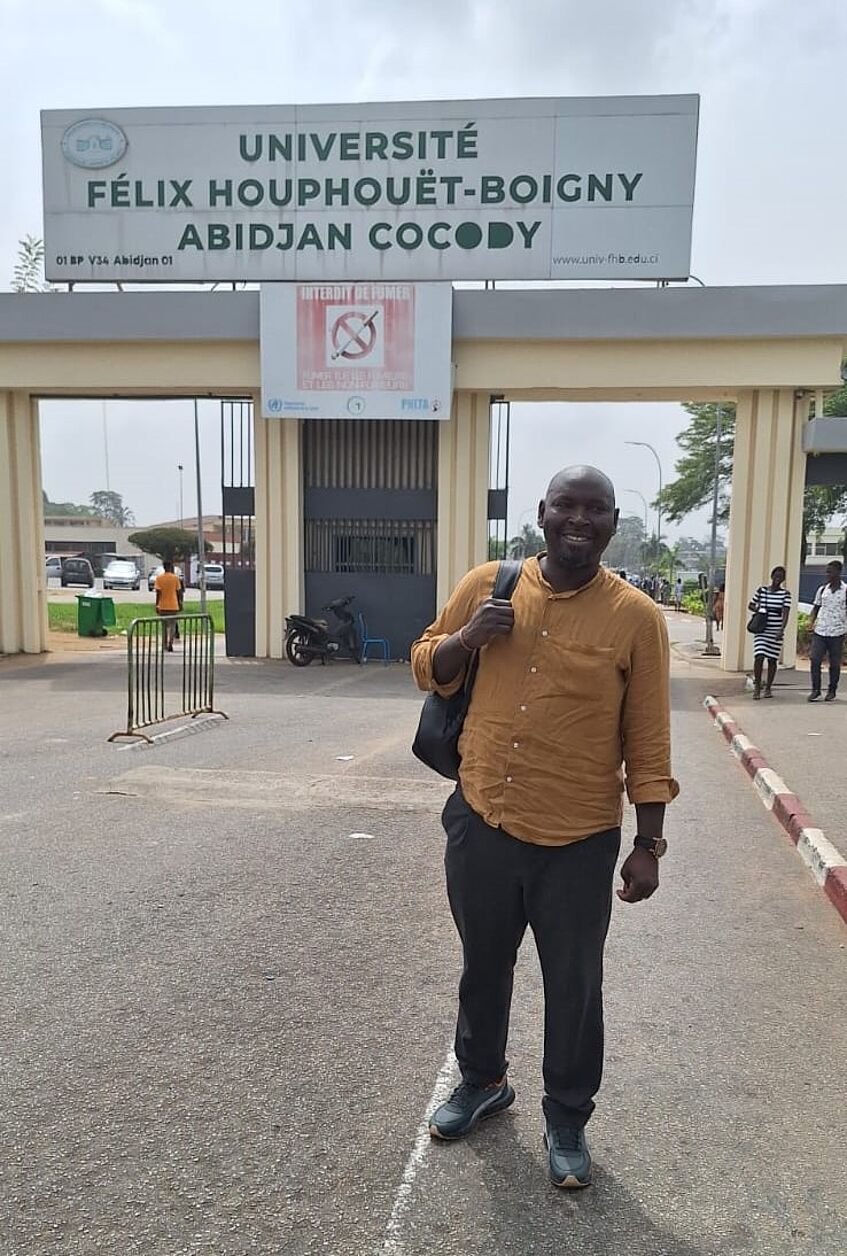
© Rémi Tchokothe
In the framework of international academic exchanges, Rémi Tchokothe visited the Université Félix-Houphouët-Boigny in Cocody Abidjan, Côte D’Ivoire, from February 3 to February 13, 2024. He had several meetings and talks with, for example, Prof Aimée-Danielle Lezou Koffi, professor of discourse analysis and vice dean in charge of pedagogy, Prof Paul N’guessan-Béchié, professor of German Literature and chairman of the Germanistik in Afrika Subsaha (GAS), and Dr. Alphonse Boua, associate professor of German Literature and vice dean of research at the UFR, Langues, Littératures et Civilisations (LLC). He also held counseling sessions with MA and Ph.D. students, presented the Department of Comparative Literature and the Department of African Studies of the University of Vienna and its journal Stichproben to colleagues in Abidjan, handed over several copies to colleagues, gave lectures on African literatures, research methodologies, and positionality, and participated in selected courses. Hopefully, a colleague from the Université Félix-Houphouët-Boigny will visit the University of Vienna soon.
Rémi Tchokothe
Tchokothe’s Visit in Abidjan, Côte d’Ivoire - Gallery
Earthday Tribute to Ras Baba T
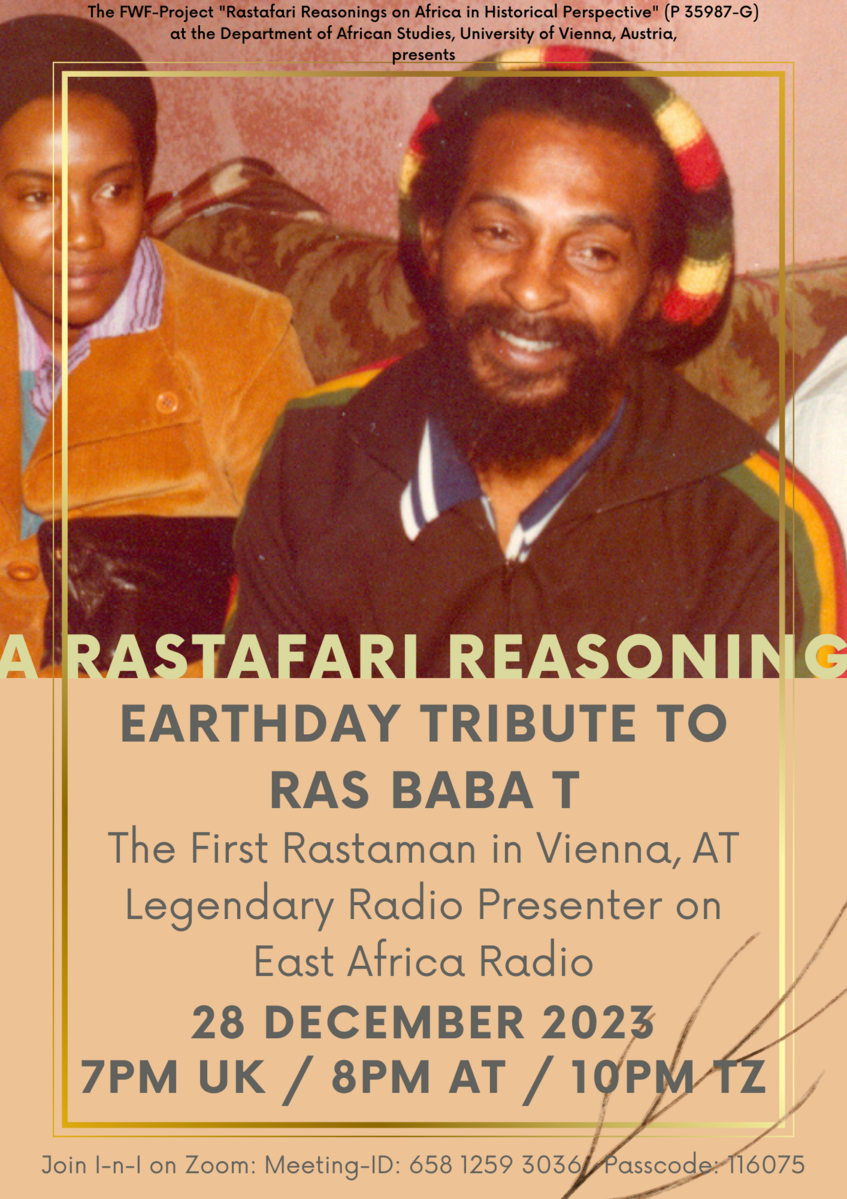
On 28 December 2023, the FWF-Projekt "Rastafari Reasonings on Africa in Historical Perspective" (P 35987-G) at the Department of African Studies, University of Vienna, Austria, presented an Earthday Tribute to Ras Baba T (Ras Emsley Smith, 28 December 1936 in Jamaica - 11 November 2021 in Tanzania), the First Rastaman in Vienna, Austria, and Legendary Radio Presenter on Radio East Africa in Tanzania.
Reconfiguring African Studies: Rémi Tchokothe’s Giving-Back trip to The Comoros
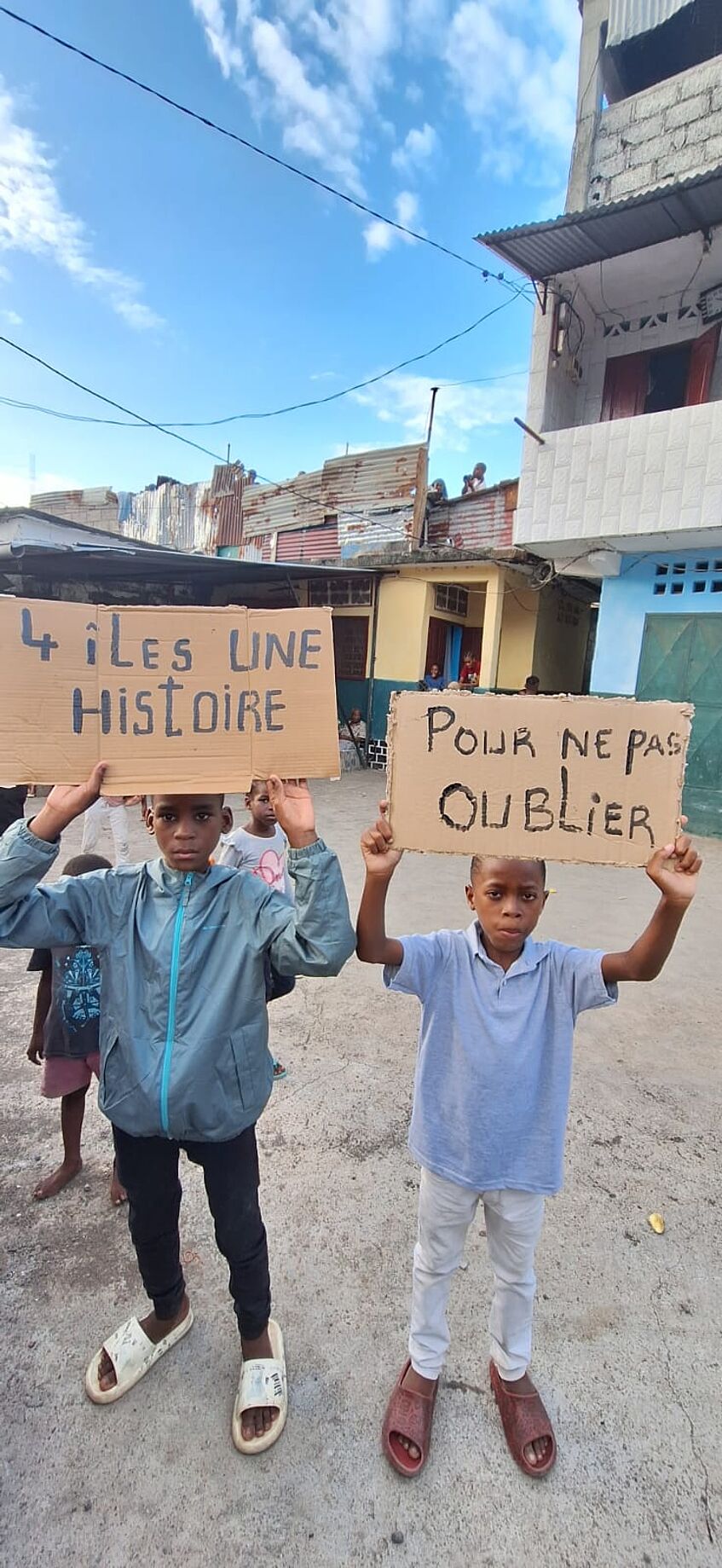
© Aicham & Tchokothe
Rémi Tchokothe undertook a giving-back Trip to The Comoros from December 12 to December 21, 2023 (in line with the philosophy of Reconfiguring African Studies within the framework of the Cluster of Excellence, Africa Multiple, based at the University of Bayreuth where his project started).
During this trip of appreciation, he gave two interviews with the daily newspaper Alwatwan (3Questions à Rémi Tchokothe I «Pour Mayotte, il s’agit tout simplement d’un génocide!» - (alwatwan.net) and presented the newly published ‘Entré en tant que cousin, sorti en tant que gendarme’. Visa Balladur, Kwassa Kwassa, (Im)mobilité et géopoét(h)ique relationnelle aux Comores during three events related to the quadrennial Fuka Festival in Anjouan where most of the overloaded and frail boats known as Kwassa Kwassa leave hoping to reach Mayotte: At the Université des Comores, Patsy, where he exchanged with more than 250 students, at the Chandra Bibliothèque and the Club Soirhane de Mirontsi where he had an open-air exchange with many people from different generations, and at the Centre National de Documentation et de Recherche Scientifique (CNDRS) de Moroni where he did archive research in August 2019.
Tchokothe officially handed copies of the book to actors in the production, mediation, and circulation of books in the Comoros such as Mrs. Moinourou Said Charif, institutions such as the CNDRS, libraries, and authors whose works are studied in the book such as Mohamed Anssoufouddine, and Saindoune Ben Ali who praised this moment that he cherished, after decades of frustration with the extractive logic still present in African Studies.
This returning to the sites of research was a sign against the extractive logic, bringing research results to places and people who have nourished the project, to people to whom the book matters most, and making it available to them, as a gesture of acknowledging their impact on the book and their willingness to share their knowledge.
Speaking of sharing knowledge, the book will be presented as a conversation with Daniela Waldburger at the Department of African Studies of the University of Vienna next Tuesday, January 16, from 5 to 7 p.m.
Rémi Armand Tchokothe
Rémi Tchokothe’s Giving-Back trip to The Comoros - Gallery
Arno Sonderegger: visiting research scholar in Seattle
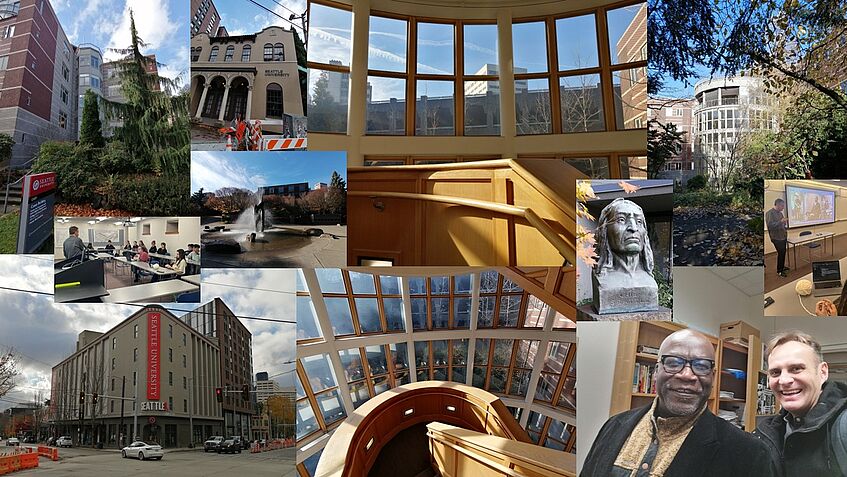
© Arno Sonderegger
For a week in November 2023, Saheed Yinka Adejumobi, Associate Professor of History at the College of Arts and Sciences at Seattle University, hosted Arno Sonderegger as a visiting research scholar in Washington’s beautiful capital. The visit and stay at Seattle U provided them ample opportunities to converse on matters of African and African Diaspora historiography, on which they had been working together recently, Saheed contributing a chapter “On Memory, Reckoning, and Speculative Futures: Pan-Africanism, Afropolitanism, and Afrofuturism” to the volume “Africa and Its Historical and Contemporary Diasporas” edited by Tunde Adeleke and Arno Sonderegger (Lexington Books). The two not only share a common interest in African history of ideas, and in W.E.B. Du Bois in particular, both are being enthralled by jazz music and Africa’s cultural creativity in general. Accordingly, their conversations were not limited to purely historical matters, but extended to questions of art, literature, and culture. During his visit Arno Sonderegger guested in Saheed Adejumobi’s classes on “Empire and Afro-Utopia” and his research seminar on “Great Debates in African American History” lecturing on several aspects of Pan-African history. Starting from the premise that Pan-Africanism is a political ideology of emancipation and liberation which argues for unity in action and devises a new vision of universal tolerance, a particular focus was on contextualized readings of various Pan-African books and lectures: in particular, George Padmore’s “Africa and World Peace” (1937) and “Pan-Africanism or Communism?” (1956) as well as Léopold Sédar Senghor`s “Humanism of the Twentieth Century” and “Liberté, indépendance et tolerance en Afrique noire” (1975) were debated.
It was a great experience to attend and participate at prestigious Seattle University, which is a Jesuit Catholic university founded in 1891. According to its website, Seattle U offers “great teaching and experiential learning” and is “an inclusive campus that fosters community and belonging.” As far as I can tell, this is really true. Thank you, Saheed for your hospitality and friendship!
Website of the Seattle University
Website of the History Department at the Seattle University
Profile of Saheed Adejumobi on the website of the Seattle University
Workshop on Translating Micere Githae Mugo’s Poem To be a feminist is into Krio, Luo, Sesotho, and Wolof
On Sunday, November 12, 2023, Rémi Tchokothe facilitated the four-hour workshop on strategies for translating the poem To be A Feminist is from the Kenyan playwright, professor of literature, and activist Micere Mugo into four languages: Krio (Sierra Leone with Anni Domingo); Luo (Kenya with Kanonikus Francis Omondi); Sesotho (South Africa with Gomolemo Moagi), and Wolof (Senegal with Coumba Toure). Other translation experts such as Abdilatif Abdalla (Swahili), Ida Hadjivayanis (Swahili), Jess Oliveira (Portuguese, Brazil), and Wangũi wa Goro who was a co-curator of this year’s Translationale Festival Berlin (Kikuyu) also enriched the Workshop with their thoughts and translation experience. For more information on these outstanding personalities, kindly look at this link to the Transnationale Berlin 2023 programme.
We discussed among other themes the challenges in finding equivalents to concepts such as ‘feminism’ in these languages; the role of emotions in translations; entering the shoes of the authors; and the potential of collaborative translation projects and learned a great deal from Gomolemo Moagi (dependent on a wheelchair herself) who navigates among nine languages on the important field of translation and ‘disability’.
Rémi Armand Tchokothe
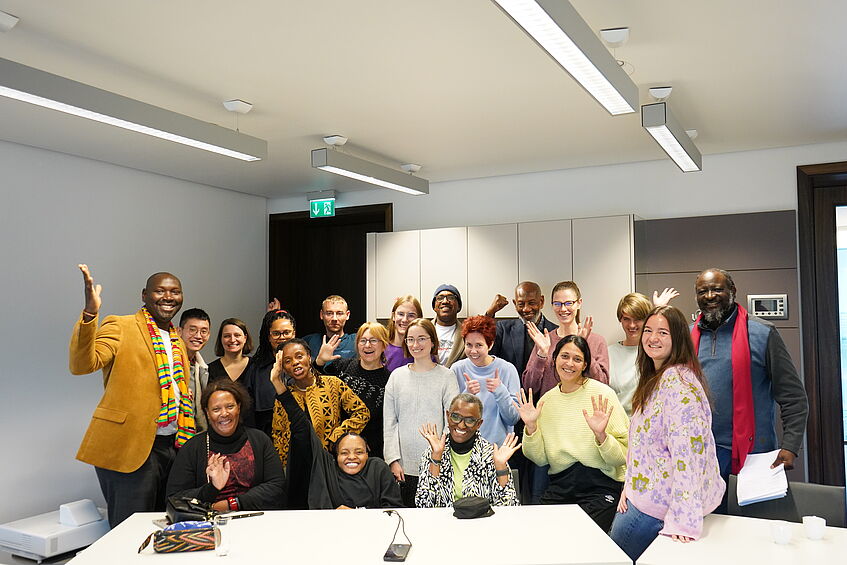
© Daria Naumenko
Ausblick
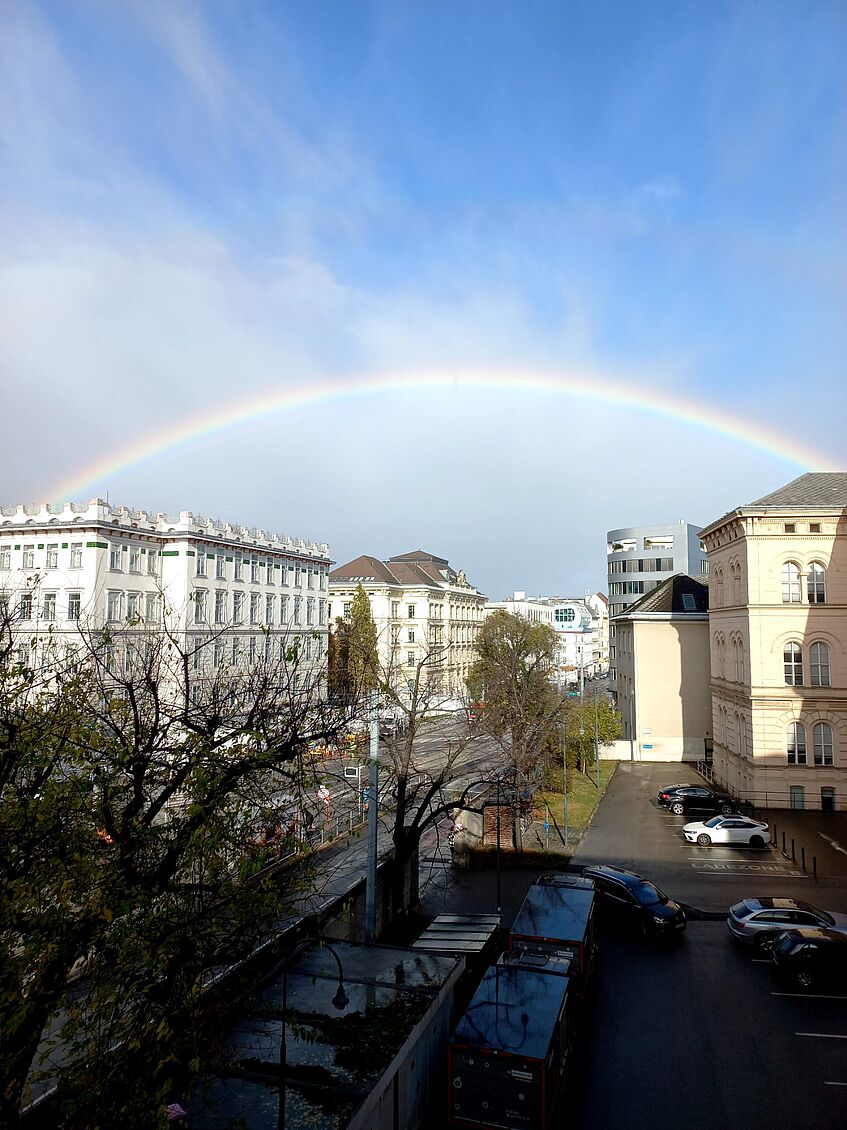
© Kirsten Rüther
Manchmal ist es eine Freude, im Büro zu sitzen und von einer vielleicht etwas öden Tätigkeit am Schreibtisch aufzublicken, um dann ein solch wunderschönes Naturschauspiel vor dem Fenster zu entdecken. Ein Regenbogen wie im Bilderbuch. Am Institut für Afrikawissenschaften hat uns heute, kurz vor der Mittagszeit, dieser Farbklang zusammengebracht. Gemeinsam haben wir uns der Schönheit des Bandes in lila-blau-grün-gelb-orange-rot hingegeben. Unser Arbeitsplatz ist einfach wunderbar.
Schönes genießen, von Sandra B. und Kirsten R.
Dokumentationsstelle Politischer Islam: Round Table Discussion mit Bakary Sambe
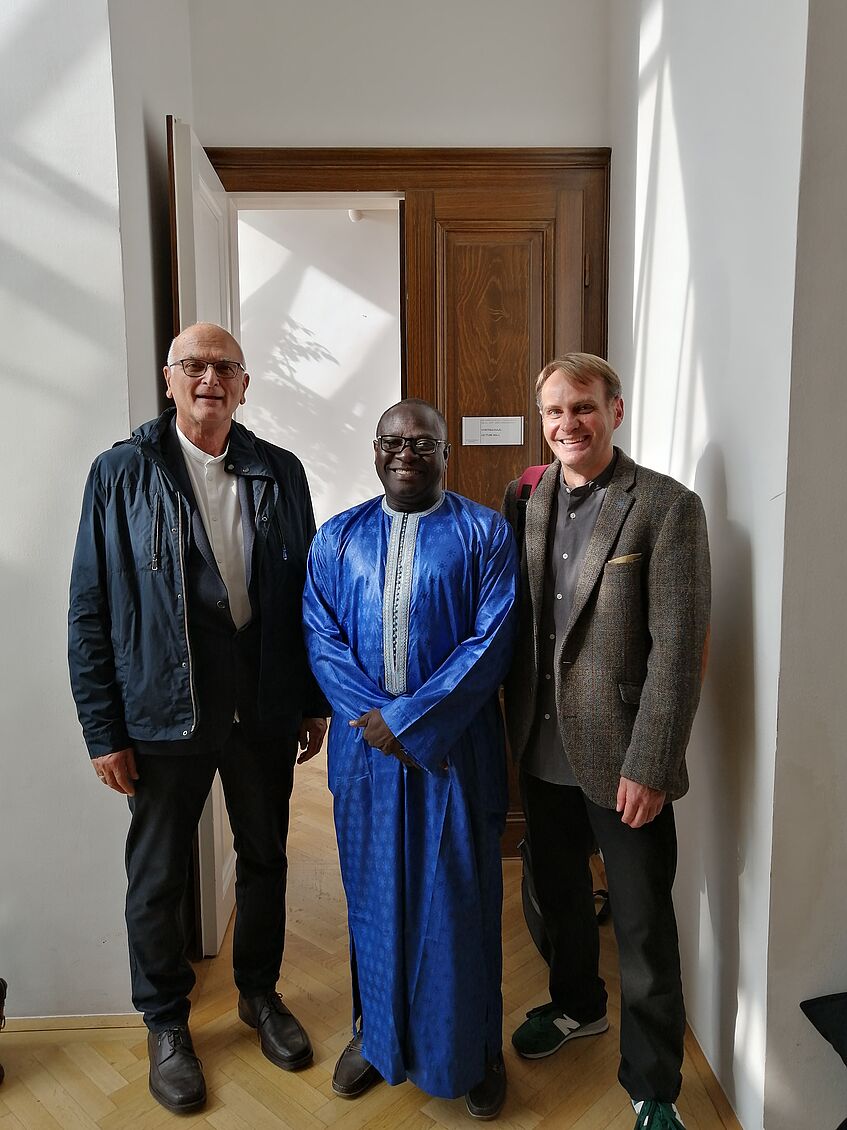
In den vergangenen Jahren hat sich die politische Lage in den Sahelländern Westafrikas sehr zugespitzt. Nationale Problemlagen haben sich verschärft und eine Reihe von Staatstreichen zur Folge gehabt, doch diese Entwicklung hat auch eine ganze Menge internationaler Dimensionen. Unter anderem fällt besonders ins Auge, dass islamistische Agenden und Akteure mit Fortgang des 21. Jahrhunderts vielerorts in Westafrika eine immer größere Rolle spielen. Die Dokumentationsstelle Politischer Islam hat deshalb am 25. Oktober 2023 zu einer Round Table Discussion mit Bakary Sambe, dem Regionaldirektor des Timbuktu Institute: African Center for Peace Studies in Dakar ins Bundeskanzleramt geladen. Inhaltliche Beiträge zur Debatte leisteten auch zwei Personen, die dem Institut für Afrikawissenschaften nahestehen: Erwin Ebermann, Afrikanist und Mitautor der Studie „Muslim*innen im Großraum Wien zwischen Religion und Rechtsstaat“ (November 2022), hielt einen Vortrag über „Joking Relationships in West Africa and their Potential Use in Conflict Prevention“. Arno Sonderegger sprach über „The Tolerant Spirit of Amadou Hampâté Bâ“ und erinnerte an die dialogischen Möglichkeiten, verlorenes Vertrauen wiederzugewinnen, indem westafrikanische Anschauungen und Traditionen, inklusive Perspektiven und Geschichte westafrikanischer Muslime im Westen wahr- und ernstgenommen werden.
Timbuktu Institute: African Center for Peace Studies
Dokumentationsstelle Politischer Islam: Der österreichische Fonds zur Dokumentation von religiös motiviertem politischen Extremismus
Conference in Naples: OUTBREAKS! Epidemics across African languages and cultures
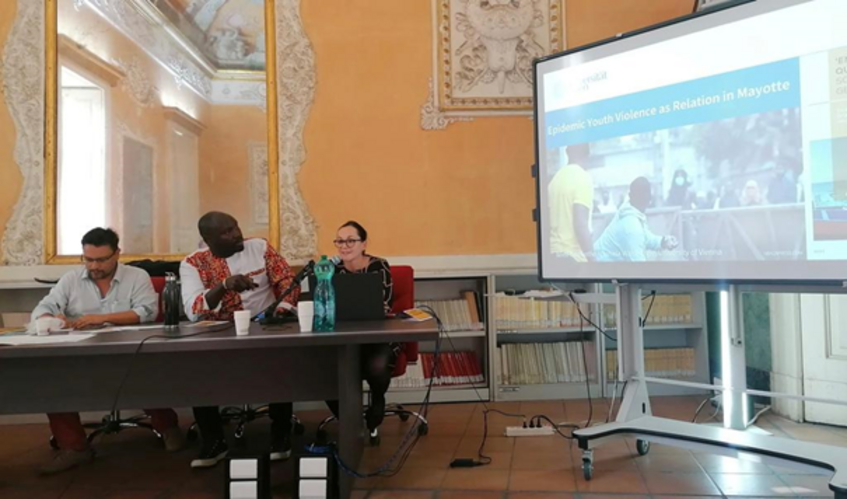
© Glory Essien Otung
On 19 and 20 October 2023, the University L'Orientale in Naples hosted the conference "OUTBREAKS! Epidemics across African languages and cultures" with participants from Universities from Cameroon, the Democratic Republic of Congo, Germany, Ghana, Great Britain, Italy, Nigeria, Tanzania, Zimbabwe and Austria. The focus was on questions of how African societies have experienced, integrated and interpreted pandemic phenomena of the last decades in artistic-literary production, linguistic transformation or adaptation. In a joint presentation on Epidemic Youth Violence as Relation in Mayotte, we (Rémi Tchokothe and Daniela Waldburger) approached the epidemic in a metaphorical sense: youth violence that is widespread in a community at a given point in time and that repeatedly erupts in Mayotte - a French overseas department - in a heated social context. We focused on our common research intersections from our respective perspectives, tracing verbal and emotional markers of youth violence.
Rémi Tchokothe/Daniela Waldburger, 22.10.2023
Schnittpunkt Afrika 2023
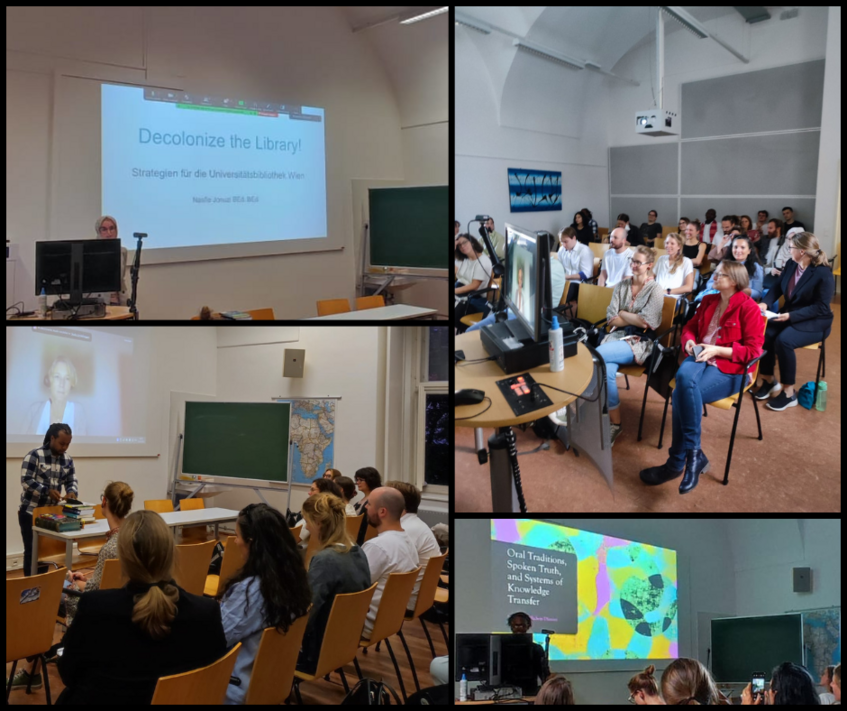
Der diesjährige Schnittpunkt Afrika führte zu produktivem Austausch und hat mit Hilfe des multimedialen Zugangs eine Fülle an Beiträgen ermöglicht. Die verschiedenen Präsentationen griffen alle das Thema der Dekolonialisierung auf und beleuchteten dieses aus akademischen Blickwinkeln verschiedener Institutionen und Disziplinen (wie der BOKU, der Sprachwissenschaft, der Geschichtswissenschaften). Auch Bibliotheken wurden stärker in den Blick genommen und Strategien der Sichtbarmachung und Bearbeitung kolonialen Erbes (in Büchern) verhandelt. Aktivistische Bestrebungen wie Rastafari Methodologien zur Dekolonialisierung akademischer Wissensproduktion verwiesen auf den Einfluss der Sprachverwendung, welcher auch in der Rassismuskritischen AG am Institut zentriert wird.
Im darauffolgenden gemeinsamen Austausch bei Brötchen, Getränken und Musik wurden die Themen vertieft und die Wichtigkeit des Zusammenkommens sichtbar.
Die Organisator*innen Gabriele Slezak und Viola Innerhuber freuen uns sehr über die zahlreiche Teilnahme und dem Interesse am Institut. Wir sind dankbar für die Möglichkeit, diese wichtige Veranstaltung planen und der Debatte Raum geben zu können.
Text: Viola Innerhuber
New book release: Africa and Its Historical and Contemporary Diasporas
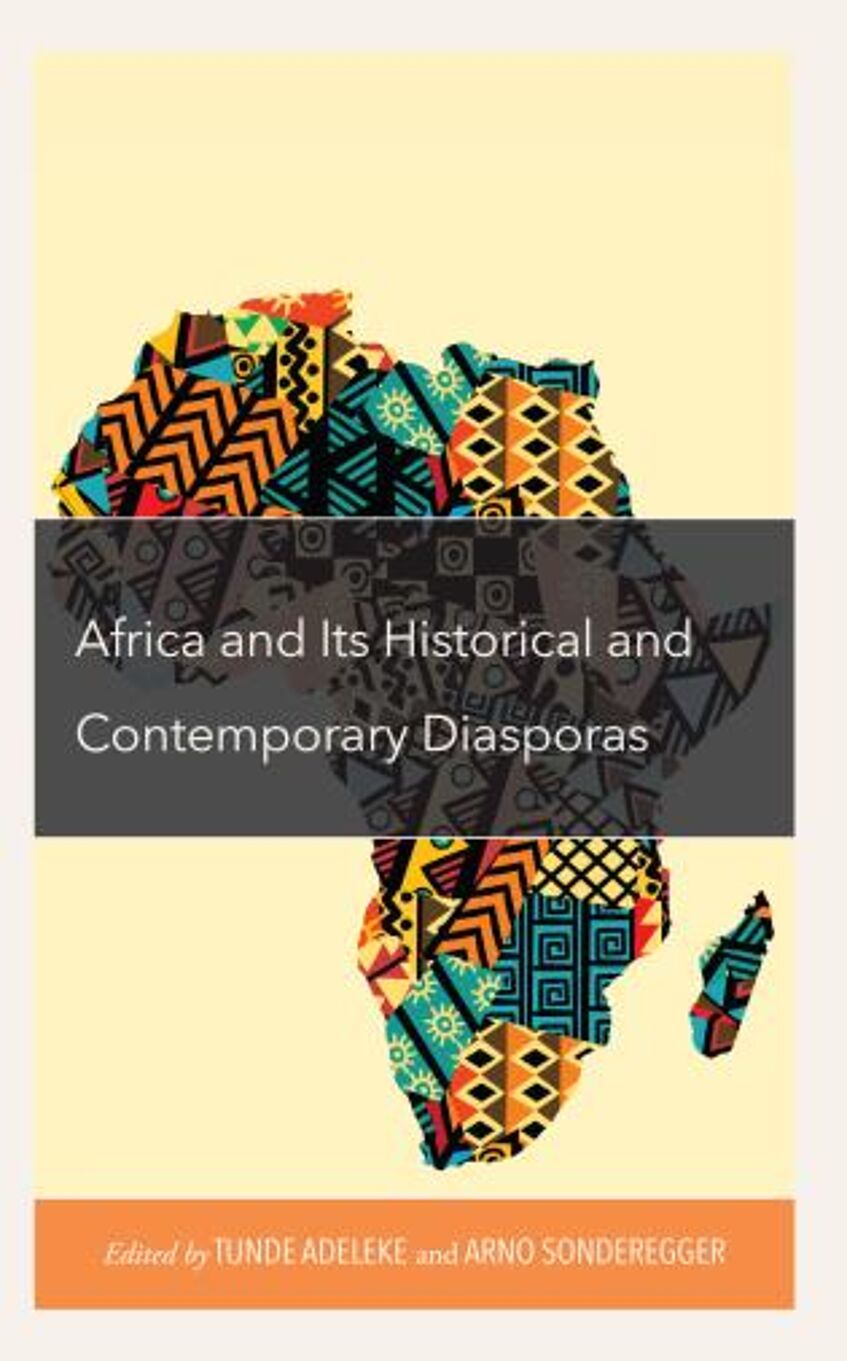
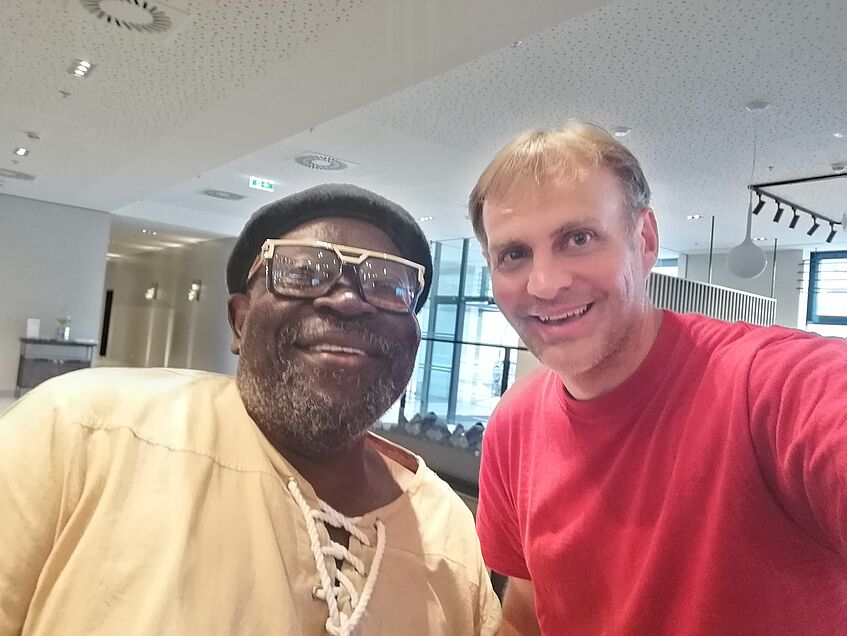
© Arno Sonderegger
Recently this summer, a new book on "Africa and Its Historical and Contemporary Diasporas" was published by Lexington Books, which Tunde Adeleke (Iowa State University) and Arno Sonderegger (University of Vienna) have been working on editing for the past three years. It contains eight individual contributions by authors from Africa, the United States, and Europe. In addition to the editors, Felix Kumah-Abiwuh (Kent State University), Alma Jean Billingslea Brown (Spelman College Atlanta), Kyrah Malika Daniels (Emory University), Dominik Frühwirth (University of Vienna), Babacar M'Baye (Kent State University), and Saheed Yinka Adejumobi (Seattle University) have contributed chapters worth reading.
Initial assessments of the book have been very encouraging. According to Jeremiah Dibua (Morgan State University), “This book is an invaluable addition to the growing literature on Diasporas in general, and the African Diaspora in particular.” And Walter C. Rucker (Emory University) considers its chapters to “be vital contributions to discourse about Pan-Africanism and the Africa-Diaspora nexus for many years to come.” These opinions are most encouraging. More information about the book Africa and its Historical and Contemporary Diasporas on the publisher's website.
On a personal level, something else has been most gratifying. After a long break, the editors Tunde Adeleke and Arno Sonderegger were finally able to meet face to face again in June 2023. The final proofreading work completed, the volume had shortly before gone to the publisher and into production. Joy and relief are written all over the faces of the two, as you can see from the enclosed photo.
Monograph Prize of the Slovak Academy of Sciences for Dobrota Pucherová
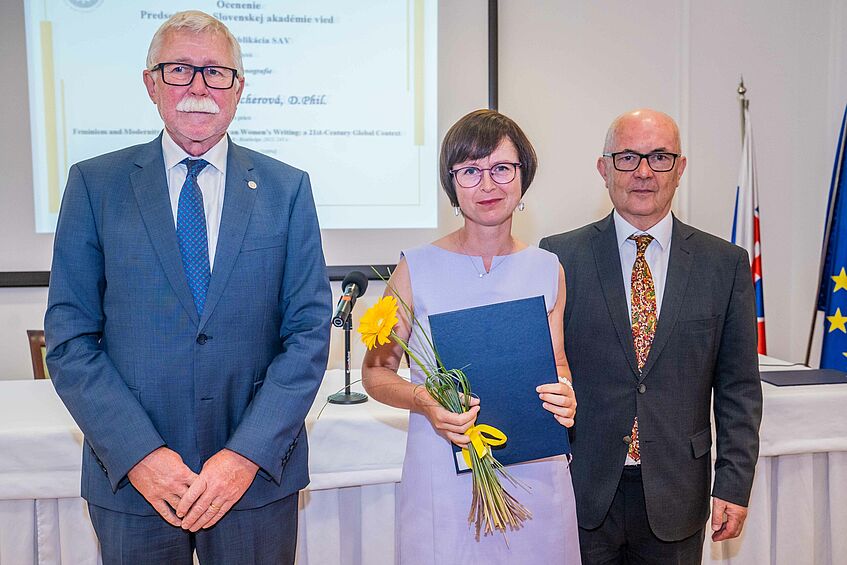
Dr. Dobrota Pucherová, D. Phil. has been awarded the prestigious Monograph Prize by the Slovak Academy of Sciences for her book FEMINISM AND MODERNITY IN ANGLOPHONE AFRICAN WOMEN’S WRITING: A 21ST-CENTURY GLOBAL CONTEXT (Routledge, 2022).
She accepted the prize at the prize ceremony on Sept. 18, 2023 from the hands of Prof. RNDr. Pavol Šajgalík, DrSc., President of the Slovak Academy of Sciences, and Prof. RNDr. Peter Samuely, DrSc., Vice-President for sience, research and innovations.
Book release in open access: Rémi Tchokothe's "'Entré en tant que cousin, sorti en tant que gendarme' – Visa Balladur, Kwassa Kwassa, (im)mobilité et géopoét(h)ique relationnelle aux Comores"
Book release in open access: Rémi Tchokothe's "'Entré en tant que cousin, sorti en tant que gendarme' – Visa Balladur, Kwassa Kwassa, (im)mobilité et géopoét(h)ique relationnelle aux Comores"
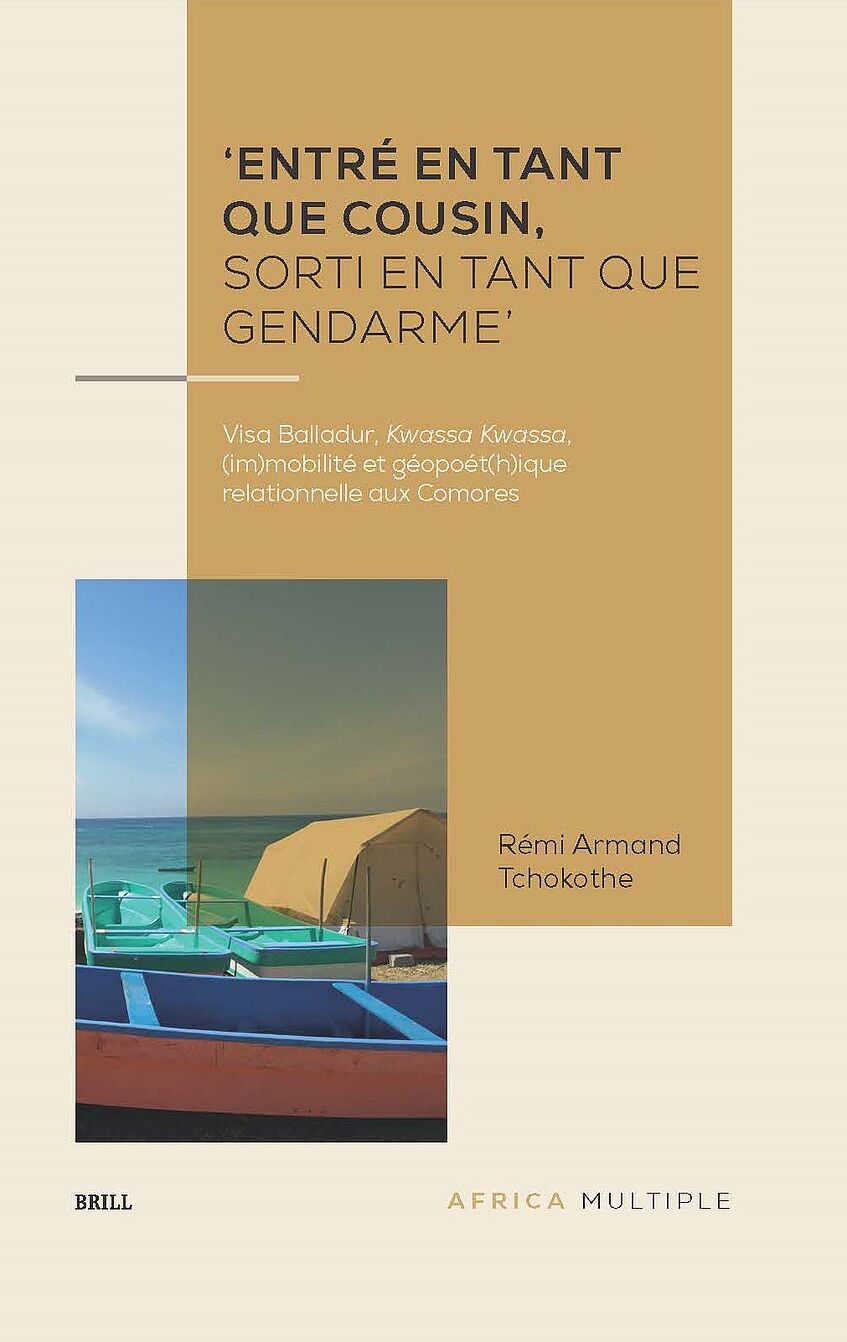
Book release in open access: Rémi Tchokothe's "'Entré en tant que cousin, sorti en tant que gendarme' – Visa Balladur, Kwassa Kwassa, (im)mobilité et géopoét(h)ique relationnelle aux Comores"
It took almost six years of research. It is now out there: in open access thanks to the funding of the Cluster of Excellence: Africa Multiple: Reconfiguring African Studies. Just download your copy here and feel free to share the link :
« He came as a cousin and left as a gendarme. » This anecdote expresses the identity paradox in the Comoros and the ‘migration’ drama that has been happening in the Archipelago since the arbitrary introduction of the Balladur Visa in 1995. Mayotte that is ‘officially’ French has been labelled “the biggest marine graveyard in the world”. How can works of imagination on “migration” from Anjouan to Mayotte constitute a kind of collective social therapy and social intervention? This book answers this question (among others) by studying 18 works, and combining literary studies with anthropology, sociology, history and international law.
I am happy to have been involved in the process by proofreading the book in French. It is great that the book is in French. This way, the results of the research project are also accessible to the people who are concerned. The book also includes an extended English summary. I fully recommend reading this book that opened my eyes on a neglected aspect of Migration from “Africa” to “Europe” which happens on African soil and especially on French politics in the Comoros/Indian Ocean.
Sandra Benecchi
Mission(naire) d’Enseignement des « Littératures Africaines » à L’Université de Maurice
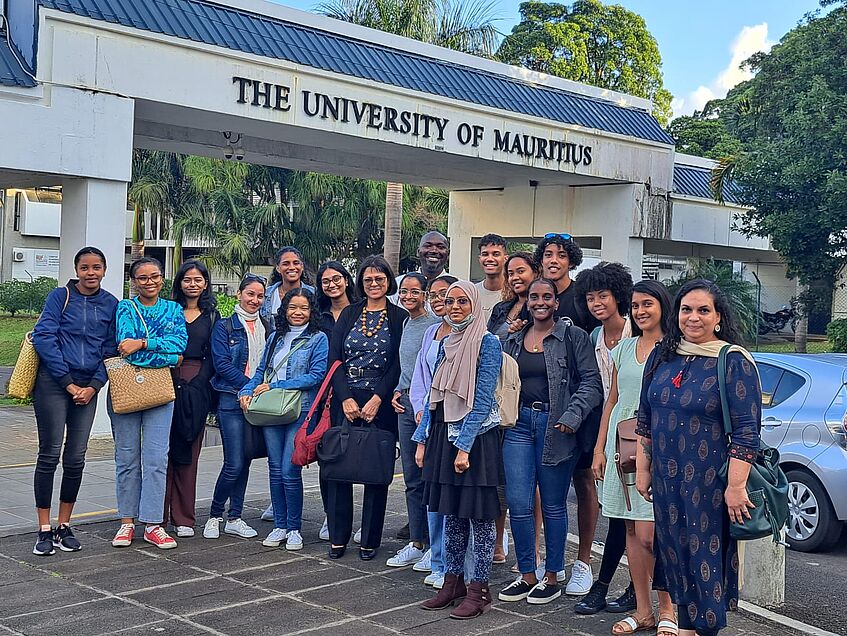
Foto: Vickie van Schellebeck, Juni 2023
Dans le cadre du programme d’échange Erasmus+ Enseignement entre l’Université de Vienne et l’Université de Maurice, Rémi Armand Tchokothe est intervenu au département de français de l’Université de Maurice à Réduit du 26 au 30 Juin. Il a échangé avec des collègues, co-animé avec la professeure Kumari Issur un atelier de mentoring avec ses deux doctorantes Vickie Van Schellebeck et Véronique Nankoo, il est intervenu dans deux cours de licence autour des thèmes 1. Littératures Africaines et Terrains : Questions de Méthodologie et de Positionnalité et 2. “Entré en tant que cousin, sorti en tant que gendarme”: Visa Balladur, Kwassa Kwassa, (im)mobilité et géopoét(h)ique relationnelle aux Comores et a donné une conférence publique intitulée Huit Écrivain.e.s (ra)content « L’Aventure Ambiguë » des Langues des Littératures Africaines.
Ce séjour d’enseignement et d’échange a été une importante passerelle aussi bien pour les enseignant.e.s, par exemple la rencontre avec Nikhita Obeegadoo, professeure à University of Bristish Columbia de passage à Maurice, que pour les étudiant.e.s et les doctorant.e.s dont deux effectueront un séjour de recherche à l’Université de Vienne d’Octobre à Décembre 2023.
MerSi [créole Mauricien] à Elissa Pustka et Maximilian Kudler (Vienne), Yannick Bosquet et particulièrement Kumari Issur (Maurice), qui ont rendu ce séjour possible et à toutes/tous les collègues, étudiant.e.s et doctorant.e.s à Maurice pour l’écoute, les échanges très nourrissants, les rires contagieux et surtout l’accueil après l’écueil du périple de trois jours pour arriver en « terre promise pour apporter la bonne parole et ouvrir des horizons ». (Kumari Issur).
Rémi Tchokothe
Mission(naire) d’Enseignement des « Littératures Africaines » à L’Université de Maurice
Aspiring “Diversity of Cultural Expressions” in Austria: A Critical meeting of students with experts at the Austrian Commission for UNESCO
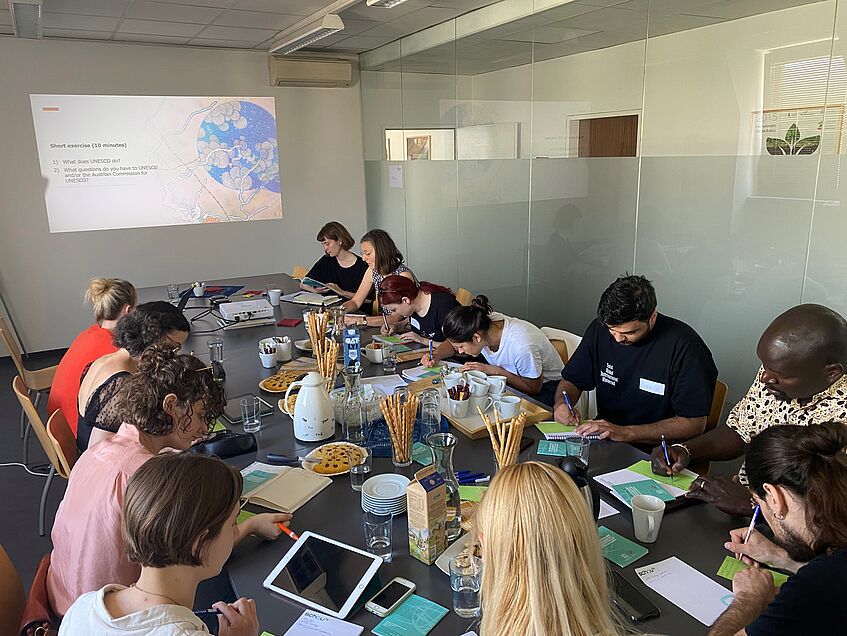
Photo © Austrian UNESCO-Commission, June 2023.
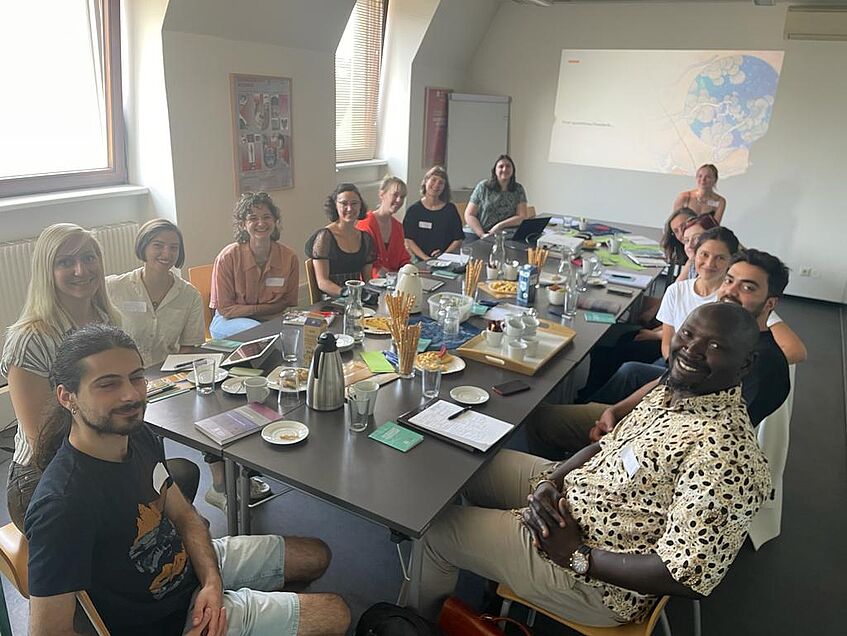
Photo © Austrian UNESCO-Commission, June 2023.
On June 15, 2023, Marie-Theres Bauer and Klara Koštal kindly hosted our Master class on ‘African’ Diasporic Literary Voices in the ‘Austrian’ Cultural Scene with Ass. Prof Dr. Rémi Tchokothe at the Austrian Commission for UNESCO (United Nations Educational, Scientific and Cultural Organization) in Vienna’s First District. Our meeting focused on the implementation of the 2005 Convention for the Protection and Promotion of the Diversity of Cultural Expression, ratified by Austria in 2006, with Klara Koštal being the Austrian contact for this UNESCO Convention and Marie-Theres Bauer as an expert on Intangible Cultural Heritage as well as Diversity of Cultural Expressions at the Österreichische UNESCO-Kommission (ÖUK). Acknowledging that culture does not merely consist of economic values, member states around the globe agreed on the 2005 convention as a kind of treaty to achieve the following goals: supporting sustainable systems of governance for culture, achieving a balanced flow of cultural goods and services, as well as increasing the mobility of artists and cultural professionals, integrating culture in sustainable development frameworks, and promoting human rights and fundamental freedoms.
The National Commission in Austria, established in 1949 after Austria joined UNESCO in 1948, is closely linked to the independent United Nations agency based in Paris, but financially funded by the Austrian federal government. Whilst describing their function, Klara Koštal and Marie-Theres Bauer characterized the Austrian Commission for UNESCO as a “platform of exchange”, a national point of contact for matters pertaining to the 2005 convention and more generally all questions regarding Austria’s membership in UNESCO. Their tasks mainly consist of providing expertise for policy makers, ‘lobbying’ for cultural associations and freelancers, promoting discoverability of minorities, monitoring the artistic freedom in Austria, raising awareness about existing imbalances, and organizing networking possibilities like the symposium “Mobility: Privilege and Problem” on May, 4th 2023 at the University of Music and Performing Arts in Vienna. An important part of their work focuses on increasing the mobility of artists and the facilitation of cultural exchange aiming to carry out “preferential treatment” (Vorzugsbehandlung) for artists and cultural goods from the so-called “global south” to increase their visibility and achieve further diversity to counteract imbalances. The results of their groundwork are regularly presented in advisory panels to decision makers within the federal government, the federal states and other relevant bodies, in an attempt to enhance the implementation of the 2005 convention on a national scale.
The UNESCO – a “neutral” organization?
After a short introduction to the work of the Austrian National Commission, the meeting quickly turned into a vivid yet respectful discussion about the role of the UNESCO and the financial funding of the Austrian Commission with regards to (political) neutrality and possible conflicts of interests. Whilst the UNESCO self-defines as a politically “neutral” organization, their work is nevertheless dependent on membership fees (membership states pay the UNESCO based on their GDP). We were surprised to learn that this money is used to finance the infrastructure of the UNESCO, mainly covering costs for salaries, offices, and meetings, whereas cultural projects – as well as the national commissions – are financed by individual national government budgets. As a result, the financial amount that can be allocated to projects is often restricted and varies greatly from nation to nation. Moreover, the question of controlling authorities came up during the discussion since the UNESCO is essentially dependent on the groundwork of national bodies. However, the quality of this work is not always evaluated by independent agencies. The State Parties to the 2005 Convention have to submit Quadrennial Periodic Reports every four years assessing their own implementation of the Convention. One example, Marie-Theres Bauer and Klara Koštal know of in this context, is a National Commission for UNESCO, which is currently being evaluated externally by a research institute. Both acknowledged that the current evaluation practice of the 2005 Convention at UNESCO is challenging.
Intangible Cultural Heritage in Austria with Regards to Diversity and Representation
We concluded our meeting by debating the diversity of cultural expressions in Austria with regards to the 2003 Convention for the Safeguarding of the Intangible Cultural Heritage, ratified by Austria in 2009. Marie-Theres Bauer presented the recent publication on elements inscribed in 2020-2021 with the purpose of safeguarding practices, representations, expressions, knowledge and skills that communities, groups and, in some cases, individuals recognize as part of their cultural heritage. The current volume contains 147 different customs – from oral traditions to knowledges and practices concerning nature. One aspect of criticism debated during our meeting is the fact that in order to be featured within this listing of traditions, communities and holders of traditions must actively apply instead of being sought out by the Austrian Commission. This however is a crucial point considering diversity and representation since some communities and ethical groups might not even know about the possibility to be represented and thus officially associated with Austrian culture. Marie-Theres Bauer acknowledged this, wanting to take this aspect into consideration for the next publication. We all agreed that the point is not to challenge the registered traditions, but rather to complete them in terms of cultural diversity.
During the long and stimulating discussion about the opportunities and challenges of the UNESCO conventions, Marie-Theres Bauer and Klara Koštal both proved to be unbiassed and open minded with regards to problematic aspects of their nevertheless important work. We ended our visit with very good cookies and cake, which one of our classmates, Katharina Geilersforfer, had baked as a gesture of gratitude for the invitation. It was a very engaging experience, providing valuable new input for both sides.
A report by Anna Hell and Laura Kisser
Sources:
https://www.unesco.at/en/about-us/austrian-commission-for-unesco
https://www.unesco.at/en/culture/diversity-of-cultural-expressions
https://www.unesco.at/en/culture/intangible-cultural-heritage
https://en.unesco.org/creativity/sites/creativity/files/passeport-convention2005-web2.pdf (2005 Convention)
https://ich.unesco.org/doc/src/18440-EN.pdf (2003 Convention)
SWAHILI FORUM Special Issue zu Critical Swahili Studies Vol. 30 (2023)
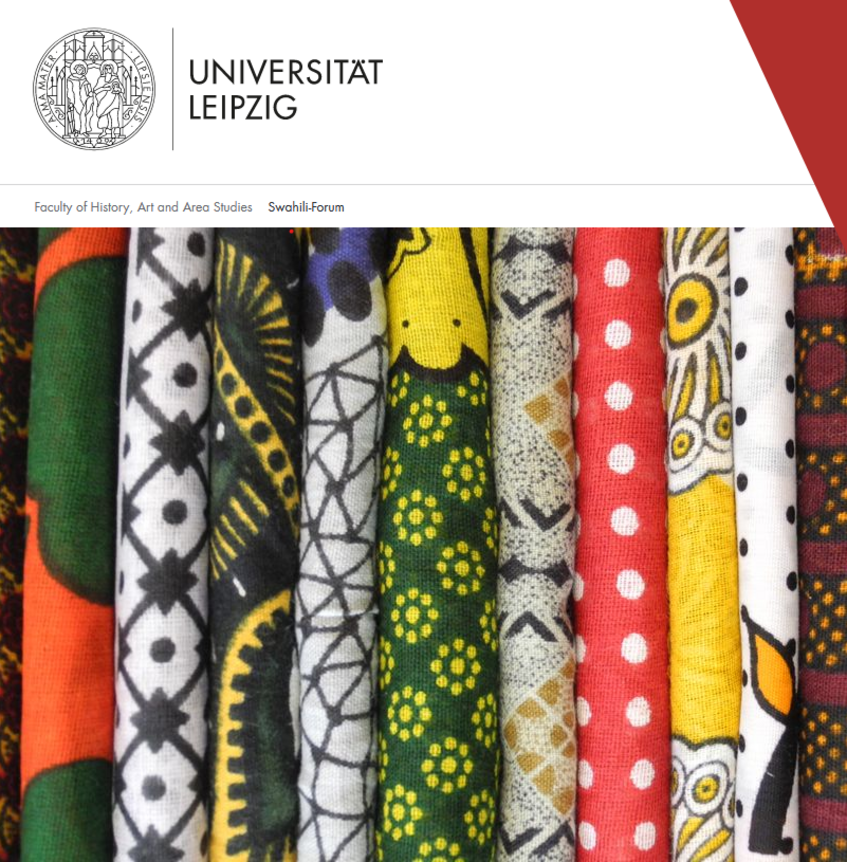
Website des Swahili Forums
Das SWAHILI FORUM Special Issue zu Critical Swahili Studies Vol. 30 (2023) ist soeben erschienen! U.a. können Beiträge von Birgit Englert (Swahilité in the French Comorian Diaspora) und Daniela Waldburger (Greater Swahili – Swahili Varieties in L2+ Swahili Teaching) als PDF-Dateien kostenlos von der Website des Swahili-Forums heruntergeladen werden.
VAW Poetry Slam / Summer Semester 2023
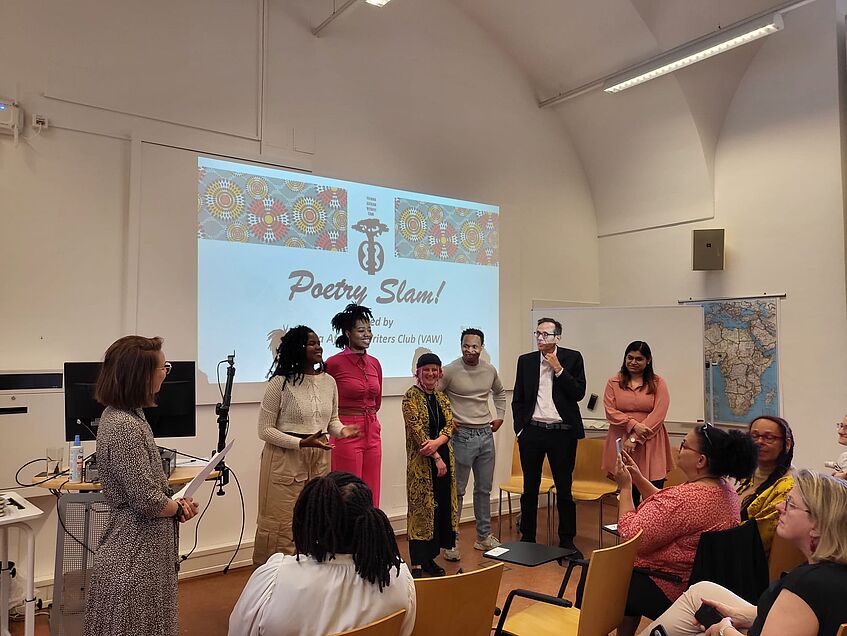
On May 24, 2023, the Vienna African Writers Club (short VAW), founded by Prof. Adams Bodomo, hosted a Poetry Slam at the African Studies Department at the University of Vienna. Six outstanding contestants shared their poems dealing with a wide variety of topics, from aspects of identity and self-love to heartbreak and drawing boundaries to climate change and current crises. The six poets showed great courage, empathy, and creativity and celebrated the power of literature to lift us up, to liberate, and to create community. In addition to the poetry slam, writer Ada Diagne shared her work and read from her beautiful short story collection entitled Menschen, published by Story.one.
The next VAW Poetry Slam will take place on Thursday, November 16, 2023 from 5:30pm to 8pm in Seminar Room 1 at the African Studies Department.
If you are interested in performing your own poems, contact elisabeth.knittelfelder@univie.ac.at.
Planting “African” Memories in “Austria”: A recollection of the “African Literatures Days” in Graz 2023
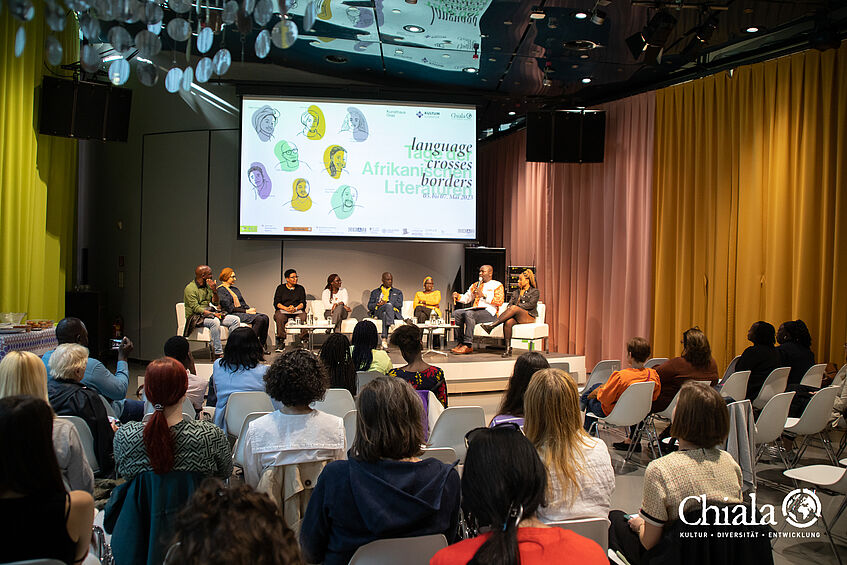
Photo: Chiala
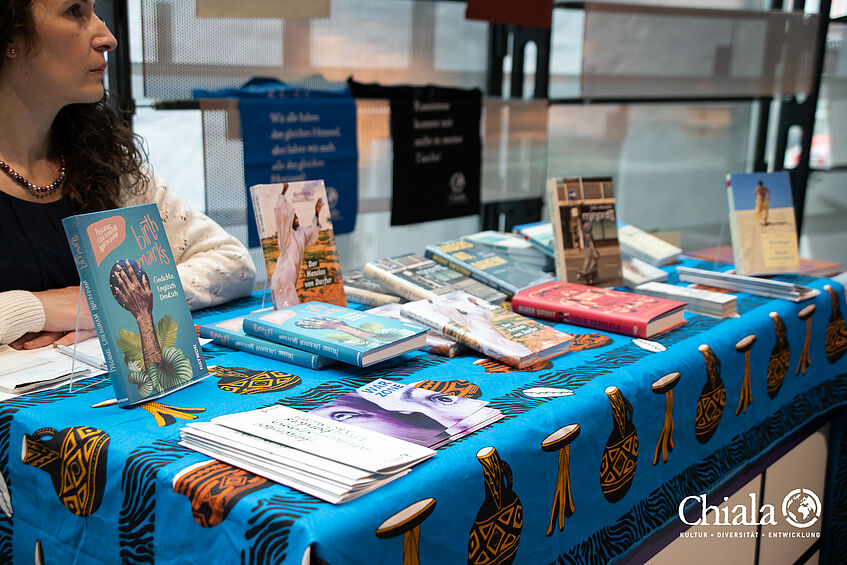
Photo: Chiala
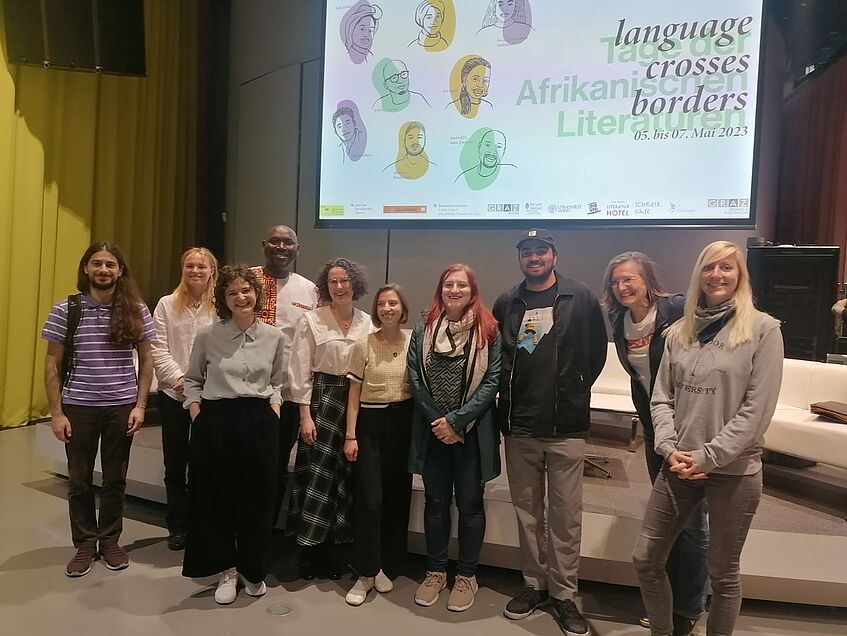
Photo:Kamdem
From May 5th to May 7th, 2023, Graz became the center of African literatures in “Austria” thanks to the CHIALA association, Chiala meaning the main square, the place (“chia”) where people (“la’ ”) gather in the language Baham [Hom] spoken in the Bamiléké region, West Cameroon. During this year’s edition of the festival, curated by the current Grazer Stadtschreiber Abdelaziz Baraka Sakin and moderated by Ass.-Prof. Dr. Rémi Armand Tchokothe from the University of Vienna, the following authors gathered: Leila Aboulela (Sudan; Scotland), Ken Bugul (Senegal), Stella Gaitano (South Sudan; Germany), Mihret Kebede (Ethiopia; Austria), Precious Chiebonam Nnebedum (Nigeria; Austria) and Wilfried N’Sondé (Republic of the Congo; France).
The festival started off on Friday evening with a reading and spoken word performance at the Kulturzentrum bei den Minoriten (Kultum). After a few words of introduction by the Managing Director of CHIALA, Kamdem Mou Poh à Hom, Abdelaziz Baraka Sakin welcomed the attendees. Rémi Tchokothe spoke next and elaborated on the festival’s motto “language crosses borders”, before the actual event began with a reading in French from Le Coeur des Enfants Léopards (2007) by Wilfried N’Sondé. Then followed a spoken word performance in Amharic by the Ethiopian poet and artist Mihret Kebede, at present a PhD student at the Academy of Fine Arts Vienna.
“We must all dare craziness” – Ken Bugul
Saturday morning, Leila Aboulela held a three-hour workshop on creative writing with an unusual approach: Instead of asking the partakers, including Precious Nnebedum, to introduce themselves, she started out by inviting everybody to first do a short exercise and recite it: “Read your story first and then tell me who you are”, she demanded and clarified: “Usually, you won’t be there when others read your texts and you won’t be able to explain everything.” Since she believes that writing comes from reading and that the author stands behind the text, she asked the participants to reflect on and write about their reading experiences, starting with their favourite children’s books. After a short break, the exercises centred around different notions of “home” (physical place, person, culture, language, community, faith). Leila encouraged everybody to be specific in their descriptions, to draw pictures with words and provide details for the reader to hold onto – which brilliantly reflects her own writing technique as could be witnessed during her reading on Sunday.
The event continued Saturday afternoon at the Kunsthaus. After a minute of silence to commemorate the victims of the ongoing violent conflict in Sudan, Stella Gaitano opened the program with a reading of her story Hurra, ich bin Tot! (2014), centered around a main character who dies during the war, but continues to communicate with the reader after her death. Just like Sakin’s play Mind Schrödinger (2022), her story is about a corpse that speaks and tells of the violence of war.
When asked about her motivation to write, Stella Gaitano expressed her wish to open people’s minds and eyes to what has happened and still happens in Sudan and South Sudan. Although her story was written nine years ago, it proves to be more relevant than ever. Written in Juba Arabic, a Sudanese language blend that reflects human creativity, the purpose of the story’s plot was to shock and raise the question of how we communicate with the deceased.
Her reading led to a discussion on women’s roles in war, with reference to Dr. Ishraga Mustafa Hamid’s poem “Krieg ist männlich” (published in Gesichter der Donau, 2014) and Swetlana Alexijewitsch‘s book Der Krieg hat kein weibliches Gesicht (1985; dt. 1987). Ken Bugul, who is part of the organization “Women Warriors of Peace”, reminded the audience that “peace is fragile”. She continued with a reading of her own novel Riwan ou le chemin de sable (1999) and ended the subsequent discussion by appealing: “We must all dare craziness.“ For Ken Bugul, craziness can be a solution to the multiple crises of/in the world, since it is the expression of the self that can be found in craziness. However, craziness must always be directed towards positive action. Another important factor for her is spirituality, which can be found in everyday tasks and objects if only we pay attention.
“When Sudan was divided, I became a foreigner without moving.”
Saturday's program ended with a panel discussion with all the authors present. Chaired and moderated by Rémi Tchokothe, it revealed the diversity of opinions and positions on topics such as translation, language, silence, and home. For Precious Nnebedum, language can create a safe space and signifies power and hope. Stella Gaitano had a similar approach, calling languages a life matter: “Languages, like people, need nurturing so that they do not perish.” Abdelaziz Baraka Sakin defines language as a “system of signs” that comprises many different entities, some of which require more than a purely semantic understanding. Even though the author himself continuously experienced censorship, this doesn’t impact his writing: “When I am writing, I forget about everything, even my own beliefs.” Mihret Kebede raised awareness of silence as a means of communication and resistance, but also pointed out that silence can be manipulated to serve as a barrier, a tool of censorship. Wilfried N’Sondé took a more practical approach to the use of language: “Since I speak that language it belongs to me, because it is just a tool to express feelings and ideas.” While Ken Bugul pointed out that she writes solely for the sake of writing, never to be published, Leila Aboulela however explained that she writes primarily to be published, to reach people. The authors emphasized the importance of appropriating and reshaping colonial languages, with Ken Bugul taking matters to the extreme: “I bastardize the French language.” Instead of sticking to classical structures and academic French, she writes from remembering atmospheres, sounds and rhythm, as well as the variety of Senegalese languages. As many of the authors live in the Diaspora, they also spoke about their relationship with the countries where they were born. Stella Gaitano pointed out that exile does not require agency: “When Sudan was divided, I became a foreigner without moving.”
“Until the lions will have their own storytellers, their stories will be told by their hunters.”
The festival ended on Sunday with a ‘morning mass’ to use Tchokothe’s words at the Kulturzentrum bei den Minoriten. Precious Nnebedum started off by performing her “ode to my 12 year old self” among other poems from her debut birthmarks (2022). The subsequent discussion centered around the importance of allowing people to tell their own stories instead of speaking for them. Wilfried N’Sondé explained that it does not matter to him who tells the story, as long as it is well written, while Rémi Tchokothe recalled the saying: “Until the lions will have their own storytellers, their stories will be told by their hunters” to emphasize the need to transcend the ‘colonial library’ (Mudimbe). Leila Aboulela went on with reading an excerpt from her novel River Spirit (2023), set in the Nubia mountains in 1881. Aboulela, who started writing after she migrated to Scotland in 1987 by recalling the Sudan she knew, revealed that she “found it easier to go back in history than to write about today’s Sudan, because it has changed since I left”. Referring to her short story collection Elsewhere, Home (2018) she confessed that she never had closure from a psychological point of view – which helps her writing. Whereupon Nnebedum agreed with her and stated that she experienced years of not feeling at home neither in Nigeria nor in Austria. In the end, she “came to accept that for me home is never going to be a place, but it can be a person or God, my faith”. She ended the event with a wonderful spoken word performance of her poems “B(L)ack to the roots” and “Creation’s song”.
During these three days, as students taking part in an excursion in the framework of the course Mapping "African-Diasporic" Literary Voices in the Austrian Cultural Scene, we could see Graz really becoming the ‘chiala’, the main square, of African literatures in “Austria”. Or, to use Ngũgĩ wa Thiong’o’s words from Re-membering Africa (2009): Memories were planted. But instead of re-enforcing the colonial planting of “European” memories in Africa, “African” memories found their way to the heart of Europe in the form of literature(s). Finally, both the recital of the German translation of the texts by Ninja Reichert and the presence of the English-German interpreter Julia Kölbl contributed to a vivid multicultural and multilingual exchange confirming that languages cross borders.
A report by Laura Kisser and Anna Hell, with contributions from Simone di Silvio, Agnes Zachhalmel, Katharina Geilersdorfer, Julia Wachs
For the generous Turkish version of the report provided by M. Deniz Kanbalakoğlu kindly follow this link:
File size: 558 kB
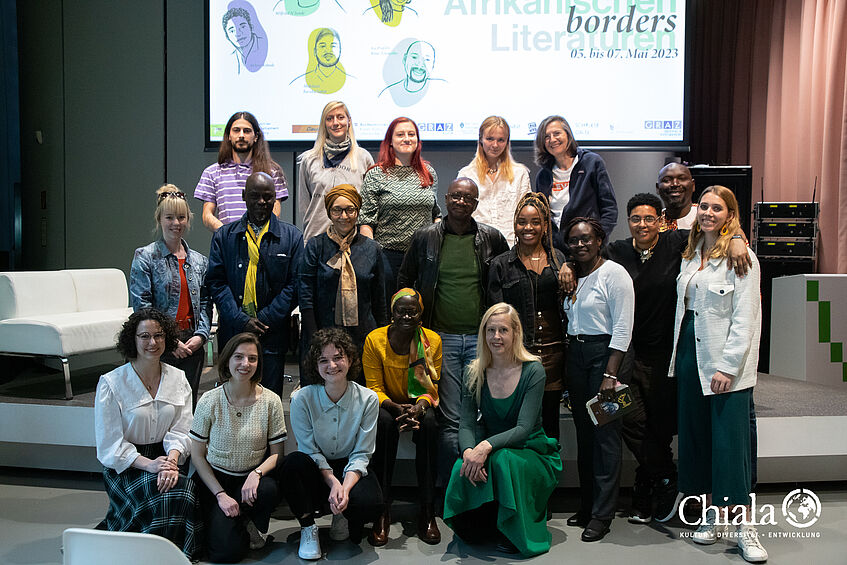
Photo: Chiala
Students meet The Spoken Word Performer Njideka Iroh aka NJ
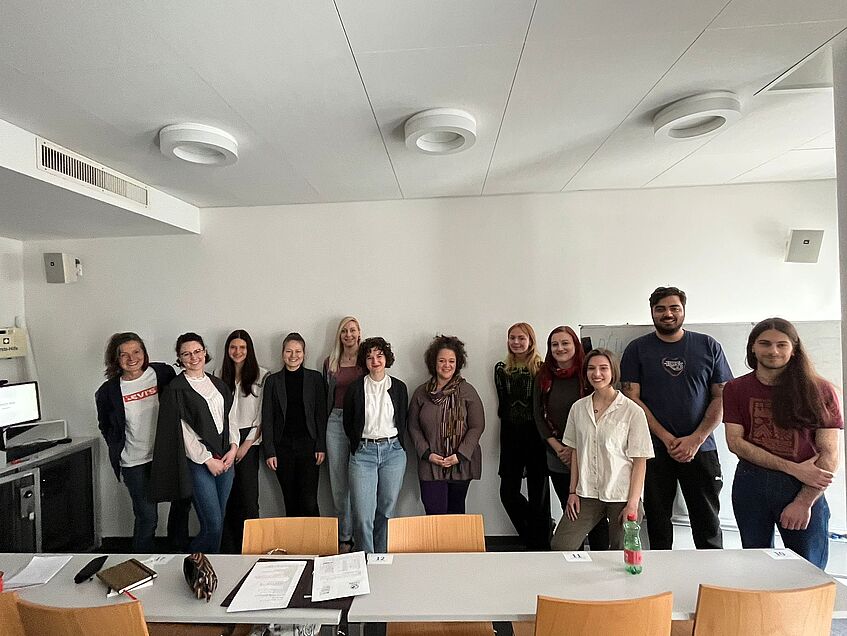
Foto © Njideka Iroh and Group, Mapping ‘African Diasporic’ Literary Voices in the Austrian Cultural Scene
We had the honor to meet the poet Njideka Iroh during a session of our course “Mapping ‘African Diasporic’ Literary Voices in the Austrian Cultural Scene” with Ass-Prof. Dr. Rémi Tchokothe. Njideka, raised in London by a Styrian mother and an Igbo father, moved to Vienna in her teens and continues to live and write here. She describes herself as a spoken word performer, because “the spoken word produces a different text every time. The place, time, audience is different. And of course, the ‘I’ is different.” Eine Momentaufnahme, as we say in German. It was precisely such a Momentaufnahme she shared with us by performing her poem “Speech-Less”. Written in both English and German in 2011, the poem expresses her feeling of being othered by the Viennese population, denying her the ability to speak proper German. “Eine gesamte Gesellschaft hat sich abgesprochen, um mir die deutsche Sprache abzusprechen“, says a line in her poem, in which she eventually claims her right to use German the way it suits her: “Und ich werde Deutsch sprechen, wie es MIR passt. Ich werde mich so artikulieren, ja und einige verlieren, weil es MIR so passt.” The experience of being BIPoC within a white majority society was and still is the starting point of her work. To sum up the topics discussed, Njideka ended the session by reciting her poem ‘A loving kindness’, which deals with multiplicity of languages, languages and cultural heritages, (in)visibility and code-switching. Language is a contested field, which is why self-empowerment is all the more important – or, to use Njideka Iroh’s words: „Das gesprochene Wort ist Ehrlichkeit in einem selbstliebenden Ton.“
Listening Recommendations:
Speech-less // A poem by Njideka - YouTube Retrieved [March 23, 2023]
Njideka Iroh | Transnational Albatrosses 2021 - YouTube Retrieved [March 23, 2023)
Anna Hell & Laura Kisser, March 23, 2023.
Rémi Tchokothe: A plea for an Angelo Soliman Visa for African Arti(vi)sts
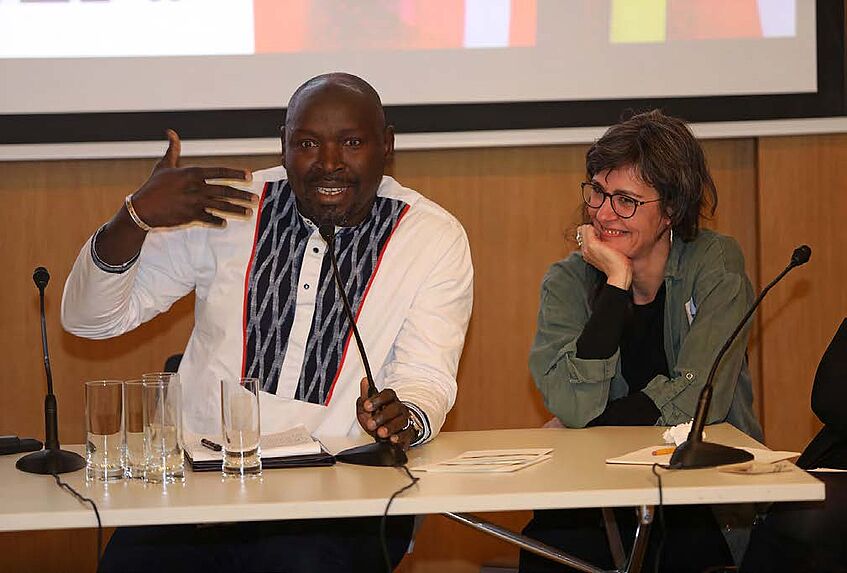
Foto © Tanya Kayhan
The documentation of the UNESCO Talk on 13 December 2022 on "Rethinking cultural policy - Learning from International Experience" with analytical reports by experts from the fields of arts, culture, and science is online. Rémi Tchokothe's paper "A plea for an Angelo Soliman Visa for African Arti(vi)sts" can be found on page 32.
Daniela Waldburger in Dar es Salaam
In February 2023, Daniela Waldburger visited some cooperation partners in Dar es Salaam. On the one hand, her visit led her to Antidius Rweyongeza of the International Office of the University of Dar es Salaam in order to promote further cooperation possibilities between the universities of Dar es Salaam and Vienna. Another visit brought her to BAKITA (Baraza la Kiswahili la Taifa), the National Swahili Council, which is responsible for language standardisation and further development of Swahili.
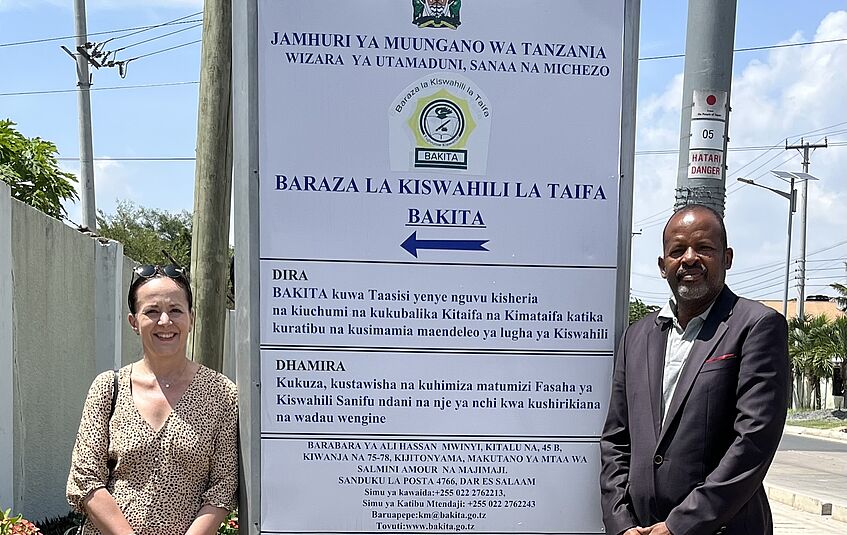
With Moussa Kaoneka (BAKITA)
Foto © Daniela Waldburger, 2023
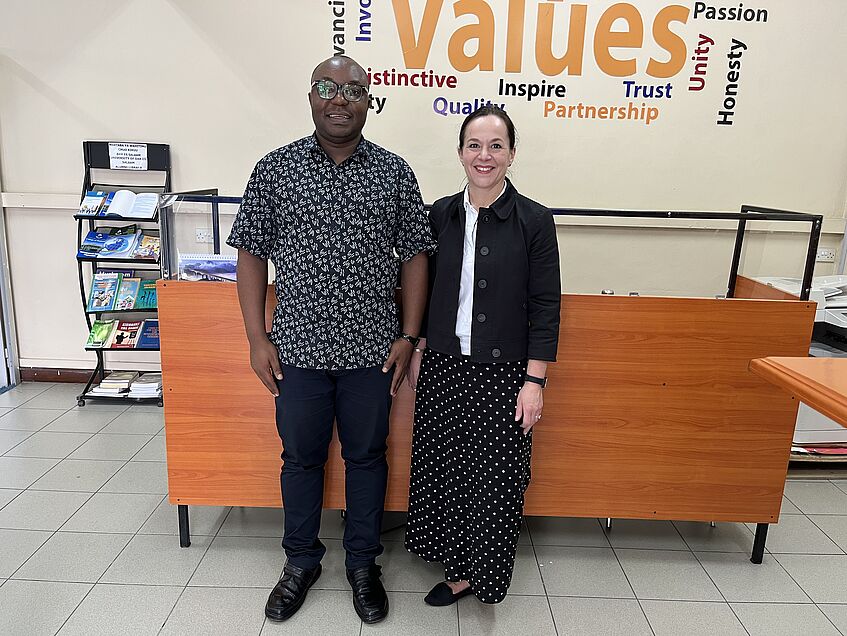
With Antidius Rweyongeza (UDSM)
Foto © Daniela Waldburger, 2023
Kirsten Rüther und Partner*innen: Summer School „Spaces for Future“ in Lusaka
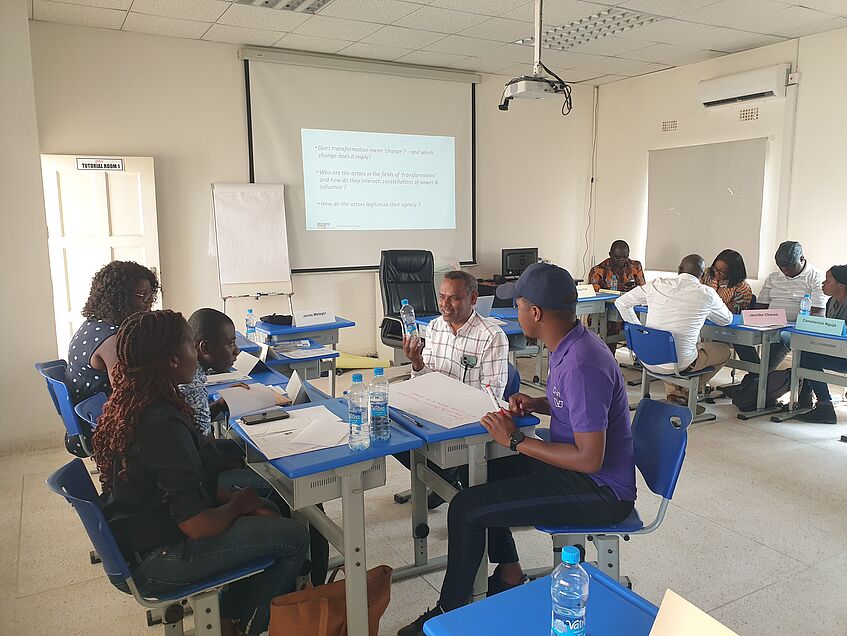
Summer School „Spaces for Future“ an der Unicaf University in Lusaka: Arbeitsgruppen im Austausch
Foto © Jonas Metzger, September 2022
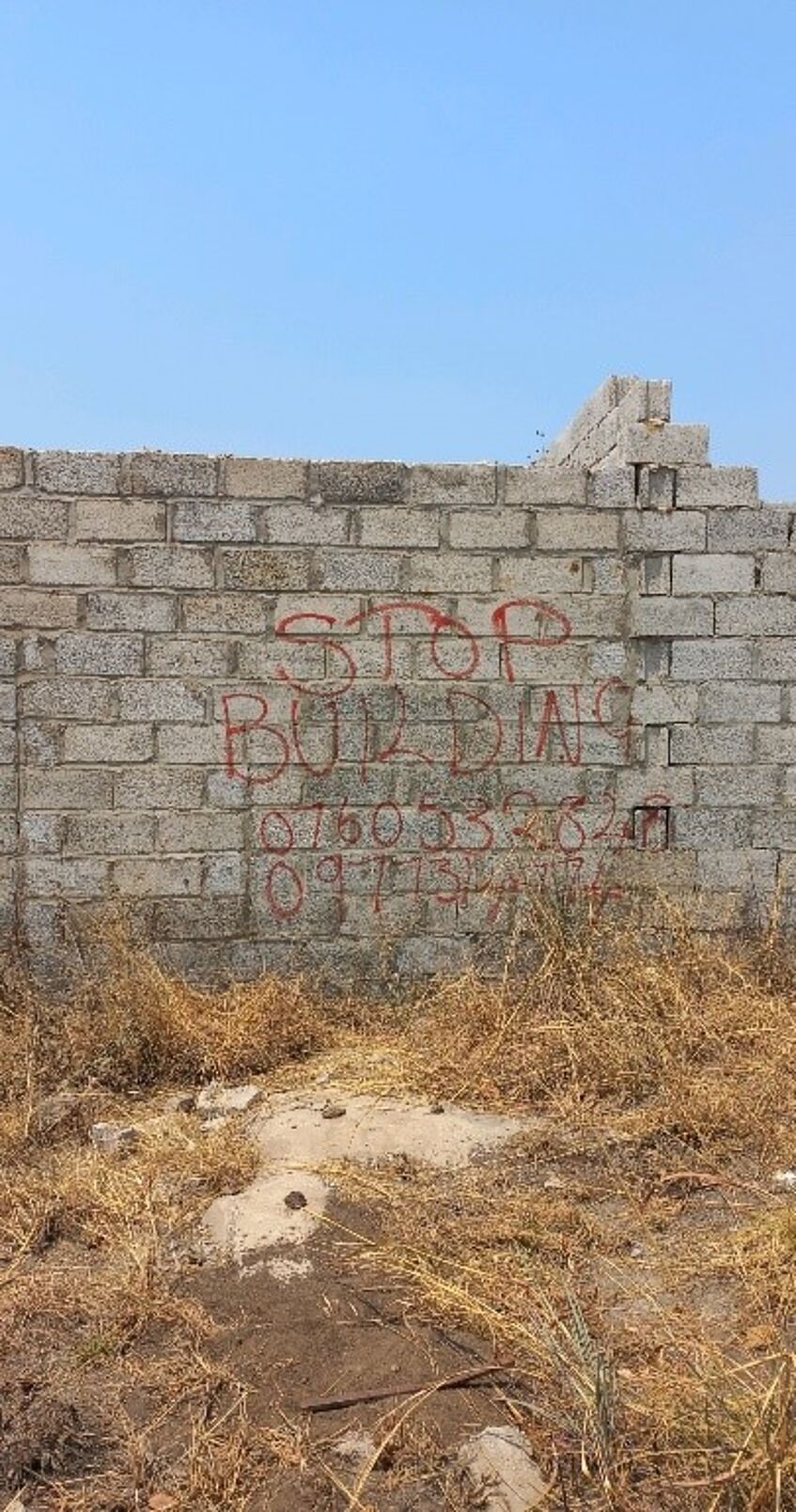
Stop Building: Menschen brauchen Häuser, viele bleiben unvollendet. Hier hat Regenwasser keine Chance zu versickern
Foto © Kirsten Rüther, September 2022
Vom 19. bis 23. September 2022 fand in Lusaka eine mehrfach verschobene Summer School zum Thema „Spaces for Future: Processes of Rural and Urban Transformation in Southern Africa“ statt. Gemeinsam hatte ein Netzwerk von Kolleg*innen (Antje Daniel, Kirsten Rüther, Universität Wien; Lameck Mwewa, Unicaf University Lusaka; Reimer Gronemeyer, Carmen Ludwig, Jonas Metzger, Universität Gießen) das von der Volkswagenstiftung finanzierte Programm entwickelt, mit dem wir 14 Teilnehmer*innen, Doktorand*innen und Post-Doktorand*innen aus Deutschland, Ghana, Namibia, Nigeria, Österreich, Sambia, Simbabwe und Südafrika einladen konnten. Sie berichteten aus ihren Arbeitsprojekten, und ihre Ansätze wurden von zwei „senior academics“, Faisal Garba (University of Cape Town) und Gilbert Siame (Norwegian University of Science and Technology, Trondheim), kommentiert und gerahmt.
Auf einer Exkursion gemeinsam mit Emmanuel Tembo (Ministry of Lands and National Resources), Sulwe Busiku (Zambia Institute of Planners) und einer NGO für ein „land-titling programme“ besuchten wir Wohnbau- und Niederlassungsprojekte in Kabana, Mungule und Garden House, um uns mit Beispielen prekären, illegalen und aus der Stadt ausgreifenden Wohnens und Bauens vertraut zu machen. Mancherorts gelingt es, den Wohnenden ein Recht an Grund und Boden zu erwirken, wenn auch die Versorgung mit Infrastruktur prekär bleibt. Andernorts erfolgt das Bauen auf unsicherem Grund: Weder gibt es für die Menschen ein Anrecht auf das Land noch können sie sich vor widrigen Umwelteinflüssen schützen. Selbstverständlich gibt es auch „gated communities“, die ihrerseits zur veränderten Nutzung von Raum und Land beitragen. Sie alle unterscheiden sich von den kolonialen Strukturen, die zurückgelassen wurden und die im Zentrum der Stadt nach wie vor sichtbar sind.
Die Unicaf University in Lusaka ist Teil eines panafrikanischen Uni-Netzwerkes, der Standort in Lusaka noch recht rezent. Die Summer School war „the first of its kind“ an diesem von Dynamik und Gestaltungswillen geprägten Ort und rief reges Interesse bei allen Kolleg*innen dort hervor. Die Teilnehmenden, Gäste und das kulturelle Rahmenprogramm verwandelten unser ursprünglich konzipiertes Thema auf produktive Weise. Das Ensemble Arts Acres, spezialisiert auf „developing tailored capacity building“, hatte eine Performance zu Landkonflikten vorbereitet, die uns zum Mit-Machen und Mit-Denken aufforderte. Immer wieder unterbrachen sie ihr Stück, übersetzten für uns und ließen uns Szenen antizipieren. Sie machten die „Spaces for Future“ zu einem lebendigen Gegenstand.
Für mich war es der zweite Aufenthalt in Lusaka, diesmal im Anschluss an das offizielle Event mit einem „Ausflug“ ins nur wenige Stunden entfernt liegende Siavonga am Kariba Dam, wohin es über das Wochenende offenbar viele erholungsbedürfte Paare und Familien aus Lusaka zieht. Persönlich war ich mehr als beeindruckt von der intensiven Bautätigkeit, die im öffentlichen Bild der Stadt und entlang der Straßen überall sichtbar wird. Überall finden sich „land agencies“, bei denen Grundstücke gekauft werden können. Werbeplakate für Baustoffe, Baumaschinen und vieles mehr aus China, der Türkei und anderswo säumen die Straßen. Fast überall sieht man Orte des halbfertigen Bauens, angesichts derer sich die Frage aufdrängt, wer hier alles Geld mit Bautätigkeiten auf unsicherem Fundament verdient.
Daniela Waldburger at Centre Universitaire Mayotte
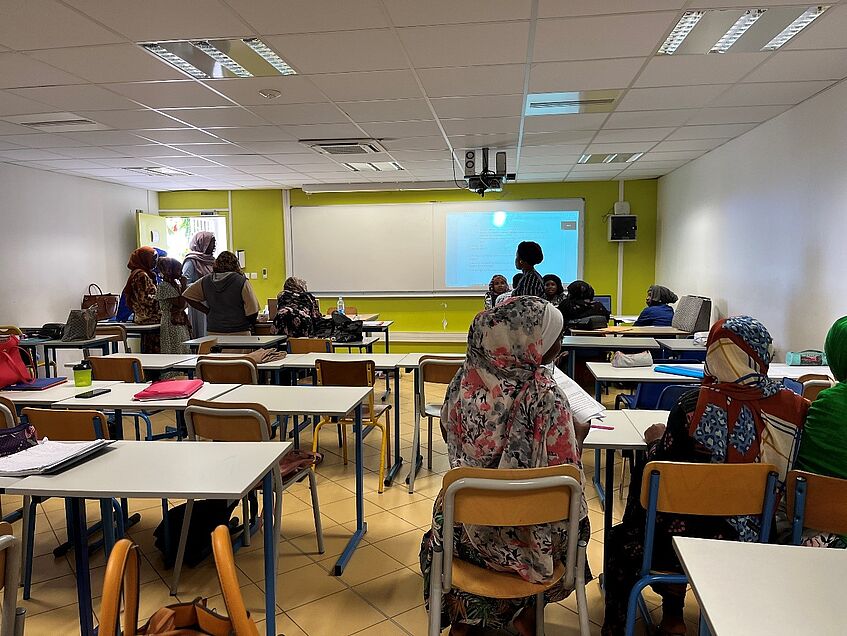
Foto © Daniela Waldburger, September 2022
From 17-27 September 2022, Daniela Waldburger taught an intensive course on general linguistics at the Centre Universitaire Mayotte (French Overseas Department in the Indian Ocean). The 50 or so third-year students of the "licence de Lettres" and Daniela Waldburger worked on some core areas of linguistics (including phonology, morpho-syntax, lexicology, sociolinguistics) using the languages that are of particular relevance to the course participants in their immediate lives.
Anais Angelo bekommt das FWF - Elise Richter Stipendium
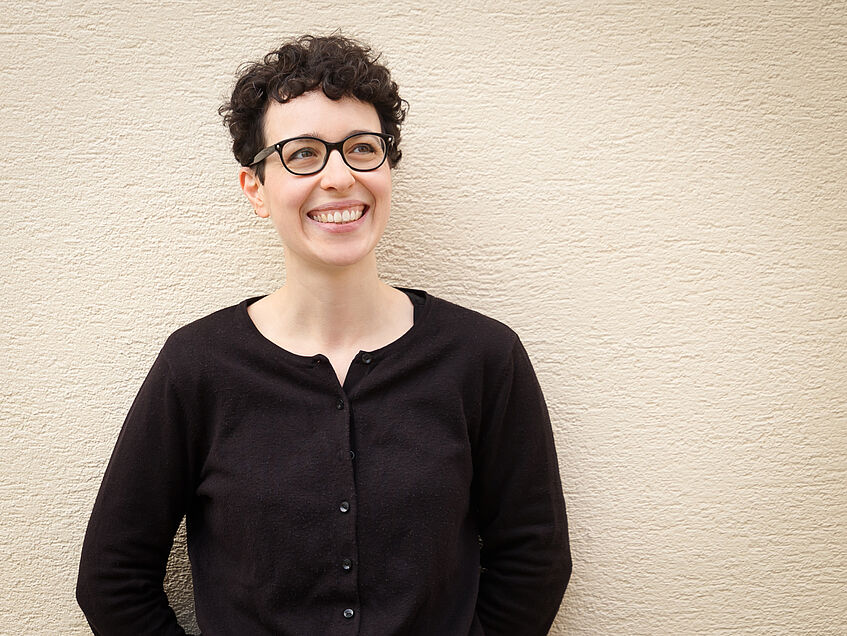
Für ihr Projekt: A history of Kenya’s female parliamentary pionneers
In the last decades, the number of female parliamentarians has tremendously increased in African countries. Nevertheless, national realities vary greatly: Kenya is among the countries which face enduring difficulties to implement gender parity in legislative institutions. Contemporary political, economic, financial, cultural and social barriers hindering women’s representation in parliaments are well researched. But one question remains: what impact has the erasing of women’s politics from national history on the building of a gender-inclusive democracy in Africa/Kenya?
This project seeks to redress the gaps in the current knowledge about Kenyan women’s political history through the lens of parliamentary politics. Despite their contribution to the decolonization struggle as freedom fighters or political activists, Kenyan women have been largely sidelined in Kenyan politics and political history. Yet, preliminary research on Kenyan women’s fight for parliamentary representation in the 1960s and 1970s shows that the few who dared campaigning for a parliamentary seat in a patriarchal political system and society were particularly vocal about their political ideas and ambitions. Who were these women? Why did they campaign and what did they do afterwards? How can we document and write about their political endeavor?
"Kenias Politik ohne koloniale Brille" (Die Presse, 22.6.2022)
Dobrota Pucherova: publication of her book ""Feminism and Modernity in Anglophone African Women’s Writing: A 21st-Century Global Context"
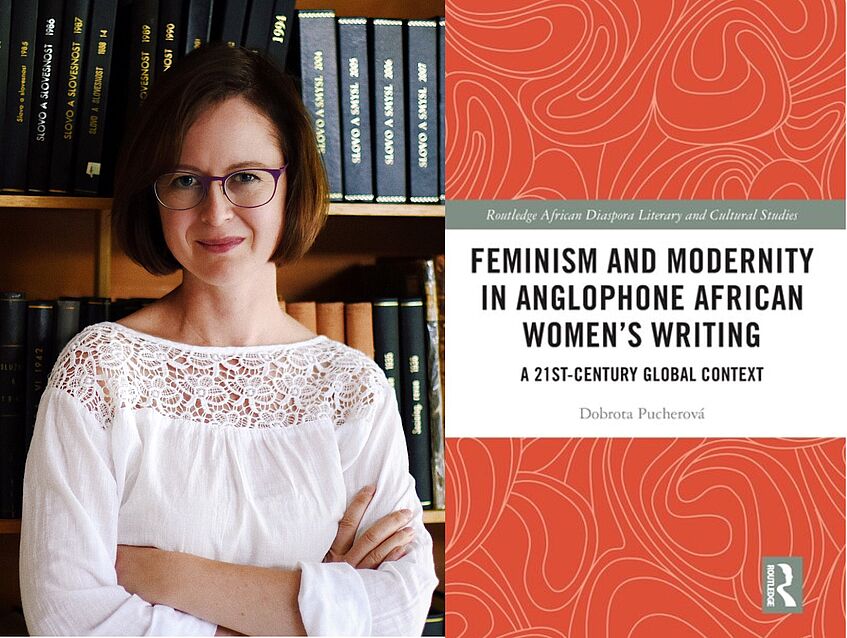
This book re-reads the last 60 years of Anglophone African women’s writing from a transnational and trans-historical feminist perspective, rather than postcolonial, from which these texts have been traditionally interpreted. Such a comparative frame throws into relief patterns across time and space that make it possible to situate this writing as an integral part of women’s literary history. Revisiting this literature in a comparative context with Western women writers since the 18th century, the author highlights how invocations of "tradition" have been used by patriarchy everywhere to subjugate women, the similarities between women’s struggles worldwide, and the feminist imagination it produced. The author argues that in the 21st century, African feminism has undergone a major epistemic shift: from a culturally exclusive to a relational feminism that conceptualizes African femininity through the risky opening of oneself to otherness, transculturation, and translation. Like Western feminists in the 1960s, contemporary African women writers are turning their attention to the female body as the prime site of women’s oppression and freedom, reframing feminism as a demand for universal human rights and actively shaping global discourses on gender, modernity, and democracy.
Dr. Dobrota Pucherová is Senior Reseracher at the Institute of World Literature, Slovak Academy of Sciences in Bratislava and a lecturer in the Department of African Studies and the Department of Comparative Literature at the University of Vienna.
Nicolas Mabillard: Children’s agency and the aesthetics of shame in Dakar
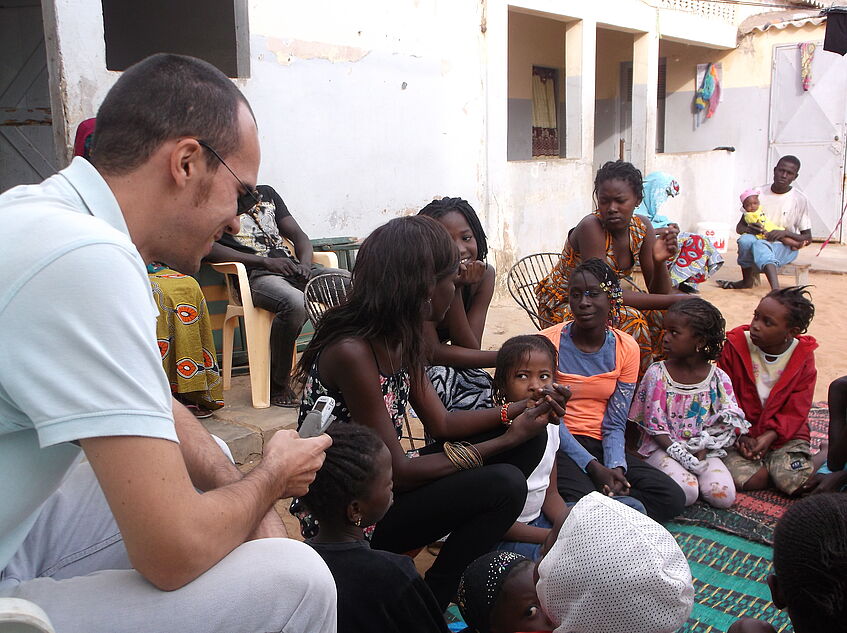
Foto © Nicolas Mabillard, 2016
In June 2022, etnographiques.org published Nicolas' article online.
This article reflects on the uses of qualitative sociological field methods with children undergoing vocational training and living in a underprivileged socio-economic environment in Dakar, Senegal. First, it examines the role of interpreters in the process of conducting qualitative interviews. It explores the three-way indirect communication strategy – children, interpreter, researcher – developed to accommodate the ways in which sensitive issues are spoken about in the local context. Next, the article examines how the researcher positioned himself as an "atypical, less powerful adult" and analyzes the impact of this position on the research. Finally, the paper explores how two dominant Wolof values, kersa (modesty) and sutura (discretion), relate to the wider Senegalese moral economy of shame. Thus, the article also contributes to the debate on the usefulness of the concept of agency in the field of the sociology of childhood and childhood studies in the Senegalese urban context.
Read the whole article in french.
Katharina Gartner: ein Auslandsjahr in Harvard und Accra
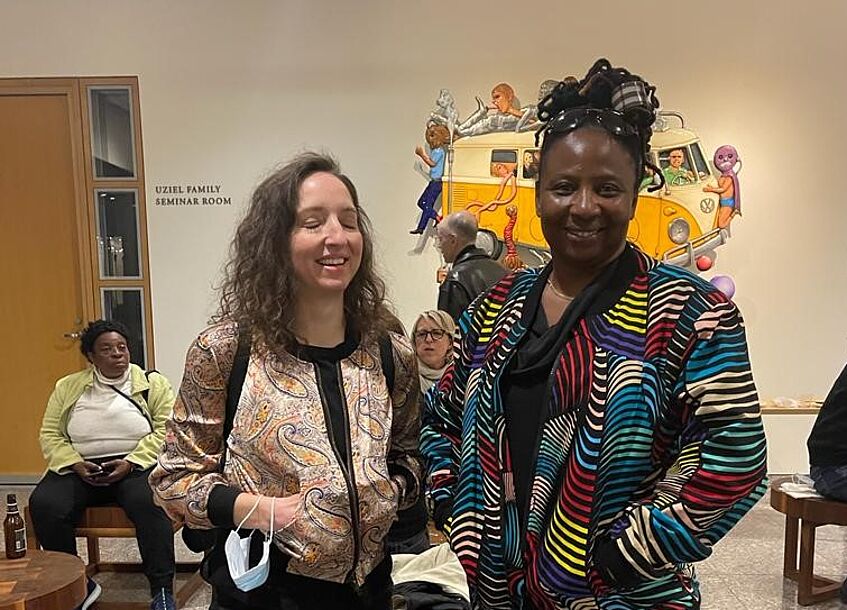
Mit Rosaline Salifu vom Harvard University Center for African Studies (CAS) (April 2022)
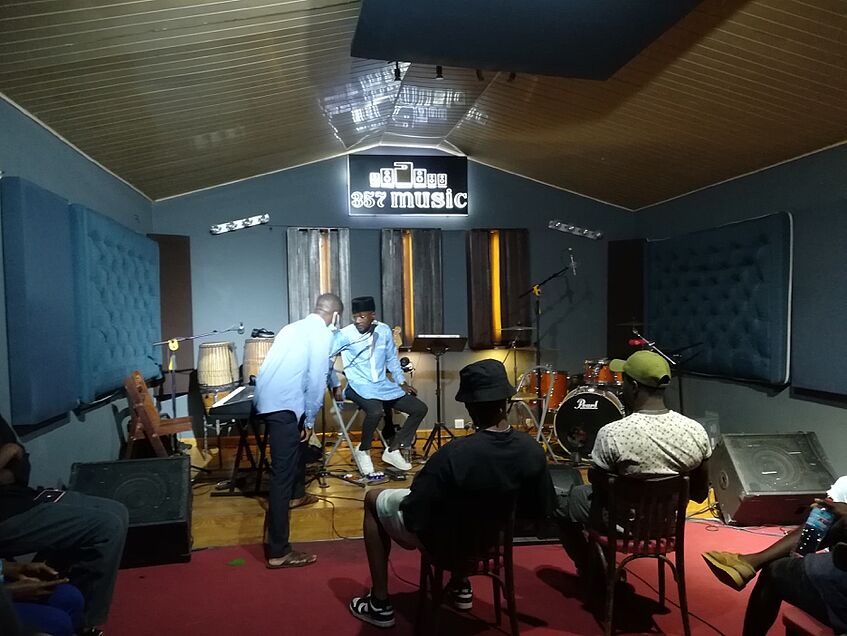
Album-Präsentation von Nee Manste in einem Studio im Norden von Accra (Katharina Gartner, November 2021).
Unsere Lehrbeauftragte Mag. Katharina Gartner, MA, verbrachte das letzte Jahr als Research Fellow in Harvard und Accra – beides im Rahmen ihres IFK_Junior_Abroad Fellowships am Internationalen Forschungszentrum Kulturwissenschaften.
Ich arbeitete das letzte Jahr als Research Fellow in Harvard und Accra – beides im Rahmen meines IFK_Junior_Abroad Fellowships am Internationalen Forschungszentrum Kulturwissenschaften .
Hier vorweg ein paar Eindrücke aus diesem doch recht speziellen Forschungsjahr:
Im Frühling/Sommer 2022 arbeitete ich als Visiting Researcher an der Harvard University, am Department of African and African American Studies (AAAS), eingeladen von Prof. Jean Comaroff. Es war pandemisch bedingt zuerst ein sehr ruhiges Semester mit viel Platz in diesen unglaublich riesigen Bibliotheken (am Foto mein Lieblings-Arbeitsplatz: das Lamont Library Café, an 6 Wochentagen 24h geöffnet, hier menschenleer nach Semesterende – falls das Foto genommen wird, was mich schon freuen würde). Gegen Semesterende gab es dann endlich auch einige Präsenz-Veranstaltungen mit sehr kosmopolitischem Publikum (was eine Idee davon gab, um wieviel besser der Aufenthalt ohne dieser verflixten Pandemie hätte sein können!). Aber auch trotz all der widrigen Umstände war es interessant, diese auch politisch hochinteressante Umbruchszeit am Department of African and African American Studies mitzuerleben. Ich vertiefte in Harvard meine Forschung v.a. im Hinblick auf Globalisierung und bereitete einen Forschungsartikel zur Publikation vor.
Im vorangegangenen WS 2021/22 forschte ich an der University of Ghana, Legon, Accra, angedockt an eine Arbeitsgruppe des Projekts ACIG – Advancing Creative Industries in Ghana, unter der Leitung von Prof. Akosua Darkwah. Da auch hier aufgrund von Covid die Studierendenzahlen durch einen Semester-Staffelplan begrenzt waren, wirkte es am üppig grünen Campus, als hätten die Pflanzen die Übermacht übernommen. Lebhafter ging es in der Stadt zu, wo ich eine Phase der Wieder-Eröffnungen miterlebte – dieses Mal war ich aus dem Pandemie-Krisengebiet Europa nach Ghana als sichere Zone gekommen. So konnte ich ethnographische Updates mit Musiker_innen einholen und Übersetzungen von plurisprachigen Musiktexten unter Mitarbeit von Musiker_innen und einem Filmemacher fertigstellen, die über 11 Sprachen enthielten (worin überraschenderweise immer wieder neue Sprachen auftauchten).
Ich freue mich, die frischen Impulse, die ich aus dem Jahr mitbringe, in meine Lehre im kommenden Semester einzubauen: über verlängerte Jugend und expressive Kulturen am Institut für Afrikawissenschaften und über populäre Musik und Globalisierung am Institut für Musikwissenschaft.
Da ich es gewohnt bin, transdisziplinär zu arbeiten, sind in meinen Lehrveranstaltungen sowohl Studierende der Afrikawissenschaften als auch Interessierte aus anderen Studienrichtungen gerne willkommen. Ich freue mich auf ein persönliches (Wieder-)sehen!
Rémi A. Tchokothe presents his research activities
Rémi A. Tchokothe stellt seine Forschungsarbeit vor und erklärt seine Vorgehensweise. Dabei sind drei Fragen für ihn von besonderer Bedeutung:
1) Warum mache ich die Forschungsarbeit, die ich mache?
2) Wie mache ich meine Arbeit?
3) Was hat die Arbeit, die ich mache, mit der "Lebensrealität" zu tun?
Meet Dobrota Pucherova, lecturer at our department
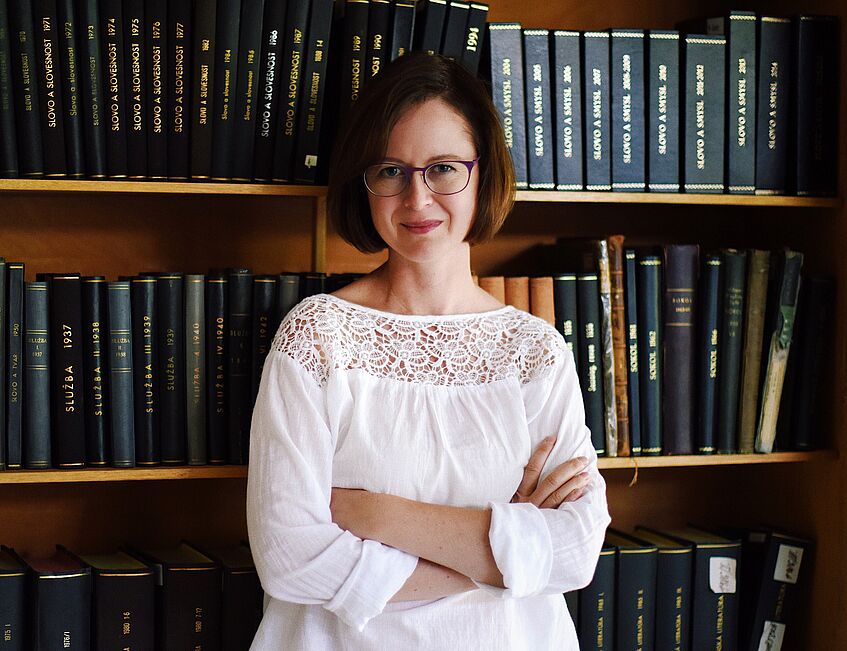
Foto © Tamara Šimončíková Heribanová
Ahoj! My name is Dobrota Pucherová and I have been teaching African Literature here in the department since 2010.
I come from Bratislava, Slovakia, but I have studied in the United States and Great Britain, where I met many African writers such as Ben Okri, Chika Unigwe, J. M. Coetzee, and Yvonne Vera, whose work inspired me to step outside my familiar environment and look at the world from the African perspective. In my M.A. thesis and Ph.D. dissertation on “dissident” writers from southern Africa, I explored African literary approaches to social injustice, collective trauma, national history, and individual memory.
My teaching focuses on Anglophone literature from countries formerly under British domination, such as South Africa, Zimbabwe, Ghana, Nigeria, Uganda, Kenya, Tanzania and Somalia, but I am also interested in authors from other African countries, such as Morocco, who choose to write in English. Many of these writers live in the diaspora in Europe and the United States. My courses set African literatures in dialogue with other literatures in the world while emphasizing African specificities. By this I mean for example the creolisation and hybridity of culture and identity in Africa as expressed in literature on the level of narrative, style, theme, ideas or language.
In my current research, I am looking at 21st-century African women authors – such as Chimamanda Ngozi Adichie, Sefi Atta or Ayaan Hirsi Ali – from a transnational and trans-historical feminist perspective, situating this writing as an integral part of women’s literary history and world literature. Contemporary African women writers have created some of the most influential feminist texts of the present time that speak to audiences across the world, setting the tone of global feminism.
I look forward to discussing with you these and other topics in my lectures!
Meet Anaïs Angelo, post-doc and lecturer at our Department
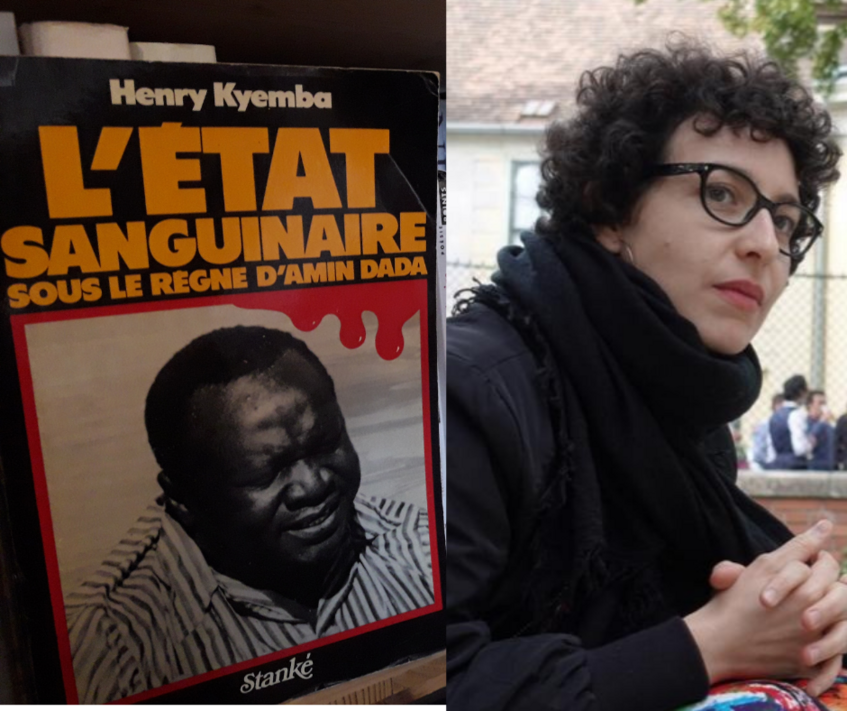
Bonjour! Just as Rolling Stones’ song goes, “Nice to meet you! Let me introduce myself”! My name is Anaïs Angelo and I have been a post-doctoral researcher at the Department of African Studies since 2017. When I was a teenager, I found a biography of the Ugandan dictator Idi Amin Dada that my late grandfather had bought. I was curious, and I read it. It was my first encounter with an “African dictator” and with the field of African politics. I became fascinated with the question of how African presidents come to and stay in power. I studied political science and international relations at Sciences Po Paris (France, where I am from!) and spent one year as an exchange student at the University of Michigan (USA) where I started specializing in African Studies. My interest in African presidential politics resurfaced when I got the opportunity to do my Ph.D. in history at the European University Institute, in the beautiful Italian Tuscany. I spent four years between Florence and Nairobi doing research on Jomo Kenyatta, the first president of independent Kenya, trying to understand how he rose to prominence, accumulated executive powers and shaped Kenyan politics like no one else could. These were four wonderful years in which I learned a lot, met wonderful people, ate lots of pizza, chapati and nyama-choma.
Since I have been working in Vienna, I turned my dissertation into a book, which you can find here, and I embarked on another research project. This time, I explore how Kenyan women demanded more parliamentary rights after independence. Just like for many people, the Covid-19 pandemic halted my fieldwork plans, but I hope to be able to do more archival research and interviews with incredible female warriors soon again.
Meet Kirsten Rüther, Head of the Department of African Studies
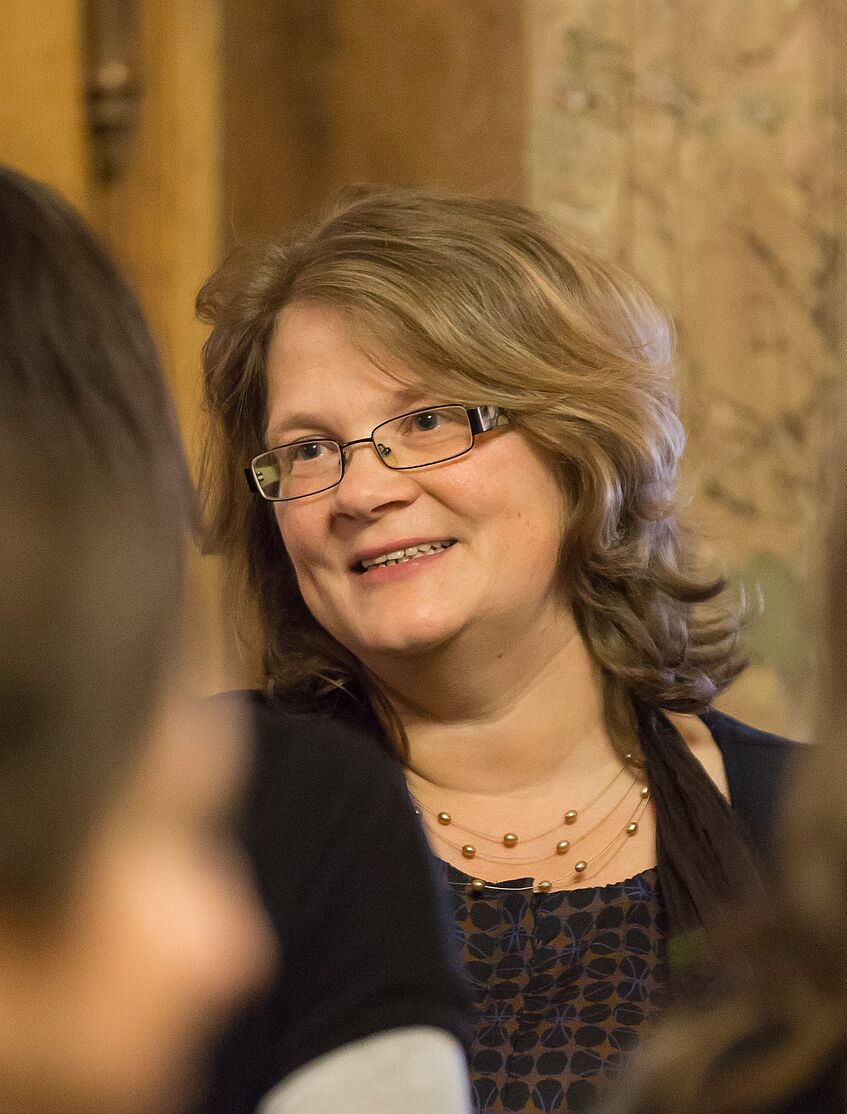
Seit 2012 bin ich als Professorin für Afrikanische Geschichte und Gesellschaften in Wien. Ich liebe die Stadt, ich brenne für die Forschung und genieße die Lehre, weil die Begegnung mit Studierenden immer wieder Überraschungen bereithält und weil es zu meinen schönsten Aufgaben gehört, Pluralität, Diversität, Ambivalenzen und Ambiguitäten afrikanischer Geschichtsverläufe zur Diskussion zu stellen.
Meine empirischen Forschungsfelder sind - regional gesprochen - Südafrika und Sambia. Thematisch habe ich mich lange für die
Geschichte der Christianisierung und kulturellen Übersetzungen interessiert, die im Zuge von Kolonialismus und Eroberung stattfanden.
Ich habe vor einigen Jahren damit begonnen, Städte näher in den Blick zu nehmen. An und in ihnen interessiert mich insbesondere das Wohnen sowie spätkoloniale Wohnungspolitiken. Wer mich kennt, weiß, dass ich ein ausgesprochenes Faible für Lebensgeschichten und Familienbiographie habe - immer in Geschichte und in Gegenwart. Eine meiner laufenden Forschungsarbeiten ist in diesem Feld angesiedelt. Auch sie hält mich in Schwung. Eins ist klar: Ohne den permanenten Zugriff auf diese Themen und mit ihnen verbundenen Forschungsmethoden könnte ich meine Lehrveranstaltungen kaum gestalten.
Forschung betreibt man nicht für sich allein. Für den kollegialen Austausch und eine strukturierte Doktoratsausbildung habe ich vor einigen Jahren das Feld der Mobilitätsforschungs entdeckt. Die Forschungsplattform zu "Mobilen Kulturen und Gesellschaften" sowie das an die Plattform angeschlossene Doktoratsausbildungsprogramm der "Cultural Mobility Studies" bieten mir Gelegenheit, afrikawissenschaftlich wie auch disziplinär und regional darüber hinausgehend mit jungen Wissenschaftler*innen und vielversprechenden Promovierenden den Austausch zu pflegen. Das ist Arbeit, aber mehr noch ein Genuss.
Die Professur in Wien war und ist für mich ein Hauptgewinn!
Table of Contents
- Re-membering Ngũgĩ wa Thiong’o at the Frankfurt Book Fair 2025
- Angelika Heiling: Forschungsaufenthalt in Sambia
- Einblicke in die Afrikawissenschaften: Wege, Perspektiven und Inspirationen für den Studienstart
- Giving Back Trip in Lubumbashi (Demokratische Republik Kongo)
- Summer Conferences 2025
- The organizers of the Rwanda exhibition at the UN in Geneva
- Daniela Waldburger at the University of Dar Es Salaam
- Elisabeth Knittelfelders "Clay Diaries – Three Vases for Tragedy"
- Poetry Slam in April: Liberation, Resistance and Love
- Arno Sonderegger eröffnet die Tullner Vorlesungen
- Book release in open access: Daniela Waldburger's « C’était bien à l’époque mais l’avenir iko sombre » - Negotiating Nostalgia with and among Ex-Mineworkers in Lubumbashi (DRC).
- Gute Nachrichten aus aller Welt und Bibliobox bei den zweiten österreichischen Antirassismustagen
- Book Launch: Laurène Southe's "Child of Congo"
- Retrospektive Ousmane Sembène. Vater des afrinischen Kinos
- Rémi Tchokothe at the University of Sousse, Tunisia
- Visit of a kindergarten group at our department
- Veranstaltungen anlässlich des 70. Jubiläums des Staatsbesuchs von Kaiser Haile Selassie in Österreich im Jahr 1954
- Daniela Waldburger in Kairouan
- Kirsten Rüther at the University Coimbra
- Mohamed MBougar Sarr at the Department of African Studies on a sunday morning
- Kirsten Rüther in the archives of the Lutheran World Federation (Geneva)
- Visiting Lectureship in Mayotte
- VAD Young Scholars Award 2024 for Immanuel Harisch
- International Cooperation at the Rencontres Des Études Africaines en France
- Poetry Slam by the Vienna African Writers Club
- SLAVERY PAST, PRESENT & FUTURE: 8th Global Meeting
- South Africa @ 30 – Looking back and forth
- Meet Alexander Angsongna, post-doc researcher in linguistics at our department
- Visit the Student's Exhibition in Commemoration of the Genocide against the Tutsi in Rwanda (1994)
- Rastafari Reasonings on Africa in Historical Perspective - Webinars
- Daniela Walburger meets our exchange students in Dar es Salaam
- International Exchange: Tchokothe’s Visit at the Université Félix-Houphouët-Boigny d’Abidjan, Côte d’Ivoire
- Earthday Tribute to Ras Baba T
- Reconfiguring African Studies: Rémi Tchokothe’s Giving-Back trip to The Comoros
- Arno Sonderegger: visiting research scholar in Seattle
- Workshop on Translating Micere Githae Mugo’s Poem To be a feminist is into Krio, Luo, Sesotho, and Wolof
- Ausblick
- Dokumentationsstelle Politischer Islam: Round Table Discussion mit Bakary Sambe
- Conference in Naples: OUTBREAKS! Epidemics across African languages and cultures
- Schnittpunkt Afrika 2023
- New book release: Africa and Its Historical and Contemporary Diasporas
- Monograph Prize of the Slovak Academy of Sciences for Dobrota Pucherová
- Book release in Open Access: Rémi Tchokothe's 'Entré en tant que cousin, sorti en tant que gendarme' – Visa Balladur, Kwassa Kwassa, (im)mobilité et géopoét(h)ique relationnelle aux Comores
- Mission(naire) d’Enseignement des « Littératures Africaines » à L’Université de Maurice
- Aspiring “Diversity of Cultural Expressions” in Austria: A Critical meeting of students with experts at the Austrian Commission for UNESCO
- Swahili Forum Special Issue zu Critical Swahili Studies Vol. 30 (2023)
- VAW Poetry Slam / Summer Semester 2023
- Planting “African” Memories in “Austria”: A recollection of the “African Literatures Days” in Graz 2023
- Students meet The Spoken Word Performer Njideka Iroh aka NJ
- Rémi Tchokothe: A plea for an Angelo Soliman Visa for African Arti(vi)sts
- Daniela Waldburger in Dar es Salaam
- Kirsten Rüther und Partner*innen: Summer School „Spaces for Future“ in Lusaka
- Daniela Waldburger at Centre Universitaire Mayotte
- Anais Angelo gets the FWF - Elise Richter grant
- Dobrota Pucherova: publication of her book "Feminism and Modernity in Anglophone African Women’s Writing: A 21st-Century Global Context"
- Nicolas Mabillard: Children’s agency and the aesthetics of shame in Dakar
- Katharina Gartner: ein Auslandsjahr in Harvard und Accra
- Rémi A. Tchokothe: his research
- Meet Dobrota Pucherova, lecturer at our department
- Meet Anaïs Angelo, post-doc and lecturer at the Department of African Studies
- Meet Kirsten Rüther, Head of the Department of African Studies













